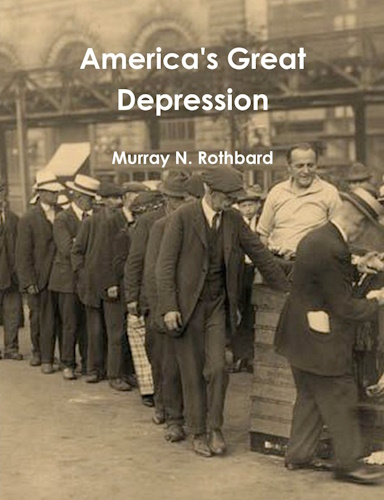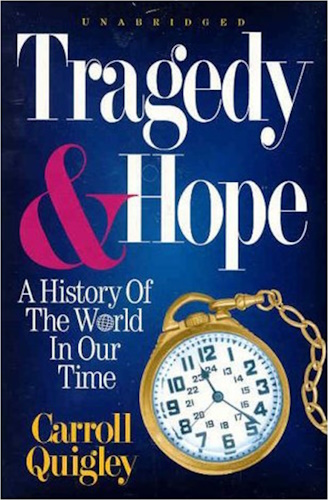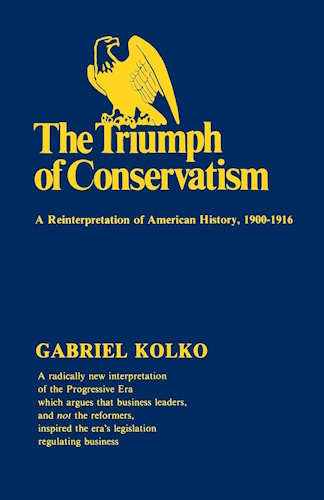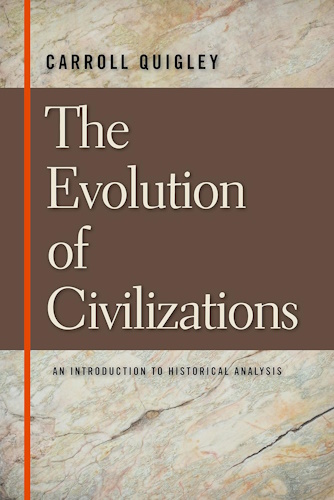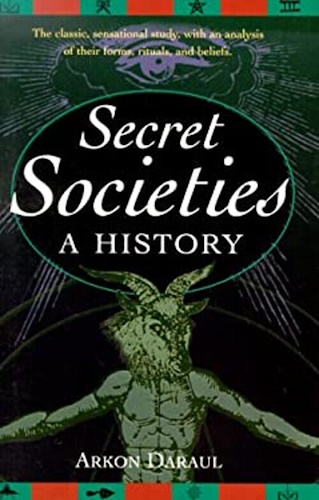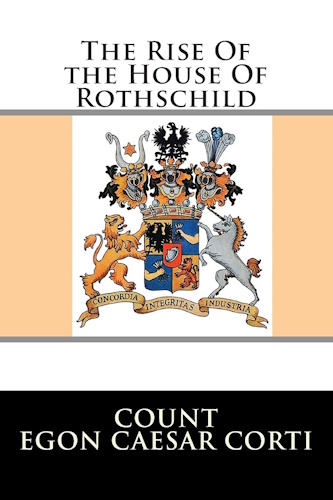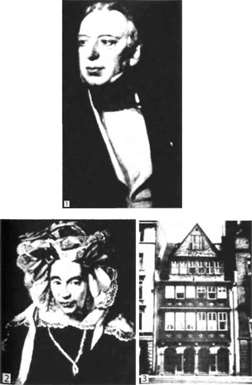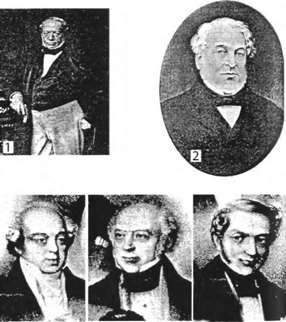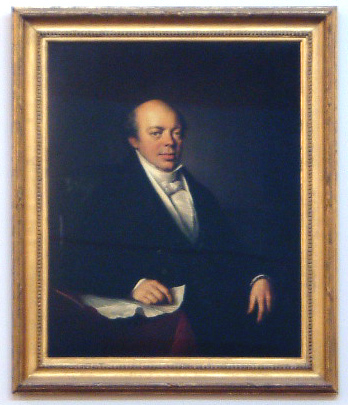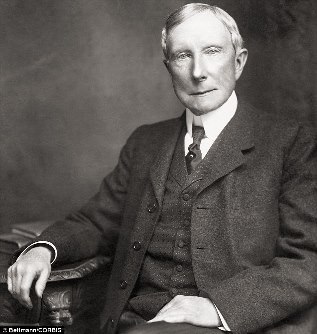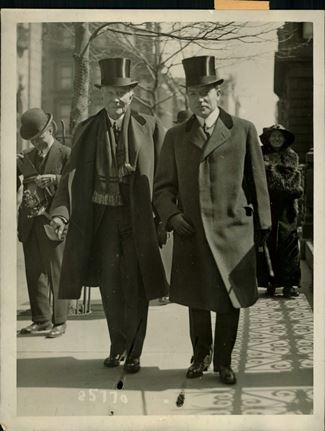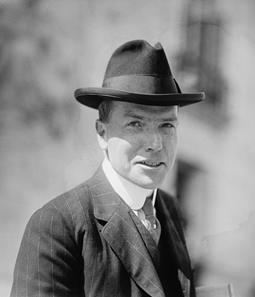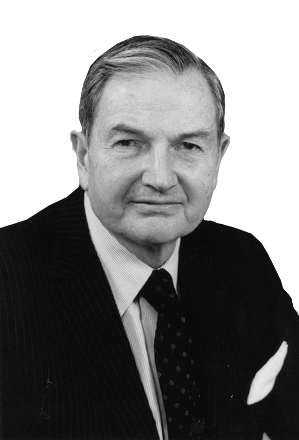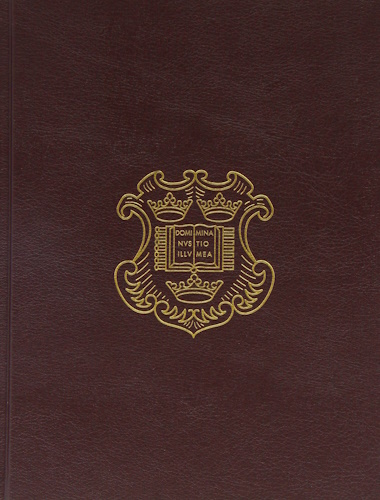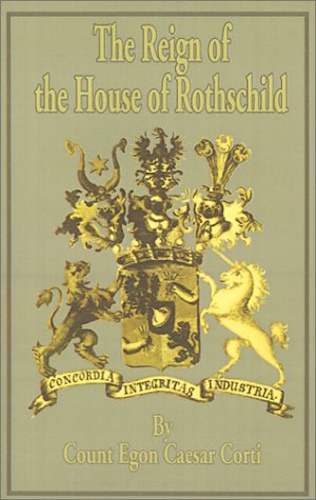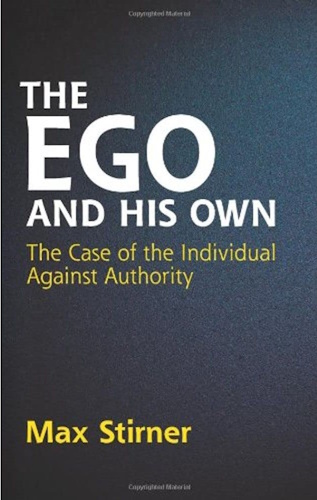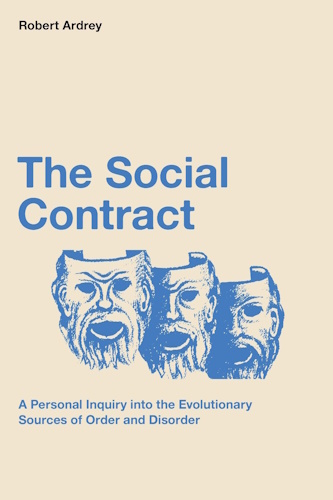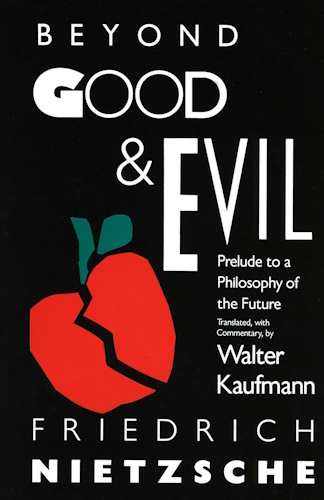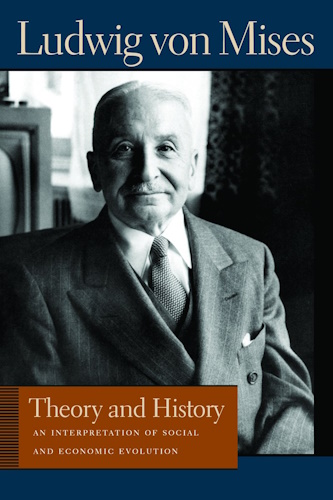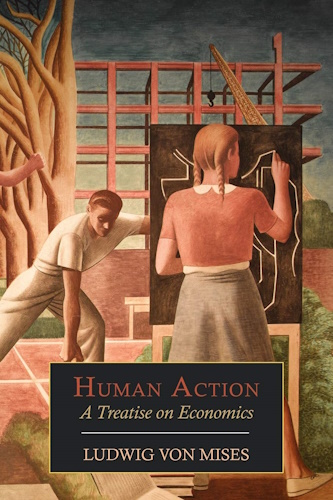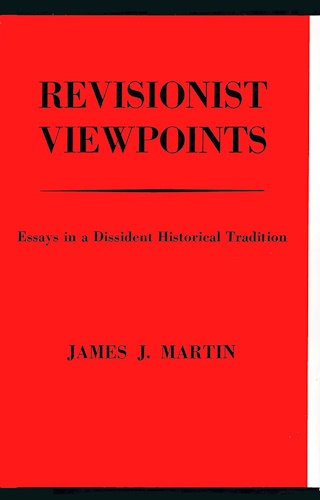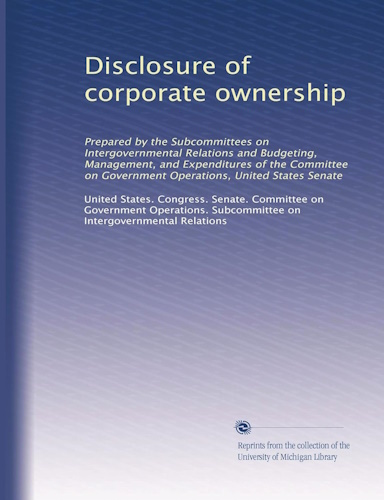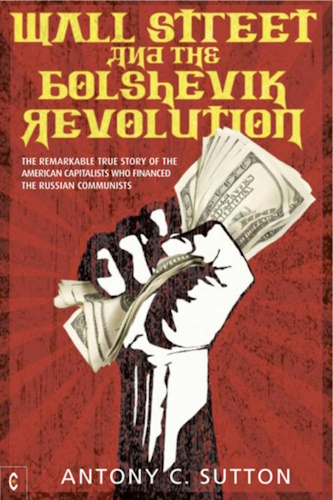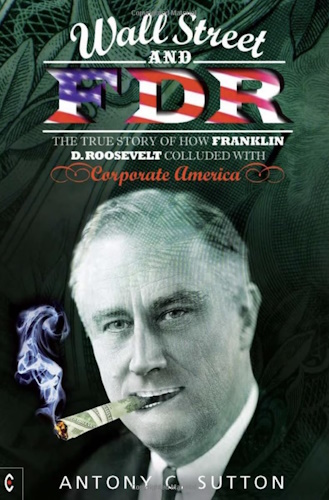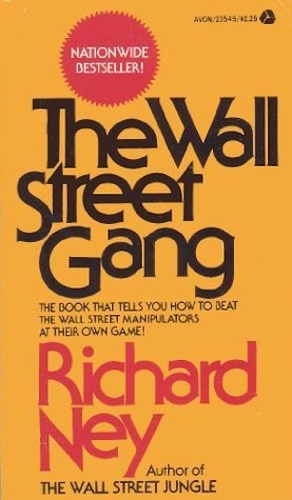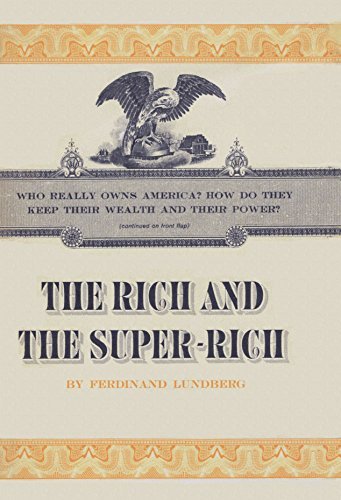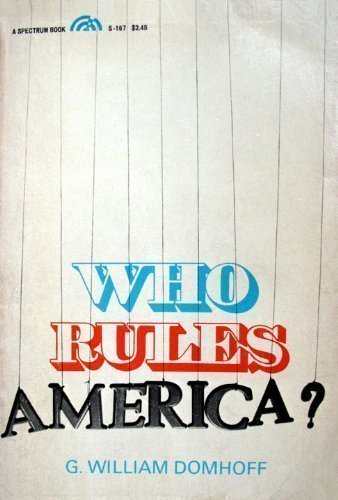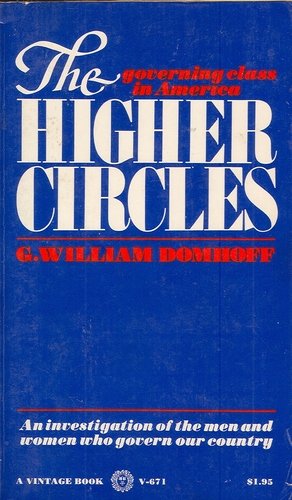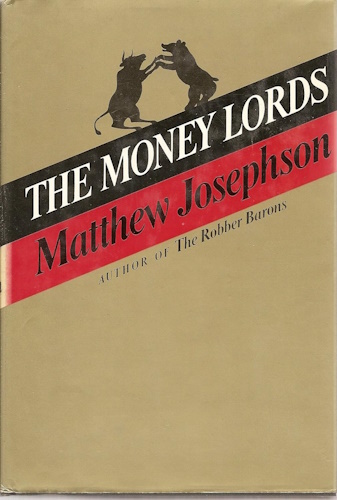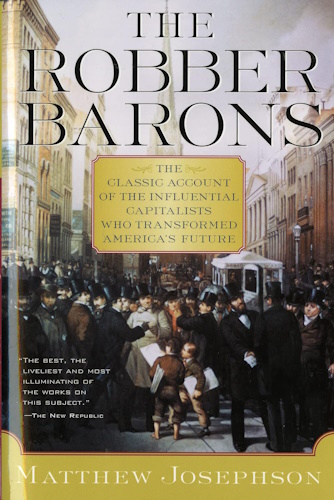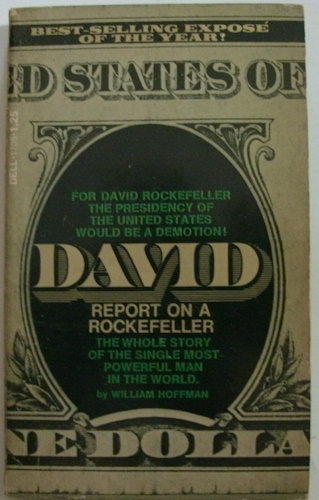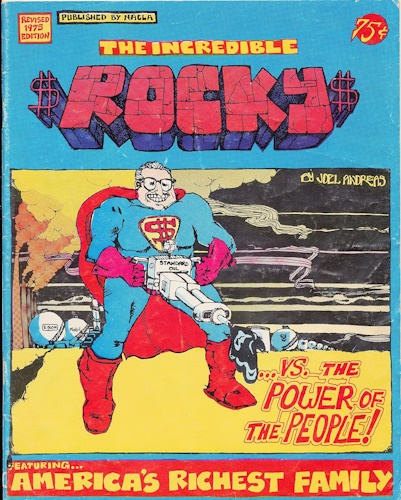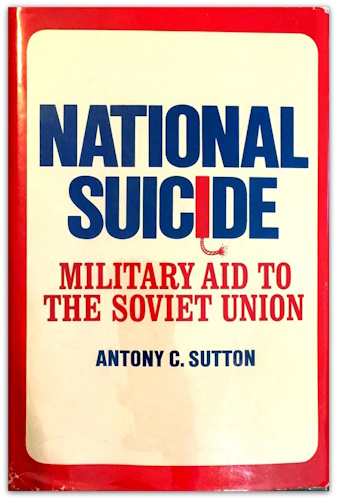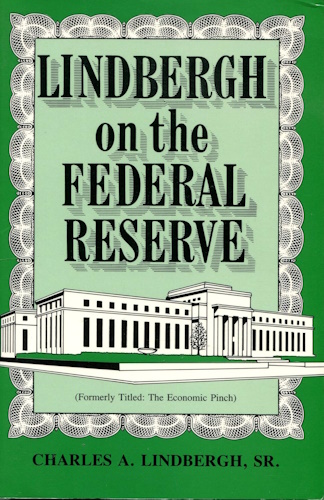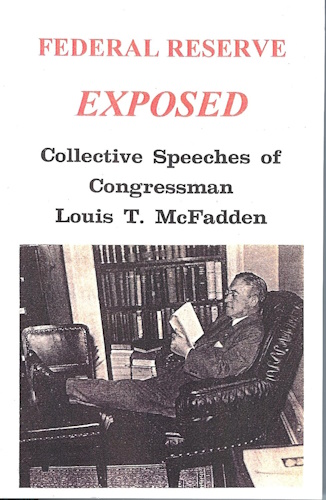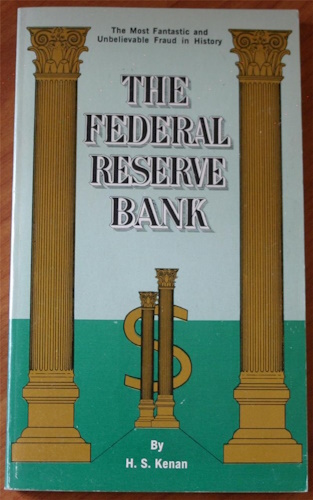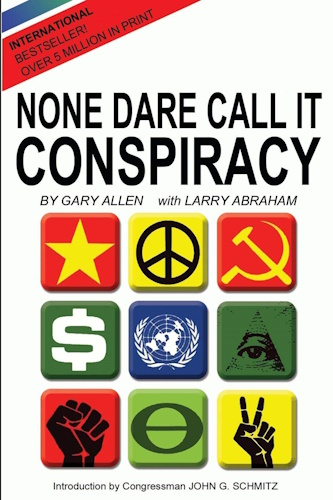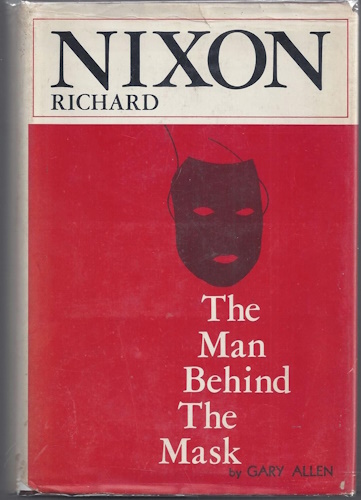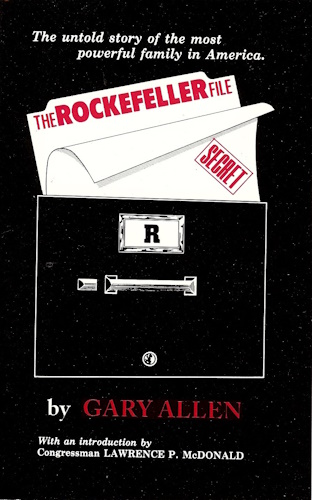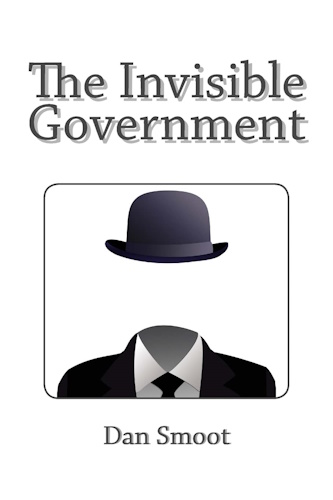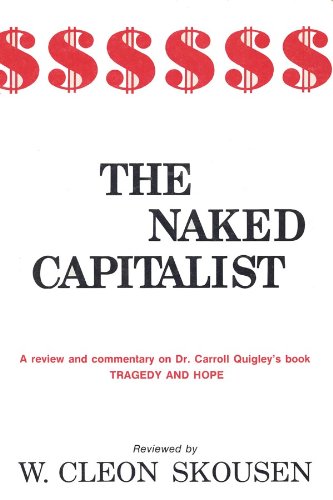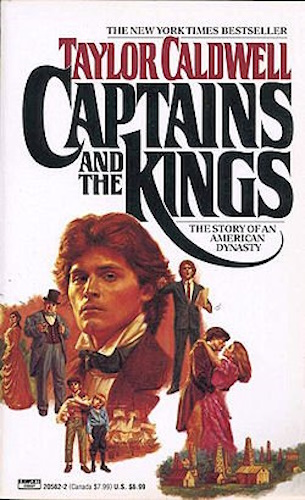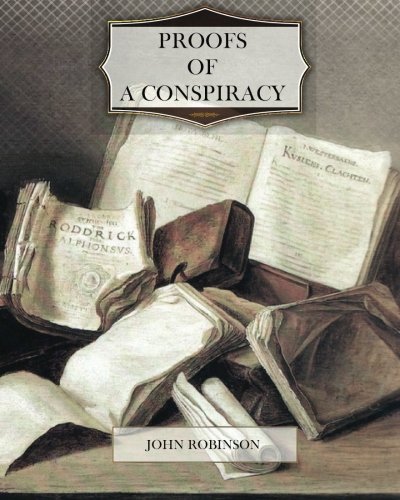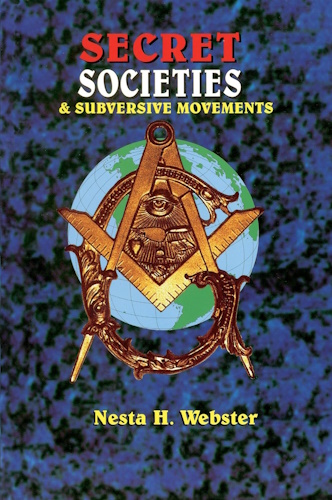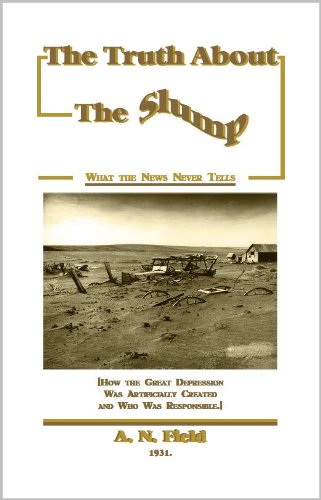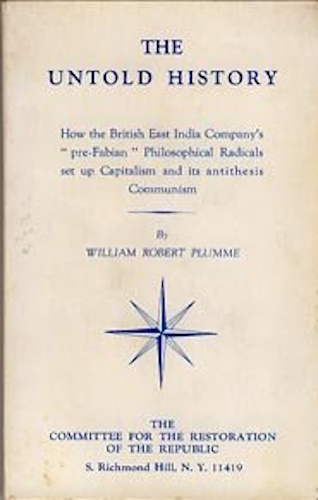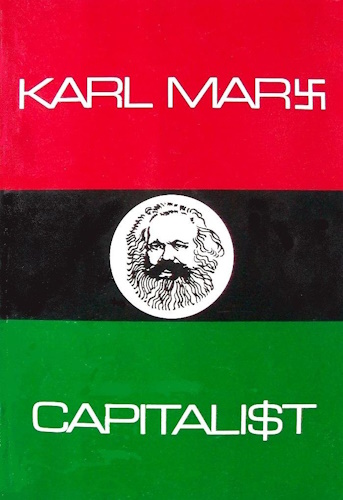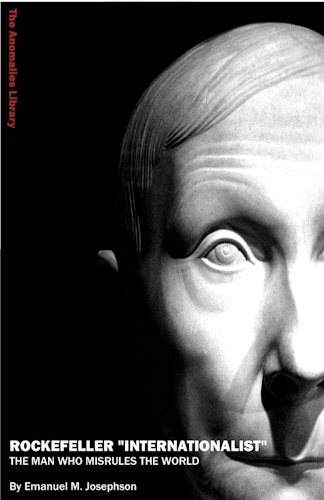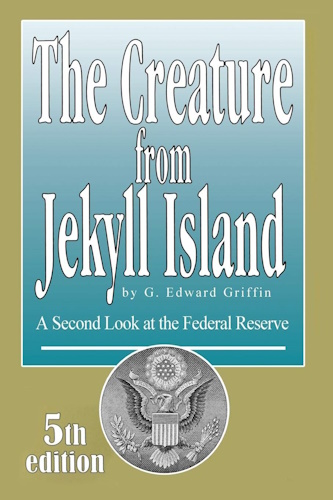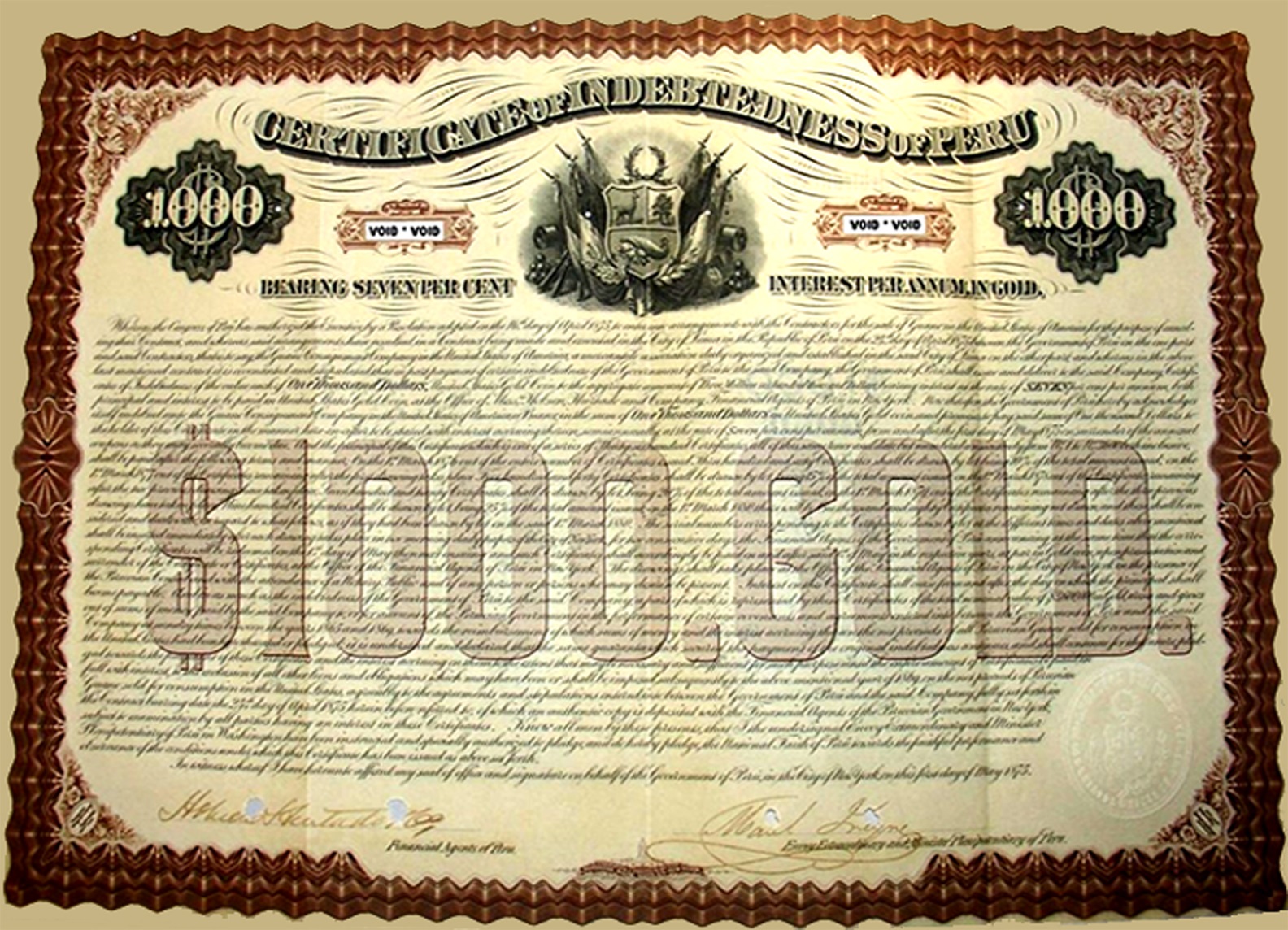![]()
J.P. Morgan Financial Agents U.S. Civil War Gold Peru Bond
by Unwanted Publicity Intelligence
[ UnwantedPublicity@Gmail.com ]
![]()
Could one woman living in the modest Iowa countryside be the outstanding, primary creditor of the United States and all debtor nations, the real and legitimate owner of the 'Gold Bond Key' to the 'Financial Kingdom'? You bet she could!!
Would the privately owned Federal Reserve, who assumed the Gold Bond debt in the Federal Reserve Act, refuse to pay their obligation when a "Call on the U.S. Debt" was made to the BUREAU OF PUBLIC DEBT? You bet they would!!
Did the Federal Reserve then immediately proceed to set up 'front organizations' and fraudulently use that same 'Gold Bond' as their own collateral? You bet they did!!
A note before you begin:
Everybody always asks the same question when they're told a story they just can't believe, "Where's the proof?"
This report by Unwanted Publicity Intelligence is a deliberately extensive and deeply researched document of proof, validating the legitimacy of "the one time only bonus commodity contract 3392 of April 14, 1875 through April 27, 1875 sold by 'Financial Agents of Peru' HOBSON HURTADO & CO. in New York, New York, U.S.A. on May 1, 1875 with supportive sovereign 'CERTIFICATE OF INDEBTEDNESS OF PERU' number 181 without coupons" owned by Vina Kathryn Durham and currently held within the DURHAM HOLDING TRUST of DURHAM INTERNATIONAL LIMITED, Tias 12087 of Ida Grove, Iowa, USA.
The CIA & West Coast Federal Reserve, through the years of compounding and re-compounding the interest on one 7% side of the Contract for Bonus 3392 from May 1, 1875 to May 1, 1990, calculated at the Locked Bullion Price of $420 per fine troy ounce the staggering amount of $206,858,581,465,280,000,000.00 due and payable in "American Gold Dollars, Gold Coin, Gold, Gold Bullion and/or Coin of the Realm."
This well-known event in the banking world threw the West Coast Federal Reserve Bank computers out of whack and they could not reconcile until mid 1997.
After reading this document and assuring yourself that her claim is legitimate, please visit V.K. Durham's site, The AnteChamber.net, for a full accounting of how every participating government, bank, corporation, non-governmental organization, and criminal agency around the globe bit on the poisoned bait which has resulted in the Economic Crisis we are now experiencing.
June 25, 2010 16:01:09 p.m. ( PST ) [ Updated ]
Introduction
After significant periods of time elapse, facts may become distorted albeit via misunderstanding, innuendo, competition, misinformation, or the rumor mill where - if not corrected swiftly and properly - wild fictional accountings may ensue. Hence, it may not be until after a clear understanding of the facts of yore - no matter how controversial – surface, that truth may eventually be properly recognized. Though thorough research and valiant reporting may discover truth, the greater task of keeping 'truth in plain sight' rests with the public.
Wild fictional accountings ( also known as ) "conspiracy theories" - considered 'totally absurd' by most - can lose even the heartiest of adventurer whose initially valued exciting venture may eventually wane when trying to follow a cornucopia of different pathways to fortune typically provided by others whom have a tendency to lead investor prospects 'completely off the map' but only after investment monies are lost to such curious schemes.
For now, well over a decade, sparked controversy – sometimes extremely vehement - surrounds claims over an 1875 ( then-valued ) $1,000 United States gold plus 7% interest certificate within what appears to be a Peru debt bond that is still being pursued by even the 'map-drawers' themselves - and those behind them - whose groups went so far as to draft and sign a complex maze of entity support documents they arranged filed officially in order to bolster their claims even more over this 1875 $1,000 United States gold "Certificate Of Indebtedness Of Peru" bond ( number 181 ) bearing the exclusive Peru government licensee of financial trading merchant house HOBSON, HURTADO & COMPANY ( New York City, New York, USA ) signed as "Financial Agents of Peru" on the lower left-hand side of the financial instrument.
[ NOTE: View large image of this Peru bond U.S. gold certificate click on the Peruvian Bond above and click the X in the bottom right corner. ]
This Peru guano export trading foreign debt certificate has been claimed - since the late 1980s - by a woman named Vina Kathryn Durham who during May 2003 calculated the 1875 ( then-valued ) United States gold plus 7% interest on any Peru guano export bond – if ever payment was defaulted – could be worth ( according to Mrs. V.K. Durham, in 2003 ) about $6,500,000,000,000 (USD) Trillion dollars.
Although it is believed more than one ( 1 ) such Peru bond certificate was issued, this particular 1875 $1,000 United States gold "Certificate Of Indebtedness Of Peru" bearer bond certificate' - referenced within the text body contents of a five ( 5 ) page document set entitled "American Commodity Contract" signed by "V.K. Durham" ( believed "Protector" over the "Durham Holding Trust" ) – is believed claimed by Mrs. Vina K. Durham as "Property Of Durham Holding Trust," a claim that is believed disputed by at least two ( 2 ) other groups touting their own claim over these certificates too.
This 1875 $1,000 U.S. gold coin payable Peru guano export bond topic has netted a huge internet audience curiosity at online websites like The Rumor Mill News and The Ante Chamber where some - not all - documents and information exist for general public audience review plus information updates surrounding belief strategies from Mrs. V.K. Durham ( Okawville, Illinois ) shared with followers and supporters involved in promoting a complex conspiracy theory pointing at the United States government along with others - believed by V.K. Durham and company to be something more than just 'interested parties' whom are private citizens acting undercover as government co-conspirators afoot to stop, divert, or curtail distribution of wealth to be somehow derived out of this 1875 Peru bond calculated by Mrs. V.K. Durham to be worth nearly $6,500,000,000,000 (USD) Trillion dollars that she wants spent on what she considers to be "humanitarian purposes" contrary to what Big Brother is already using the money for.
V.K. Durham is correct in that the United States government also has its own contention about what it already did surrounding U.S. citizens holding foreign bonds that went haywire long ago.
The U.S. Securities Act of 1933, Title II, saw a provision made for the creation of a Corporation Of Foreign Security Holders (aka) FOREIGN BONDHOLDERS PROTECTIVE COUNCIL INC. to be effective when the United States President "finds that its taking effect is in the public interest, and by proclamation so declares." It was contemplated that the activities of the new corporation ( FOREIGN BONDHOLDERS PROTECTIVE COUNCIL INC. ) would be similar to those of the BRITISH CORPORATION OF FOREIGN BONDHOLDERS ( CFB ) that has an official status in negotiating with foreign issuers.
The Securities Act of 1933 states the corporation ( FOREIGN BONDHOLDERS PROTECTIVE COUNCIL INC. ) shall be created "for the purpose of protecting, conserving and advancing the interests of the holders of foreign securities in default, however, President Franklin D. Roosevelt decided it was not in the public interest to set up a corporation, provided that an adequate private organization could be created instead, whereby the U.S. State Department Secretary, U.S. Treasury Department Secretary and U.S. Federal Trade Commission ( FTC ) Chairman requested formation of the FOREIGN BONDHOLDERS PROTECTIVE COUNCIL INC. in 1933 to negotiate with foreign governments on behalf of American holders for defaulted foreign dollar bonds.
The FOREIGN BONDHOLDERS PROTECTIVE COUNCIL INC. was a private non-profit public service organization whose officers, directors, and members served without pay.
The FOREIGN BONDHOLDERS PROTECTIVE COUNCIL INC. did not act as agent nor enter into any kind of agreement with any bondholder.
Is a lot of research really necessary to sort fact from fiction or is all that simply just not worth the time, trouble, and expense to determine who's right and wrong?
To separate fact from fiction surrounding the controversial 1875 ( then-valued ) $1,000 United States gold coins plus 7% interest in-exchange for a Peru guano export bond, decidedly the best place to begin would be looking into its historical legacy during the 19th Century and gather as much factual information from research and analysis as possible to understand what ( if any ) value the 1875 Peru bond may hold after answering the following five ( 5 ) questions:
1. Which, what, and how historical Peru guano export financial trading merchant house consignment contracts, Peru licensed financial agents, consignees, agents, and export – import shipping contracts were involved that served to impact the status of the 1875 $1,000 U.S. gold "Certificate Of Indebtedness Of Peru" bond?
2. Which, what, and how historical financial institutions were selected paymasters for Peru government guano export financial trading merchant houses ( London, England and New York City, New York, USA ), consignees, and agents that served to impact the status of the 1875 $1,000 U.S. gold "Certificate Of Indebtedness Of Peru" bond?
3. Which, what, and how Peru bonds – held by foreign bondholders – became packaged as assets managed in holdings by other domestic and/or foreign companies and/or financial institutions that may have served to impact the status of the 1875 $1,000 U.S. gold "Certificate Of Indebtedness Of Peru" bond?
4. Which, what, and how Peru bonds were traded or exchanged as United States repayment to the BANK OF ENGLAND for its huge construction loan to rebuild the New York City sewer and water system that served to impact the status of the 1875 $1,000 U.S. gold "Certificate Of Indebtedness Of Peru" bond?
5. Which, what, and how the BANK OF ENGLAND loan to the United States was or is still being repaid interest on that legacy loan to rebuild the New York City sewer and water system that served to impact the status of the 1875 $1,000 U.S. gold "Certificate Of Indebtedness Of Peru" bond?
At the top of the Peru guano export market boom, the 'external debt' of Peru did not alarm much of the rest of the international financial world that saw Peru debt being serviced by only highly reputable "international financial trading merchant houses" exclusively licensed by the government of Peru making them "Financial Agents of Peru."
Prominent international financial trading merchant houses conducted a wide variety of contract related business activities "in-house" where that close knit privacy served to keep competitors outside and uninformed as to the extent and scope of each individual business activity serving to support each contract held by a "House" ( "Company" ).
Interestingly, as a House ( "Company" ) may continue holding contracts by serving-up effective privacy blinds to its competitors, another House anti-competitor blind came unexpectedly via print media companies contacted by friends of competitors whom complained about certain Houses ( "Companies" ) monopolizing international free trade and labor contracts.
Running true to course, creatively written news stories began flairing reports that gave House 'activity and work capacity titles' nick-names that confused readers and politicians whom became blurred as to which House ( "Company" ) was doing what, where, when, and to whom.
Nick-naming House 'activity and work capacity titles', during the 19th Century, served making it difficult to ascertain 'what kind of company' - capable of what type of work activity - was actually being mentioned in news articles where one ( 1 ) company ( "House" ) would eventually be read as being six ( 6 ) companies - all which were never named by the print media.
Although many Houses appeared and claimed to be performing a variety of contract services "in-house," the fact is a variety of services were sent to differently named subsidiary companies inside Holding companies never identified to the public.
International financial trading merchant house 'activity and work capacity titles' became generically known as:
- Merchant Houses ( "House of ..." );
- Consignees;
- Private Banks;
- Financial Agents;
- Securities Houses; and,
- Agents.
International financial trading merchant houses, working in their capacity as a 'private bank', may handle payments to various companies involved in contract support costs ( i.e. import-export costs, ships, crews, skippers, schedulers, traders, merchants, brokers, agents, sales, etc.) for each contract.
International financial trading merchant houses, working in their capacity as a 'securities house', may handle company stock issuance, stock trading, stock dealers, stock certificate traders, etc.
In 1875, international financial trading merchant house ( "House" ) company named "HOBSON, HURTADO & CO." ( New York City, New York, USA ) sold its stock certificates promising repayment in "United States Gold coins" in addition to "7% interest" for anyone holding ( bearer ) such certificates ( bonds ) paid for by money, goods, and/or services for such securities.
At the time these U.S. Gold private securities were sold, transaferred, and/or promised, the company ( "House" ) of HOBSON, HURTADO & COMPANY ( New York City, New York, USA ) signed, guaranteeing repayment of these bearer bonds, claiming they were the "Financial Agents of Peru" contracted by the Peru government issuing its 'exclusive Peru export license' naming "guano" ( sea bird dung, used as fertilizer ) as the Peru product for 'export only to the United States of America import market'.
These foreign individual investors became known as "Peru bondholders," and these private company House securities became known as "Peru bonds."
Before HOBSON, HURTADO & COMPANY ( City Of New York, New York, USA ) went out-of business, all of its financial assets and obligations were turned over to another New York City, New York, USA international financial trading merchant house named "MORTON, BLISS & COMPANY."
When MORTON, BLISS & COMPANY was acquired by merger, all of its financial assets and obligations were turned over to its own established private financial institution named "MORTON TRUST COMPANY."
When the MORTON TRUST COMPANY was acquired by merger, all of its assets and obligations were transferred over to and through a series of yet other periodic mergers and acquisitions ( M&As ) with numerous other financial institutions in New York City, New York, USA that eventually became known ( 2004 ) as the J.P. MORGAN CHASE BANK NATIONAL ASSOCIATION ( see brief below )
- -
New York City Bank Historical Brief -
MORGAN GUARANTY TRUST COMPANY OF NEW YORK, in:
13APR1864 established as: New York Guaranty And Indemnity Company;
01DEC1895 name changed to: Guaranty Trust Company of New York;
26JAN1910 acquired by merger: MORTON TRUST COMPANY;
26JAN1910 acquired by merger: Fifth Avenue Trust Company;
16OCT1912 acquired by merger: Standard Trust Company;
04MAY1929 acquired by merger: Bank of Commerce in New York ( APR 1929 - MAY 1929 );
24APR1959 acquired by merger: J. P. Morgan & Company Incorporated ( 1940 - 1959 );
24APR1959 name changed to: MORGAN GUARANTY TRUST COMPANY OF NEW YORK;
26JUN1959 acquired by merger: Morgan et Cie. (aka) Morgan & Cie. Incorporated (aka) Morgan & Company Incorporated;
27DEC1968 acquired by merger: Morgan Guaranty Safe Deposit Company;
01JUN1996 acquired by merger: J. P. Morgan Delaware;
10NOV01 merged by state as: J. P. Morgan Chase Bank;
13NOV04 converted to federal as: J.P. MORGAN CHASE BANK, NATIONAL ASSOCIATION.
- -
Since at least 1873, before the House of HOBSON, HURTADO & COMPANY became "Financial Agents of Peru," 'predecessor' Charles W. Dabney of the international financial trading merchant House of "DABNEY, MORGAN & COMPANY" held exclusive Peru guano export license contracts as "Financial Agents of Peru."
Both the House of HOBSON, HURTADO & COMPANY and the House of DABNEY, MORGAN & COMPANY were 'New York City', United States of America "Financial Agents of Peru" especially selected for exporting "Peru guano" solely to the "United States of America".
Interestingly, the House of HOBSON, HURTADO & COMPANY was acquired by merger into the MORTON TRUST COMPANY that became acquired by merger into the J.P. MORGAN CHASE BANK, NATIONAL ASSOCIATION in 2004.
Even more interestingly, HOBSON, HURTADO & COMPANY predecessor - the House of DABNEY, MORGAN & COMPANY - was also acquired by merger by the J. P. MORGAN COMPANY.
It wasn't until just shortly after the 20th Century when revelations began surfacing about Peru guano export debt "gold certificates" - paid in United States Gold coins" guaranteeing 'exclusive Peru guano exports shipped directly to the United States only, not exported to U.S. foreign market competitors:
- China;
- Spain;
- Brazil;
- France; and,
- Dutch Antilles.
In 1902, authority Dr. Carlos Weisse provided historical behind-the-scene details for an El Tiempo news reporter covering the Franco-Chilean ( France - Chile ) Switzerland Arbitration Tribunal where Swiss federal judges were positioned by foreign Decrees to decide the outcome of Peru's 'external debt' while foreign creditors, bondholders, and more waited to be paid.
[ UPI REPORT NOTE: One of the companies ( mentioned below ) is quite curiously only known as "Compañía consignataria del guano de los Estados Unidos," which when translated into English, simply means "Company consignee of guano for the United States ). "Compañía consignataria del guano de los Estados Unidos," claims its headquarters was in Lima, Peru. "Compañía consignataria del guano de los Estados Unidos," was represented by Winterthur, Switzerland lawyer Dr. Louis Forrer in front of the Switzerland Confederation Franco-Chilean Arbitration Tribunal . Interestingly, Dr. Louis Forrer was twice president of the Switzerland Confederation. It is believed that the true name of this company ( i.e. "Compañía consignataria del guano de los Estados Unidos," ) - purposely masked by authorities and claoked by other private interests - pertains to the aforementioned highly controversial 1875 then-valued $1,000 United States Gold coins certificate signed by HOBSON, HURTADO & COMPANY was acquired by mergers into companies that eventually became ( in 2004 ) the J.P. MORGAN CHASE BANK, NATIONAL ASSOCIATION. ]
From hundreds of legacy information transcript pages, the following pertinent excerpts ( immediately below ) were selected and translated from Spanish into English to provide additional report information continuity:
- -
Circa: 1902
EL TIEMPO
. . . [ EDITED-OUT FOR BREVITY } . . .
" ... MR. REPORTER: - If it looks good to you, Doctor, begin with the claim of the Company's guano consignees of the United States.
DR. CARLOS WEISSE: - Perfectly. The Company ( 'Compañía consignataria del guano de los Estados Unidos' ) is a company established in Lima, Peru and for this reason has the right to claim Peru citizenship, but its ( 'Compañía consignataria del guano de los Estados Unidos' ) shareholders are of different nationalities, part living in Lima, Peru; and, one ( 1 ) in Italy; and, some in Chile. Additionally, the Company ( 'Compañía consignataria del guano de los Estados Unidos' ) has creditors of a Chilean shipping agent, the Don Carlos M. Lamarca heirs residing in Santiago, Chile.
Before the Switzerland Confederation Franco-Chilean Arbitration Tribunal was established in Lausanne, Switzerland during October 1893, Peru representative ( in Berne, Switzerland ) Don Anibal Villegas managed the affairs relating to its ( Switzerland Confederation Franco-Chilean Arbitration Tribunal ) constitution, and appearing before the Swiss Confederation Franco-Chilean Arbitration Tribunal - while still in session - was Attorney General Don Carlos Lamarca saying the Company ( 'Compañía consignataria del guano de los Estados Unidos' ) is to demand payment of its credits, represented by deposit at the BANK OF ENGLAND, in preference of any other creditor of Peru.
Counsel for the Company ( 'Compañía consignataria del guano de los Estados Unidos' ), was the Swiss Confederation eminent statesman, Mr. Forrer [ Louis Forrer ], former head of the Radical party in Swiss chambers of government, who - after a very laborious political life - retired to private life during 1900, consequence of being rejected by the Swiss people in a plebiscite or referendum law that he worked, unanimously approving court chambers, for poor insurance against illness and accidents for the working class.
The position of the Company ( 'Compañía consignataria del guano de los Estados Unidos' ) was therefore very well taken.
The Company ( 'Compañía consignataria del guano de los Estados Unidos' ) was established toward latter 1865, in order to export and sell on consignment guano to the market of that republic ( United States Of America ), and to advance the Peru government a sum of money on the products ( guano ) of such appropriation ( purchase ).
Under 'Article 16' of the contract, the Company ( 'Compañía consignataria del guano de los Estados Unidos' ) should qne guano export, should sell it only in the United States, and the Company ( 'Compañía consignataria del guano de los Estados Unidos' ) agreed to monitor not selling ( guano ) second ( 2nd ) hand and not exporting ( guano ) to other markets ( China, France, Spain, Brazil, and Dutch Antilles ) designated by the Company ( 'Compañía consignataria del guano de los Estados Unidos' ).
The contract underwent some modifications, from the time Peru government dictator Presidente Prado [ formerly, Colonel Manuel Prado ] who declared void any other company contracts held with Presidente Pezet [ former General Pezet ] during the previous Peru constitutional government, until its conclusion.
During the year 1866 - 1869 Peru held other additional contracts to get larger loans from the Company ( 'Compañía consignataria del guano de los Estados Unidos' ), which also undertook to provide necessary funds to service a loan of $10,000,000 American gold dollars that was launched in 1866 from the New York market with joint guarantees of governments Peru and Chile for their cost of war against Spain. The Company ( 'Compañía consignataria del guano de los Estados Unidos' ) operations was carried out regularly until 1875, amongst actual operations was debt service of interest and repayment on that 1866 loan through Mr. [ Charles W. Dabney ] DABNEY, MORGAN AND COMPANY, financial agents of Peru, and later HOBSON, HURTADO AND COMPANY.
In 1870, the Peru government would free the United States market in appropriation assigned to the Company ( 'Compañía consignataria del guano de los Estados Unidos' ), and to that end would be agreed to receive in payment the balance of its checking account, which then amounted to the sum of $3,600,000 dollars in American gold, a receivable called 'gold certificates', and the government obtained permission to hire a third ( 3rd ) party based on the free ( no tax ) sale of guano in the United States.
That combination failed completely.
The Company ( 'Compañía consignataria del guano de los Estados Unidos' ) appearance on books did effectively service interest and amortization of gold contract licenses on the free ( no tax ) sale of guano was terminated and consequently resulted on balance of July 31, 1893 favor of the Company for $7,000,000 American gold dollars.
This $7,000,000 million dollar balance was liquidated before the Swiss Confederation Franco-Chilean Arbitration Tribunal [ Court of Auditors ] - per Mr. Morales Pegobier - during the constitutional Peru Generals [ Peru General Cáceres and Peru General Bermúdez ] period of time when the Company's [ 'Compañía consignataria del guano de los Estados Unidos' ] new representative, Mr. Forrer [ Louis Forrer of Winterthur, Switzerland ], introduced ( December 30, 1896 ) the Company's [ 'Compañía consignataria del guano de los Estados Unidos' ] claim before the Swiss Confederation Franco-Chilean Arbitration Tribunal without having been made or charged anything for its untimeliness, since as I said at the outset, it even appeared before the final constitution of the Swiss [ Switzerland ] Confederation Franco-Chilean Arbitration Tribunal. ... "
- Carlos Weisse ( July 19, 1902 )
. . . [ EDITED-OUT FOR BREVITY } . . .
- -
In 1902, Dr. Carlos Weisse ( above ) mentioned the international financial trading merchant House of DABNEY, MORGAN & COMPANY ( predecessor of the international financial trading merchant House of HOBSON, HURTADO & COMPANY, "Financial Agents of Peru" ) and Charles W. Dabney ( above ) who was the partner of Junius Spencer Morgan whose J.S. MORGAN & COMPANY was acquired by merger with his son's ( John Pierpont Morgan's ) House of J. P. MORGAN & COMPANY that became the MORGAN GUARANTY TRUST ( bank of J. P. MORGAN COMPANY ), that eventually became ( in 2004 ) the J.P. MORGAN CHASE BANK, NATIONAL ASSOCIATION ( see brief chronology, immediately below, and further above ):
- -
J. P. Morgan & J. S. Morgan Company History Chronology -
John Pierpont Morgan (aka) J.P. Morgan I ( DOB: April 17 , 1837 - DOD: March 31 , 1913 ) was a New York City, America banker and international financier who - at the turn of the 20th Century ( 1901 ) - was one of the wealthiest men in America;
1857 - 1861, J.P. Morgan worked for Duncan, Sherman & Company;
1860 - 1864, J.P. Morgan was a New York City agent and attorney for George Peabody & Company ( London, England );
1864 - J. P. Morgan's father Junius Spencer Morgan ( DOB: 1813 - DOD: 1890 ) was a partner, of George Peabody, in George Peabody & Company ( London, England ) that became J.S. MORGAN & COMPANY ( London, England );
1864 - When his father ( Junius Spender Morgan ) renamed George Peabody & Company ( London, England ) as J.S. MORGAN & COMPANY ( London, England ), his son ( J.P. Morgan ) lead J.S. MORGAN & COMPANY ( London, England );
1864 - 1871 - J.P. Morgan was a New York City partner, of Charles W. Dabney, in DABNEY, MORGAN & COMPANY;
1869 - 1899 - J. P. MORGAN & COMPANY, merged other banking houses into it, and reorganized many 'railroad companies';
1871 - J.P. Morgan became partner in Drexel, Morgan & Company ( Philadelphia, PA, USA );
1893 - J.P. Morgan became senior partner of Drexel, Morgan & Company ( Philadelphia, PA, USA );
1895 - J. P. MORGAN & COMPANY supplied $62,000,000 million dollars worth of 'gold bullion' supporting U.S. government bonds issued to restore up to $100,000,000 million dollars in fallen gold reserves of the U.S. Treasury;
1895 - J. P. MORGAN & COMPANY became the successor entity, of:
- Drexel, Morgan & Company,
- Drexel & Company ( Philadelphia, PA, USA ),
- Morgan, Harjes & Company ( Paris, France ),
- Drexel, Harjes & Company,
- Morgan, Grenfell & Company ( London, England ), and
- J.S. MORGAN & COMPANY ( London, England ), before 1910;
1902 - J. P. MORGAN & COMPANY purchased numerous England 'ships' ( the Leyland of the Atlantic steamship line ), 'shipping lines', and 'ship companies', eventually became the INTERNATIONAL MERCANTILE MARINE COMPANY, and owned White Star Line - builder and operator - of the ship RMS Titanic;
1912 - U.S. House Of Representatives, Banking and Currency Committee, Subcommittee - led by Mr. Pujo ( known as the "Pujo Committee" ) - found J. P. MORGAN & COMPANY aggregate resources totaled $22,245,000,000 (USD) Billion dollars;
1933 - U.S. Act of Glass and Steagall (aka) 1933 Glass-Steagall Act anti-trust forced the international financial trading and merchant House of Morgan to become separate entities:
1. J. P. MORGAN & COMPANY,
2. MORGAN GUARANTY TRUST ( bank of the J. P. MORGAN COMPANY ),
3. Morgan Stanley ( investment firm ), and
4. Morgan, Grenfell & Company ( international securities firm ).
J.P. MORGAN & COMPANY, the world's first ( 1st ) billion dollar corporation, accomplishments were numerous.
- -
So how does the J. P. MORGAN COMPANY or J. S. MORGAN & COMPANY relate to an 1873 Peru guano export contract and 1875 then-valued $1,000 in "United States Gold coins" bearer bond stock certificate?
In 1862, J.P. Morgan's father ( Junius S. Morgan ) came across a Civil War gold deal involving $2,000,000 million of then-valued "United States Gold coins" and "gold bars" that he and another investor shipped fifty per cent ( 50% ) of - then-valued $1,000,000 worth - to England, an act that created a serious 'gold shortage' in the United States, causing the price of gold to skyrocket, at which point then Junius S. Morgan brought his gold back to the United States where he consequently made a huge profit from his having earlier created an even greater gold shortage in the United States.
Now, what did the controversial 1875 HOBSON, HURTADO & COMPANY bearer bond certificate text read? The certificate specifically states bondholder redemption - of then-valued & $1,000 plus 7% interest - will be in "United States Gold coins!" Is there a connection?
International historical research notes ( further above ) surrounding the Junius Spencer Morgan and John Pierpont Morgan chronology, states:
"1864 - 1871 - J.P. Morgan was a New York City partner, of Charles W. Dabney, in DABNEY, MORGAN & COMPANY;" and,
1869 - 1899 - J. P. MORGAN & COMPANY, merged other banking houses into it, and reorganized many 'railroad companies'."
What ( if any ) "railroad companies" relate to the 1875 then-valued $1,000 plus 7% interest "United States Gold coins" bearer bond certificates for Peru guano exports?
Well, let's begin with the HOBSON, HURTADO & COMPANY ( New York, NY, USA ) agent named THE PERUVIAN CORPORATION LIMITED.
Looking at a very brief area within the official Switzerland Confederation Franco-Chilean Arbitration Tribunal record, we see that THE PERUVIAN CORPORATION LIMITED was in-fact the agent of HOBSON, HURTADO & COMPANY, and appears that THE PERUVIAN CORPORATION LIMITED was mitigating legal claims - on behalf of HOBSON, HURTADO & COMPANY bearer bondholders certificates - before the SWITZERLAND CONFEDERATION FRANCO-CHILEAN ARBITRATION TRIBUNAL during the latter 19th Century and very early 20th Century ( See Official Swiss Federal Court Of Auditors Transcript Excerpts Below )
[ UPI REPORT NOTE: The following pertinent excerpts were translated from French into English, and does not represent all information. ]
- -
SWITZERLAND CONFEDERATION FRANCO-CHILEAN ARBITRATION TRIBUNAL
Reports Of International Arbitral Award Digest Of Sentences Arbitration ( Vol. XV, pp. 77-387 )
20 JAN 1896
10 NOV 1896
20 OCT 1900
08 JAN 1901
05 JUL 1901
CASE OF GUANO ( Chile, France )
. . . [ EDITED-OUT FOR BREVITY ] . . .
1. Until 1869, the Government of Peru operated guano preferably through consignees of which were assigned to separate export departments. The contract of deposits of guano to the United States passed through the ZARACONDEGUI COMPANY and was to end with January 1, 1866, the Government of Peru received, then a system of tendering, tendered BANCO LA PROVIDENCIA, a joint stock company in Lima [ Peru ], and a group of Traders acting on behalf of a company to be. The bidders included calls other guarantees for the repayment of their advances and expenses, that all the guano that Peru will have in the islands or the mainland was specially mortgaged the Company co-signer.
By Decree of October 2, 1865 the Government accepted in various
proposed amendments which were made. The main points settled by the Decree are:
1. Mr. Domingo Porras, in his capacity as general manager and representative of BANCO LA PROVIDENCIA, and his personal name, D. Francisco Bryce, D. Rocas Pratolongo, D. Costa Hermanos, D. Jorge Wallace, D. Pedro Marcone, and Errequeta And Hendebert associated with this effect will be loaded from January 1, 1866 and for 4-years from date of deposit guano that could consume or be consumed during the specified time, the United States of North America and dependencies.
"2. The Houses mentioned above, related to execution this contract, form a company that has the character and will be called:
In French: "Compagnie cosignataire du guano aux Etats Unis de l'Amérique du Nord;" or,
In Spanish: "La cooperación de la empresa-firmante de guano en los Estados Unidos de Norte América;" or,
In English: "The co-signer of the guano company in the United States of North America."
Under the character of that Society [ Company, namely: "The co-signer of the guano company in the United States of North America" ], it is subject to the laws which regulate and guarantee, Peru, contracts and their strict enforcement, it being understood that neither the Company [ "The co-signer of the guano company in the United States of North America" ] nor any Houses that form from the association mentioned above, can recourse if their rights are actually or apparently faulted by Judges and Tribunals of the Republic.
"3. The Company [ namely: "The co-signer of the guano company in the United States of North America" ], undertakes to provide to the public within 60-days from the signing of this Agreement, a thousand [ 1,000 ] shares of the value of one thousand dollars [ $1,000 ] each.
Shareholders will be entitled to benefits and reimbursement of their capital in the same proportions and within the Houses and the people who constitute the Company [ namely: "The co-signer of the guano company in the United States of North America" ], but they will not interfere in the proceedings of this Society, as for recording and it is understood that the headquarters of the Company in Lima [ Peru ].
'16. The guano that is exported under this Agreement will sell only the United States and we will, in agreement with the Government, areas most suitable for consumption, the price will be the most high as possible and will be fixed in agreement with the Government. The Company [ namely: "The co-signer of the guano company in the United States of North America" ] ensure that the article [ guano ] does not traffic in second hand, it not be cheated or falsified and it is not exported to other locations as designated by the consignment.
'20. The Company [ namely: "The co-signer of the guano company in the United States of North America" ] and its employees are subject to all orders and all instructions that the Government will send it relatively costs, the price of guano, the amount that will be exported, and other operations of the business.
'25. In the unlikely event, for any reason, the sale of guano in the United States would not benefit the state, because the price of sale does not suit it, after paying expenses and fresh extraction of guano could be suspended and the Government would be obliged to reimburse the Company [ namely: "The co-signer of the guano company in the United States of North America" ] advances of all kinds it would have made, with interest thereon, and to this end, mortgage today the national pension, and, most especially, quantity of guano necessary that the Company [ namely: "The co-signer of the guano company in the United States of North America" ] would extract.
"26. Neither the Company [ namely: "The co-signer of the guano company in the United States of North America" ] nor its agents will not pledge, or mortgage guano is dependent, or open credit on it, and therefore, the Government will not recognize such commitments, charges, credits or mortgages, as it always reserves the ownership of that guano.
"29. The Company [ namely: "The co-signer of the guano company in the United States of North America" ] agrees to provide the Government an advance on liquid products of the deposit of two million dollars [ $2,000,000 ) per month due to two hundred thousand dollars [ $200,000 ], and it will pay the amount on the first [ 1st ] of the month, the same day that this Agreement be signed.
'32. While the Company [ namely: "The co-signer of the guano company in the United States of North America" ] will not be refunded in full its advances and their interests, the Government will collect only on liquid two [ 2 ] pounds per ton of guano that will sell.
"33. As security for the sums that the Company [ namely: "The co-signer of the guano company in the United States of North America" ] advance now or it could move forward in the future and interests stipulated, the Government specifically mortgage in favor of all the guano that exports bound for the United States and, more particularly:
1. Amount needed to cover the value of its liquid products as are specified, advances and their respective interests, it is understood that, for the aforesaid guarantee, the Company [ namely: "The co-signer of the guano company in the United States of North America" ] will extract only the need for guano consumption a year [ annually ], which will be replaced as and when it has been sold and, to be included in the calculation will be done in this indeed guano deposit, that will be started and one that will be loaded.
Similarly, the Government grants to the Company [ namely: "The co-signer of the guano company in the United States of North America" ], as it will not reimburse the amount of its advances and cover their corresponding interests, the right to continue to enjoy recording in question.2"
On October 7, 1865 in the contract was registered by the notary C. J. Suarez, and signed by the following persons on behalf of the Company [ namely: "The co-signer of the guano company in the United States of North America" ]:
"Mssrs.:
Dominigo Porras, manager of BANCO LA PROVIDENCIA bank [ Peru ],
Costa Hermanos,
D. Rocco Pratolongo,
D. Pedro Marcone,
D. George Wallace,
D. Francisco Bryce,
D. Dominigo Porras,
Errequeta And Hendebert,
[ Whereby ] the [ aforementioned ], were by the nationality of their birthplace / born:
First [ 1st ]: Peru / Peruvian,
Second [ 2nd ] Italy / Italian,
Third [ 3rd ] Italy / Italian,
Fourth [ 4th ] ( not listed in the Swiss Confederation Arbitration Tribunal ),
Fifth [ 5th ] England / English,
Sixth [ 6th ] England / English,
France / French, and others, Traders this place. . ." ( Attorney General Carlos Lamarca, Memoire, Ann. 15. Corp. Doc. No. 146, p. 349. )
2. The Company [ namely: "The co-signer of the guano company in the United States of North America" ] provided for in Article 2 by Decree on October 2, 1865 was formed, notarized by October 17, 1865 and October 19, 1865 under the right:
2. The Company provided for in Article 2 of Decree of October 2, 1865 was formed notarized by the October 17, 1865 and October 19, 1865 under the right:
In French: "Compagnie consignataire du guano pour les Etats-Unis de l'Amérique du Nord,"
In Spanish: "Compania consignataria del guano en Los Estados Unidos de America,"
In English: "Company guano consignees in the United States of America,"
with headquarters in Lima [ Peru ].
[ UPI REPORT NOTE: Interestingly, the Switzerland Confederation Arbitration Tribunal transcript 'name spellings' - provided for this same company - goes beyond just 'word language translations', when the same company name spellings are again but ever so slightly changed yet again. See e.g., company name spelling ( immediately above ) versus ( further above ). For the remainder of this ( UPI ) report, the in-question company name ( referred to, immediately above ) will - from now on - be referred to, as: "Company guano consignees in the United States of America," unless otherwise noted in this UPI report.]
3. The war broke out between Spain - on the one hand - and Peru, Chile, Ecuador and Bolivia on the other hand.
The governments of Peru and Chile came together to jointly contract a loan of ten million [ $10,000,000 ] American gold. The interest was stipulated at 7%, capital refundable shift to maturities between July 1, 1871 and July 1, 1874. Emission of a partial amount of two million dollars [ $2,000,000 ] in bonds of $1,000 and $500, was undertaken.
- -
Superscript note(s):
1. The Company's [ "Company guano consignees in the United States of America" ] agent [ THE PERUVIAN CORPORATION LIMITED ] offers the following translation, "...and any precise amount to cover the value of its liquid products as specified advances and their respective interests."
2. The Company's [ namely, "Company guano consignees in the United States of America" ] agent [ namely, "PERUVIAN CORPORATION LIMITED" ] has said, " ... special law ... New York July 30, 1866. Sales rose to $1,535,000 dollars.
- -
The general obligation debt, reproduced on the right, wearing among other provisions:
"CLAUSE 7. In addition, the public faith, commitment by the Republics of Peru and Chile, and the general mortgage of all national revenues for safety and service that debt, the Government of Peru mortgage specifically to ensure repayment of interest and amortissement, 500,000 tons of Peruvian guano of the Chincha Islands and provides each holder of the warrants, or his legal representative, the right to take possession guano above in sufficient quantity and at that price 25 dollars in gold per ton..." ( Consignee [ namely, "Company guano consignees in the United States of America" ]. Memoire I, Ann. 9, p. 43, Ann. 10, p. 47. Corp.. Doc, No. 78, p. 149. )
4. At the end of the first ( 1st ) coupon interest on the loan, the Company [ namely, "Company guano consignees in the United States of America" ] assumed the obligation to pay the amount, and to cope with subsequent deadlines, its advances on this account to bear interest at 10%.
5. In 1869, the Company [ namely, "Company guano consignees in the United States of America" ] demanded that the Government compensation injury it had sustained by the fact that, unlike provisions of Article 27 of its contract, the agents [ THE PERUVIAN CORPORATION LIMITED ] had not not delivered the guano deposits existing in December 31, 1865 and the fact that the State, in violation of the contract of October 7, 1865 had treated [ contracted ] with a third [ 3rd ] party to sell 20,000 tons of guano in the United States.
Satisfaction was given to the Company [ namely, "Company guano consignees in the United States of America" ] on these two [ 2 ] points by an Agreement reached April 20, 1869 in the form of a Decree rendered on that date, recorded November 5, 1869 of that year, which states that:
"The co-signer of the guano company in the United States has the right to export and sell, in compensation of twenty thousand [ 20,000 ] tons of guano imported into this market by "MOORE," and those which it has been private, unlike the agreements made in the contract recording … And who are all in the amount of thirty thousand [ 30,000 ] tons of guano, an amount equal to the latter to be regarded as additional those who sell during the contract. - Take this Order as completion of the above agreement and deposit the same conditions as it." ( Attorney General Carlos Lamarca, Memoire, Ann. 16, p. 11-12. )
6. On December 1, 1869 the Company sent the co-signer Government of Peru the following proposals:
"1. The Company [ namely, "Co-signer of the guano company in the United States" ] deposit of guano in the United States undertakes to pay the tax credit, as an advance on the net proceeds of guano, the sale of which is dependent, the sum of two million [ 2,000,000 ] soles in the following form:
"Soles 800,000 in up to 30-days after approval of this Convention.
"Soles 1,200,000 in monthly assessments and successive soles 200,000
each.
"2. The Company [ namely, "Co-signer of the guano company in the United States" ] will reimburse the sums it has paid according to the previous article and interests, applying therefor, but no profit on foreign exchange, trading or commission, the amount necessary of the net accounts guano later sold to United States, less prior to a premium of 4% on that net proceeds that the Company [ namely, "Co-signer of the guano company in the United States" ] will charge in future accounts sales reported to the Government.
"The amounts paid by the Company [ namely, "Co-signer of the guano company in the United States" ] under this Agreement it will produce a 5% interest per annum and the same rate of interest Government will be acquired on the net proceeds of guano sold fortnight [ in 2-weeks ] to fortnight [ in 2 weeks ], after deducting the premium for the benefit of the Company [ namely, "Co-signer of the guano company in the United States" ] as stated in the previous article.
"4. The Government grants and warrants to the Company [ namely, "Co-signer of the guano company in the United States" ] possession and the continuation of the exclusive right to export guano and sell it to the United States of America until the amount of 200,000 tons register. It stipulated and agreed that the duration of the contract recording the Company [ namely, "Co-signer of the guano company in the United States" ] celebrated with the Government for export of guano and sales in the United States remains determined and committed to the time that is necessary and enough to export and sell in that Country [ United States of America ] the amount of 200,000 tonnes indicated, is changed in these terms what had been ruled by the Decrees of December 16, 1865 and April 20 on the duration of the Contract deposit.
These proposals were greeted with some modifications by the Decree below dated December 16, 1869:
" ... supply that is home to a co-signatory states of guano - States of North America - taking into consideration that because of several orders of arrest on charter prevented the Company's agent selling any quantity of guano that during the period of its contract would have realized - that this decrease in sale reduced profits on which the Company [ namely, "Co-signer of the guano company in the United States" ] could reasonably starting when it signed its recording contract - it is just this loss of profits - the only way to provide compensation due without prejudice to the State [ Peru ], is give it the right it will sell a fixed quantity of tons in this way replacing the time it wants to the expiration of its contract soil until the end of the year 1871 - in over the dealership last April to sell after this term 30,000 tons register - considering also that the said Company [ namely, "Co-signer of the guano company in the United States" ] Government offers two-million [ 2,000,000 ] soles under very favorable conditions for the Treasury - in the general budget, Republic has not considered the amortization of goods that is now or what is owed to the Government of Chile for maintenance of the Peru squadron on whose behalf it will pay promptly the amount of $450,000 - or other disbursements equally indispensable and urgent as those which increase significantly the budget deficit and force the Government to obtain the resources; agree with the vote of the Advisory Council Ministers and by using the options given by the Government Act of January 25, 1869 and its legal powers, it is said:
"1. That the Company's [ namely, "Co-signer of the guano company in the United States" ] agent [ PERUVIAN CORPORATION LIMITED ] guano to the United States America has the right to export to this market of 200,000 tonnes registry of guano, and the exclusive right to sell the guano on the market to placement total tons reported.
"2. The export of 200,000 tons register will start to count from the first [ 1st ] vessel [ ship ] that the Company [ namely, "Co-signer of the guano company in the United States" ] will ship [ send ] after the date of this Agreement.
"3. The Company [ namely, "Co-signer of the guano company in the United States" ] will undertake the export and sale in accordance conditions of contracts in force between the Government and itself.
"4. The Company [ namely, "Co-signer of the guano company in the United States" ] will advance to the Government the sum of two million [ 2,000,000 ] soles, either:
$800,000 dollars to pay to the Tax Department, and the 30-days from the date of this Agreement notarized, and 1,200,000 remaining in $200,000 monthly payments each.
"5. The Company [ namely, "Co-signer of the guano company in the United States" ] disclaims any commission or exchange treats two million [ 2,000,000 ] on the soles of its advance.
"6. To advance, the Company [ namely, "Co-signer of the guano company in the United States" ] will not charge beyond 5% interest per year.
"7. The Company [ namely, "Co-signer of the guano company in the United States" ] will enhance the Government's current account interest of 5% on net sales in time and prepared form.
"8. The student government at the 5% sales commission from that date to the depletion of 200,000 tons register, subject to this Agreement.
"9. The repayment of $2,000,000 dollars that the Company [ namely, "Co-signer of the guano company in the United States" ] advance and payment of interest and the sales commission will be with the net proceeds of the guano deposit which is placed in the hands of the Company [ namely, "Co-signer of the guano company in the United States" ] plus the sale of 200,000 tonnes, subject to this Agreement.
"10. In addition, $2,000,000 dollars, the Company [ namely, "Co-signer of the guano company in the United States" ] engage to fill funds to service the Peru - Chile debt to the United States in that the disposal of the Government, which will send its instructions.
"11. Remain in force the existing contracts between the Government and the Company [ namely, "Co-signer of the guano company in the United States" ] without changes other than those resulting from this contract in respect of advances, repayment, exchange, commission sales and deals and duration 1 and the period of time mentioned." ( Consignee, Memoire, Ip 53, Sch. 14. Body. Doc. No. 148, p. 358 et seq. ).
7. To clarify the scope of commitments it would take and "Remove any doubt in the future, the Company [ namely, "Co-signer of the guano company in the United States" ] asked December 20, 1869, the Government prior to bond, to take note of the fact that" the only duty of the Company [ namely, "Co-signer of the guano company in the United States" ] following the Supreme Resolution of December 16, 1869 is to provide funds for the payment of interest of that debt during the time that the Company [ namely, "Co-signer of the guano company in the United States" ] remains in possession of the exclusive right to sell the guano on the market of its deposit.
The same day, December 20, 1869 it was ruled as follows on this application by the Minister of Finance:
"Considering the present demand ... it is said:
"The Company [ namely, 'Co-signer of the guano company in the United States' ] has not, as to service the debt Peru - Chile obligation other than to provide the funds necessary to pay only interest of this debt, that obligation will remain only during the time it will retain possession of the right of sale of guano in that country [ United States of America ]."
The contract, consisting of the earlier acts, including the application and the Decree of December 20, 1869 was registered December 22, 1869 by Notary Public C.J. Suarez.
- -
superscript note:
1. In its third ( 3rd ) memoir, P. 38, the Company [ namely, "Co-signer of the guano company in the United States" ] has an agent [ PERUVIAN CORPORATION LIMITED ] version a little different from it being the "duration of sales," inter alia "Dauer der Verkaufe" ( Ventos ). The PERUVIAN CORPORATION LIMITED translated it into, "the duration of the monopoly."
- -
8. Notwithstanding the positive clarification provided by the Decree of December 20, 1869 the Government claimed the Company [ namely, "Co-signer of the guano company in the United States" ] in the current year 1871, the disbursement of funds as the amortization that serve the interests of the Peru - Chile Debt.
This requirement was based on the terms of Article 10 of the Supreme Decree of December 16, 1869.
The obligation of the Company [ namely, "Co-signer of the guano company in the United States" ] to service the interest was, the Government said, well before the December 16, 1869 agreement: Clause of Article 10 of Supreme Decree had no reason to be, if it had not shut the obligation of providing for depreciation, also implied in a manner specified by the term "debt service 'in the Order.
As for the clarification provided December 20, 1869, it had no value or binding, because it could not depend on the Minister of Finance, that this statement came to depart from the Supreme Decree of December 16, 1869 or make changes, rather than introducing a new clause in the contract formed by the Company [ namely, "Co-signer of the guano company in the United States" ] proposal on December 1, 1869 and the Decree of December 16, 1869.
Based on these considerations, and to overcome the resistance of the Company [ namely, "Co-signer of the guano company in the United States" ], the Government on May 21, 1871 made a Decree concerning:
"That the Company's [ namely, "Co-signer of the guano company in the United States" ] agent [ PERUVIAN CORPORATION LIMITED ] is obliged to faithfully execute the order and immediately forwarded by the Directorate annuities as of yesterday to provide funds necessary for the service Chile amortization of Peru goods drawn on April 1, [ 1871 ] and must be repaid on July 1 [ 1871 ].
"In the event that the Company [ namely, "Co-signer of the guano company in the United States" ] refuses to execute this order, the Agreement in December 1869 is declared null and void.
"This Act will be brought to the attention of the Company [ namely, "Co-signer of the guano company in the United States" ] order to select one of the two [ 2 ] solutions as proposed." ( Attorney General Carlos Lamarca, Memoire, Sch. 11. Corp., Doc. No. 149, p. 363. )
Placed in the alternative that was offered by the Decree, the Company [ namely, "Co-signer of the guano company in the United States" ] requirements are submitted to the Government, and took charge of depreciating the Chile - Peru debt.
As of July 1, 1873, it was back in possession of 1,569 loans for the 1866 purchase, with coupons representing a capital value in $1,535,000 million United States Gold.
9. On April 15, 1875, the Peru Congress [ el Congreso del Perú ] passed a law authorizing the President of the Republic [ Peru ] to proceed to the open sale of 200,000 tons of guano to the United States market in North America and for those who currently have those states with guano necessary measures to end its contract." ( DREYFUS, Doc. No. 254, fasc. IV, p. 456 ).
10. For the effect of allowing, under this Act, the guano accountant living in the United States to adjust the position of the agent [ PERUVIAN CORPORATION LIMITED ] of the company [ namely, "Co-signer of the guano company in the United States" ], the government has spent with this consignee company [ namely, "Co-signer of the guano company in the United States" ], April 24, 1875, a final agreement - recorded May 7, 1875 by the notary C.J. Suarez, whose main provisions are:
"ARTICLE 1. - Guano company [ namely, "Co-signer of the guano company in the United States" ] executive in the United States is abandoning the exclusive priviledge its contract gives on December 16, 1869 for export and sale of guano in the United States of America and waiver in part and in the manner specified below, the right to be reimbursed for the claim against the Government by all guano products sold for consumption in the United States of America. The Government therefore is free to exercise their right to freely sell the guano, elements of the faculty is given by the legislative decision April 16, 1875."
"ARTICLE 2. - The Company [ namely, "Co-signer of the guano company in the United States" ] will continue selling the guano consignment exported and export remains according to their contract as follows:
The existing guano deposits to the United States, to which are en route to that Country [ United States ], and whomsoever is responsible or whomsoever should cause to be be loaded on vessels chartered for that date by the Company [ namely, "Co-signer of the guano company in the United States" ], will sell such trying to achieve that rapidly. The rest of guano, the Company [ namely, "Co-signer of the guano company in the United States" ] should export, will be exported and sold by the Company [ namely, "Co-signer of the guano company in the United States" ] within suitable timeframes and in such quantities sufficient enough for half a semester with punctuality service 'Debt Certificates' that will be discussed further, and in addition to payment fee of diplomatic staff, consular staff, the Inspector Treasury of the United States of America, and any obligation currently resulting from the implementation of this Convention. It is stipulated that ships in the future will be loaded by the Company [ namely, "Co-signer of the guano company in the United States" ] with guano, according to this convention, it has the right export, discharge their cargoes in the ports of New York [ New York, United States of America ] and Baltimore [ Maryland, United States of America ] only."
"ARTICLE 4. - By calculating approximately four million ( 4,000,000 ) soles balance that the Government should at the Company's current account, with ten percent ( 10% ) interest on April 30, 1875, the Government is committed to issue and deliver to the Company, "Certificates Of Indebtedness" of $1,000 dollars each, in United States Gold coins, for a total nominal value of three million six hundred thousand dollars [ $3,600,000 United States Gold coins ], which at the rate of ninety percent ( 90% ) is credited to Government account running May 1, 1876. The changes which will be calculated the value of such certificates will be set conventional and whomsoever served for parties of debit and credit account current aforesaid."
"ARTICLE 5. - The certificates [ "Certificates Of Indebtedness Of Peru" ] mentioned in the preceding article shall be issued, and their service will be established within the City of New York. They generate interest on the nominal value in gold [ United States Gold ] at a rate of seven per cent ( 7% ) per annum, payable half-yearly ( every 6-months ) matured, and they will be amortized in the following proportion:
Ten per cent ( 10% ) of the principal, at the end of the first ( 1st ) year, counting from the date of their issue;
Fifteen per cent ( 15% ) of the principal, at the end of the second ( 2nd ) year, counting from the date of issuance;
Twenty per cent ( 20% ) of principal, at the end of the third ( 3rd ) year, counting from the date their issuance;
Twenty-five per cent ( 25% ) at the end of the fourth ( 4th ) year, counting from the date of issuance;
Thirty per cent ( 30% ) of principal at the end of the fifth ( 5th ) year, counting from the date of issue;
The debt payment, which should apply these certificates from advances made in earlier periods, under Contracts made from millet eight hundred sixty-five [ 865 ] until eighteen hundred six ( 1806 ) anteneuf, with mortgage that would sell for United States of America guano consumption, the same guarantee, and is still assigned to the Payment Certificates which represent up to its total extinction, and therefore, the product of guano, which is exported to the United States remains determined as guarantee funds for the service of such certificates, with preferential rights any other object."
"ARTICLE 6. - Officers of the Company in New York will finance officers Peru for the effects of the issuance and service certificates to their full payment. These agents will have their account for the costs of printing certificates, and other costs required by their Program and their service. In return, they will receive the commission which will be supplied charged to the Government, two and a half per cent [ 2-1/2% ] on the amount of certificates to be issued, and Committee financial officers will also receive the Government used a percent on the interest they will pay each semester and a half per cent [ 1/2-% ] on the value of certificates which will be amortized each year.
"ARTICLE 9. - If by some circumstance the proceeds of the Company to export guano and sell on consignment could not cover the annual service of certificates to be issued for the sum three million six hundred thousand dollars [ $3,600,000 million (USD) ], it will take preference to any other be the amount required for this product direct sales and free guano, giving the Company in such sale for the party wanting the same right of administration granted to it, according Article 6, and it is stipulated that if before the amortization of all certificates, it leaves the system counter and direct guano which is consumed in the United States, and we adopt a different system, the Government will arrange so that in any Contract, which will be made to the flow of the guano, the Concessionaire Contracts not only with the Government, but also with the certificate holders [ bond holders ], duty expressly provide timely funds necessary for Coupon V payment amortissement such certificates for the part that happens not be covered with the proceeds of guano that the Company should export and sell, and for this purpose it will export and sell."
"ARTICLE 13. - As soon as the Company shall have received certificates which are the subject of this Convention, it may jeopardize or engage in guano exports or it will be entitled to export for an amount not exceeding the aggregate amount of balances which the Company is a creditor in its general account with the Government, and in the Charters and expenses incurred by guano, and any mortgage or charge which the guano and that any time whatsoever exceed the aforesaid amount of balances, shall be null and void to the extent of its surplus."
"ARTICLE 14. - On account of the proceeds of guano that the Government can charge counter and direct the company advanced it one hundred thousand pounds ( 100,000 British Pounds Sterling ), ten ( 10 ) payments of ten thousand pounds ( 10,000 British Pounds Sterling ) each, payable the thirteenth ( 13th ) and twenty-seventh ( 27th ) for five ( 5 ) months of this year [ 1875 ] in good bills on London [ BANK OF ENGLAND ] 90-days of order. The Company will charge the Government on a special amount of such acceptances, value day in Lima [ Peru ] respective letters in London it will be given by calculating the change the fixed type and nominal forty-four ( 44 ) peniques by Sol and will also receive a commission drawing of one per cent [ 1% ] it will debit the same account."
"ARTICLE 16. - While the Company will not be reimbursed for the value of acceptances for the sum of one hundred thousand pounds [ 100,000 British Pounds Sterling ] which is mentioned in Article 14, and its interests and commissions, the Company will be responsible for the administration of prescription and it will arrange with buyers and receive them the total amount of guano they buy, all in accordance with Government instructions. This intervention of the Company ceases once it has been repaid in advance of a hundred thousand pounds ( 100,000 British Pounds Sterling ) with interest and commission. To reward the services of the Company in the administration of non-prescription guano, it is granted a commission of two and a half per cent [ 2-1/2% ] on the total value guano to be sold OTC ( Over The Counter ) through its intervention."
"ARTICLE 18. - Have always force strength and the terms of contracts, the Company has entered into with the Government, and other decisions in force in as they are not contrary to the express provisions of this convention, and it is said that part of the debt of the Company took the form of Certificates will in no time be regarded as the effects of such contracts, as having made the payment or extinction of that government debt, except for the portion thereof that represents the value of certificates actually depreciated." ( Attorney General Carlos Lamarca, Corp., Memoire, Doc. No. 150, p. 363, Sch. 19. )
11. The 3,600 debt certificates provided for in Article 4 were actually issued by the Government to the Company. It paid its Committee officers on 21 / 20 / 0 under Article 6 of the Agreement of April 24, 1875 and May 7, 1875 but kept the certificates by devers it.
The Company credits first [ 1st ], the Government's total, then recited successively each maturity, the amount of depreciation that should have place and interest.
12. Next extract accounts of the Company controlled and certified by the Accounting Section of the Ministry of Finance, issued sample by the Head of the Archives of the Court of Accounts, the amounts paid by the company "to withdraw from circulation the vouchers Péru-Chiliens" amounted to $2,800,004.56 dollars on May 31, 1875.
The total net creditor of the Company on said date ascending from the same extract at $3,624,544.97 dollars. ( Attorney General Carlos Lamarca, Memoire, Sch. 13. )
13. The operations of the Company came to an end in July 1881, but because of the war with Chile and other circumstances, the liquidation final accounts was completed in 1893.
In 1890, the Company, by the body and its main creditor attorney, Carlos Lamarca, made with the Government of special departments for a settlement that allowed him to participate in distribution of money appropriated to the satisfaction of Peru creditors by the Chile Order of February 9, 1882 and subsequent acts.
In a report submitted July 24, 1890 the President of the Republic, Minister of Finance made findings adverse to the contention Company, the Minister observed that judgments about Auditors of the Company are not enforceable, "it gave off any sum payable liquid" and "hence, on the other hand," the Company had for all debts that it could be recognized the final disposition, other than the mortgage that guano would be exported and not a lien on any existing guano, that consequently, its claim was not based on the guarantee of guano." ( DREYFUS, doc., fasc. IV, p. 439 ).
These findings were adopted by the Government which made the July 25, 1890 following the Order ( dated in error "25 Junio" in the Peru language )
"Given the discussion above of the Minister of Finance and Commerce, report of the High Court of Auditors, which said this presentation it refers, and other backgrounds who see the current status of accounts relating to the deposit of guano in the United States, and demonstrate that the claim to which the request relates to the Company's agent is not supported on the security of guano, it is resolved:
Shall be declared inadmissible the complaints made on May 14, 1875 and May 19, 1875 by the last representative of the Company's guano agent ... " ( Lamarca, doc. Corp., No. 151, p. 369.; and, Dreyfus. Doc, No. 191, fasc. II, p. 86. )
14. The Company co-signer, does not consider this decision as irrevocable, the Government sent the August 23, 1890 and September 25, 1890 two ( 2 ) new requests "reconsideration pidiendo of the Supreme Decree of July 25, 1890." ( Mem. Attorney General Carlos Lamarca, Sch. 8 and Sch. 9. )
The Government took the view that both the Attorney-General to the Peru Supreme Court, which concluded that the revocation of part of the Order of July 25 ( quoted above ) on the guano guarantee:
"If, says report of the magistrate, the general liquidation of accounts recording, we must draw after all the trials have been tried, it result was a balance in favor of the consignees, the balance would have a mortgage on the guano for, first, the company has been forced - contrary to the terms of his contract - to provide for depreciation the loan of 1866 must be considered subrogated all rights and guarantees attached to the warrants that it has repaid in accordance to Article 2234 Civil Code of Peru, on the other hand Article 33 Contract of 1865 - giving the company the right to pursue export guano in the United States until its extinction - claims for advances and interest, it is logical to assume that export ceased without the Company having on hand guano sufficient to cover existing in the guano deposits and that had to carry the United States during the term of the obligation is legally and specifically mortgaged to the execution of this Agreement."
15. In the light of this report, the President of the Republic went on September 19, 1892 the following Decree:
"Given the document in which the Company's agent guano the United States seeks the amendment of Decree official June 25, 1890, which states that the claim that the Company requires cons the state is not liquidated and is not consolidated by the guarantee of guano, and taking into account: ...
2. That both the subrogation effected, when the Company consignee of guano to the United States to order withdrawn by the Government purchase borrowing Peru - Chile 1865, than the terms this issue and Clause 25 and Clause 33 of the Agreement of October 7, 1865 and Clause 5, Clause 9, and Clause 18 of the Agreement of 1875, it is undeniable without injustice clear that the advances that the petitioner Company has made to the Government, have come true, relying on the guarantee guano until full payment; agreement at any point with the Report of the Prosecutor of the Superior Court of Justice which arguments are shown enclosed, and with the vote of the Council Ministers.
It is said that the balance that may arise in favor of the Company consignee of guano in the United States, the final disposition of accounts with the Government is bound by the guano guarantee, and the part that relates to the decision of June 25, 1890 is amended and it is said that there is no need to change request regarding the rest. Tthe Court of Auditors should undertake settlement accounts that deposit and operate the wind.
General in accordance with specifications balances, that result from which acts by binding finish judgments, we order the disclosure and registration." ( Attorney-General Carlos Lamarca, Memoire, Ann. 10, Dreyfus. Doc. Fasc. IV, No. 252, p. 449. )
16. The order to liquidate the accounts of the Company contained in the Decree of September 19, 1892 was executed. The Court of Auditors examined and successively ruled the half remained contentious. Then, on the Order of the President of the Court, the book rose stripper act final settlement, taking basic judgments. Copy authentic Act, as contained in the records of the Tribunal under the date November 6, 1893 issued November 9, 1893 by Melito Najarro, Secretary of the Court, it follows from this document at July 31, 1893 the accounts of the Company presented in favor of its creditor balances creditor $7,026,653.38 U.S. gold dollars.
This balance is, as follows:
Capital: $4,246,464.07 (USD) to $1,447,612.51 (USD) = $3,298,851.56 (USD)
Interest: $5,957 (USD) from $581.09 (USD) to $2,229,779.27 (USD) = $3,727,801.82 (USD)
$7,026,653.38
At the foot of the Act include the following note:
NOTE. - It must be noted that the Company, whose claim has been liquidated, is obliged to make to the Government three thousand six hundred ( 3,600 ) certificates of [ one ] thousand ( $1,000 ) dollars [ USD ] each, and that if that devolution would only occur not their total value with their respective interests will escompter balance inferred from previous operations, amounting to sum of seven million twenty-six thousand six hundred fifty-three dollars and thirty-eight one-hundredeth [ $7,026,653.38 million (USD) ], Lima [ Peru ], November 6, 1893. ( Memoire, Attorney General Carlos Lamarca, Sch. 14. )
Based on the foregoing, the Company's agent has made application the claim that skills can create is delivered:
a) "Whether the money and deposit in Chile at the BANK OF ENGLAND on behalf of Peru's creditors must be given to the Company Plaintiff in full consideration of his claim against the State of Peru, or cons ( convincingly ) states of Peru and Chile debt amounting to seven million twenty-six thousand six hundred fifty-three dollars [ $7,026,653 million (USD) ] value at July 31, 1893."
The Company states make available to the Court of Arbitration:
1. All bonds of the Chile - Peru debt in 1866, with coupons, which included in the schedule annexed under Attorney General Carlos Lamarca, Memorie, No. 12.
2. The 3,600 certificates of $1,000 whose refund possible is ordered by the act of liquidation of November 6, 1893. ( Memoire, Lamarca, Sch. 4, p. 8. )
The Company also makes the following reservation:
"We declare reserve all our rights against the State of Peru and against the State of Chile for the portion of our debt that would not be recoverable on deposit in London [ BANK OF ENGLAND ]."
b) In its second ( 2nd ) memoir, page 81, line 8, the Company's agent concluded also by adherence to preliminary findings made by Dreyfus Frères Et Cie. (also known as) DREYFUS BROTHERS AND COMPANY, which they have more later waived:
"As far as the [ Switzerland Confederation ] France - Chile Arbitration Tribunal Orders that the State of Chile files BANK OF ENGLAND in the period to be determined by that Tribunal and available to it, the sum of £300,000 ( three hundred thousand pounds sterling ) subject to the Conclusion III Dreyfus Frères Et Cie. (aka) DREYFUS BROTHERS AND COMPANY, with interest at five per cent ( 5% ) per annum from January 1, 1896 days of filing;
"As far as the [ Switzerland Confederation ] Arbitral Tribunal orders that the State of Chile files BANK OF ENGLAND in the period to be determined by that Tribunal and available to it are the subject of the Conclusion IV Dreyfus Frères Et Cie. (aka) DREYFUS BROTHERS AND COMPANY, with interest at the rate of five per cent ( 5% ) per annum from January 1, 1896 the date of filing;
"The amount of these various sums to be awarded to the Plaintiff exclusively."
1. The Company's agent bases its claim on the liquidation made November 6, 1893 and November 9, 1893 by the Court of Accounts of Peru ( No. 16 above. ). Alternately, and in the event the Court of Arbitration does not take this decisive for liquidation, the Company offers to report proof of consistency in validity of its claim by producing of its books, all documents relating to the hearing before the Court of Auditors, and expertise ( Memoire I, p. 18-19 ).
2. The existence and validity of the claim agent of the Company have been the subject of a formal protest from any of Parties.
The government of Peru has declared rely Justice ( Memoire I, No. 392, p. 305), it admits, caveat on the question of law participate in the distribution of deposit, "the debt of the Company consignee of guano in the United States has been awarded by the Court of Accounts "( Ibid., No. 405, p. 313 ).
The PERUVIAN CORPORATION LIMITED does not deny nor admit the claim claimed. It [ PERUVIAN CORPORATION LIMITED ] believes that if the decisions of the Court of Auditors [ Switzerland Confederation France - Chile Arbitration Tribunal ] have been made after the occupation of Tarapaca [ Tarapacá, Chile ], the Arbitral Tribunal has the right to reconsider the issues it has decided.
The accounts had not been produced, it is impossible to form an opinion in this regard ( Memoire II, § 86, p. 149 ).
Participation of Mssr. Gautreau on behalf of Compagnie Financière Et Commerciale Du Pacifique ( Mem. II p. 133 ), Dreyfus Frères Et Cie. (aka) DREYFUS BROTHERS AND COMPANY ( Mem. II, p. 520 and 528 ) and the Société Générale Pour Favoriser Le Développement Du Commerce Et De L'Industrie (aka) SOCIETE GENERALE ( Mem. III, p. 28 ) is also placed on this latter point of view, raising some objections.
Dreyfus Frères Et Cie. (aka) DREYFUS BROTHERS AND COMPANY acknowledge however, that "except in exceptional circumstances, the recognition of the Peru Government on the claim of a creditor is evidence of sales of the same claim."
The Compagnie Financière Et Commerciale Du Pacifique ( Mem. II, p. 103 et seq. )
Philo Bernal, widow, et. al, do not discuss the amount of the debt claimed. ( by cons [ convincingly ], it is undisputed that the Company has qualified to appear as Plaintiff before the [ Switzerland Confederation ] Arbitration Tribunal [ Court of Auditors ] and to raise claims on deposit at the BANK OF ENGLAND, also challenged the merits, that the Company has no rights therein.
A. - On the first [ 1st ] point, the arguments of opponents can summarized as follows:
1. a) The PERUVIAN CORPORATION LIMITED has already raised the exception in its first ( 1st ) Memoire, p. 287 et seq.
The Company's agent, said the Corporation, a company is purely and exclusively Peru formed Peruvian citizens and banking houses, a commercial native itself, claims its nationality in the Memorandum submitted to arbitration.
However, Chile has made the deposit which is the subject of the trial for the benefit of foreign creditors of Peru, and the Court of Arbitration can know that these contradictory claims foreign creditors.
This results either in acts which constitute the compromise of the Treaty of Ancon, Errazuriz-Bacourt Protocol, Memorandum Federal Council, or the diplomatic correspondence between France, England, Chile, and Peru itself, the departmental reports and records of Chambers in Santiago, Chile and Lima, Peru.
The Arbitration Tribunal was established by Chile and two ( 2 ) states, France and England, whose citizens aggrieved by the Chilean conquest.
Peru has not given diplomatic support to Company it would do so as it could not, after accepted by the Treaty of Ancon, the new situation resulting from the conquest.
Only neutral powers are justified in asserting, among Chile, the claims of their nationals and to open them Court of Arbitration access.
In its first [ 1st ] Memoire, p. 147, the Corporation relies specifically to support its thesis Article XII and Article XIII of the Peace Treaty of Ancon, Article 1 and Article 2 of Protocol Errazuriz-Bacourt ( concessions made Peru to settle its external debt ... "expressed wishes" by foreign governments ), and finally note the Chilean Minister of Foreign Affairs of September 6, 1892 and the response of Minister of Peru, Santiago, dated November 28, 1892 ( Chile, Doc. our No. 89 and No. 90 ).
In its second ( 2nd ) memoir, P. 86 et seq., P. 158, the government of Chile resumed the exception of the Corporation and develops the Chilean Order of February 9, 1882 has been made for the sole purpose of satisfy foreign creditors of Peru and reject claims pressing foreign governments.
These claims were based on the principles of international law neutral.
We can assuming for a moment that Chile has had the idea to establish the benefits in favor of domestic creditors, citizens of the State of Peru, with which Chile was at war.
The domestic creditors of Peru can not therefore rely on Decree of 1882.
The stipulations of the Treaty of Ancon and the Protocol Elias Castellon clearly manifested in this regard will concordant Peru and Chile. Article 1 and Article 4 of that Act expressly says it was the law of the foreign debt of Peru.
Article 1 and Article 6 of Protocol Errazuriz-Bacourt confirm this interpretation reproducing the same expressions.
Measures taken early by the government of Chile for the execution of the First Order ( February 22, 1880 ) shows the Government [ Peru ] fully intended to exclude, from guano proceeds distribution, holders of Peru or Bolivia goods. ( Submitted by the Minister of Finance Minister of Chile in Chile, England, August 27, 1880, and Memorandum Legation of Chile to the Minister for Foreign Affairs of the French May 12, 1883, Chile, doc. No. 7 and 10. )
Similarly, when it came to make an arrangement between Peru and the bondholders in 1869, 1870 and 1872, Chile has insisted that the Government of Peru liquidate its position vis-à-vis its foreign creditors, to finish with the Foreign Claims ( Telegram Minister of Foreign Affairs of Chile to Lima from August 17, 1888 Management Report of Minister of Foreign Affairs of Chile, 1890 p. 193; Note the same minister, same date, Chile, doc. No. 46 ).
Finally, the discussion prompted by Peru regarding the interpretation and the scope. Clauses of the Protocol Errazuriz-Bacourt shows that neither Peru has ever heard that the concession of 1882 extended to Peru creditors ( Note Chile Minister of Foreign Affairs September 6, 1892 and reply to the legation in Chile, November 28, 1892 Chile Doc. No. 89 and No. 90 ).
c) Have also joined the exception parties Dreyfus Frères Et Cie. (aka ) DREYFUS BROTHERS AND COMPANY ( Mem. II, p. 531 ), the Compagnie Financière Et Commerciale Du Pacifique ( Mem. II, p. 104 ), and participation of Gautreau on behalf of Compagnie Financière Et Commerciale Du Pacifique ( Mem. II, p. 131 ).
Compagnie Financière Et Commerciale Du Pacifique opposes the Company the agent clause in its contract of 1865 by which it undertakes not to use "than to justice and Courts of the Republic." Participation insists that Arbitration was established by Chile, France, and England, none may appear before the Tribunal without the support of one or other of those States.
2. In his second ( 2nd ) memoir, P. 5 to 36, the Company's agent argues against the following except, it is wrong to allege that the Company was an agent of the PERUVIAN CORPORATION LIMITED exclusively formed only Peruvian citizens and banks or trading houses natives. Instead, the element stranger has always predominated ( p. 5-6 ).
The Company has from the beginning made representations to the Government Chile to protect his rights. No one has ever objected that it had no standing ( Motion of July 16, 1881 to General in Chief Chile troops ) ( Memoire II, p. 6-9 ).
From the beginning, the Government had said that all creditors State of Peru claimed to have the guarantee of guano had standing to assert their rights over the deposit to form the BANK OF ENGLAND ( London ).
The Chile Government has never said, although it had too numerous opportunities to do so, the Company's agent was ineligible for the concessions in Chile ( Chile Decree of February 9, 1882, Article 13, Article 14, and Article 16;
Management Report of the Minister of Finance Chile for 1882, act. No. 776; Roccco Pratolongo, director and attorney of the Company, the Minister of Finance of Chile of March 11, 1882, Chile Government Response dated March 28, 1882, p. 13;
Report of Minister of Italy to Chile to the Italian Minister of Foreign Affairs, July 7, 1882, p. 13-15 ( Memoire II, p. 9-15 ).
Similarly, at the conclusion of the Peace Treaty of Ancon, no distinction whatever has been made between 'external creditors' and 'creditors internal' state of Peru.
The Treaty resulted from the powers intervention and many diplomatic negotiations: nowhere we see it matter to establish such a distinction is to exclude Company consignee. ( Article IV and Article VI of the Treaty of Ancon, Note Chile Minister of Foreign Affairs Ministers to France, England, Italy, Belgium, and Holland accredited to Chile June 5, 1884;
Letter from Minister of Foreign Affairs of Chile, the Charge d'Affaires of England, November 9, 1888, contract through 1888;
Protocol Elias-Castellon of January 8, 1890; Protocol Errazuriz Bacourt July 23 1892, Artcile 1;
Motion of Mr. Lamarca the Government of Chile, 12 no. 164 November 1892, Memorial, p. 7-10;
Protocol Errazuriz Eyre December 12, 1892 Letter from Minister of Foreign Affairs of Chile to the Chargé d'Affaires of France in Santiago, November 10, 1890, Report of Minister Foreign Peruv Congress in 1891, p. 109, Art. 1;
Report Chilean Minister of Foreign Affairs to Congress in 1892, Article 1 a Draft Agreement between the Agent to the Government of Peru, Dr. Carlos Wiesse, and the Foreign Minister of Chile in October 1892;
Proposals of bondholders - rejected by Chile - to the effect that only the bondholders in 1869, 1870, 1872, and French creditors, supported by their Government, were allowed to assert their rights before the Arbitral Tribunal in late 1892;
Instructions of Minister of Foreign Affairs Chile Mr. Matte, Minister of Chile in Paris, date unknown (Mem. II, p. 15-24 ).
The Corporation claims divide the debt of Peru in two ( 2 ) categories:
External debt and domestic debt.
But the definitions it provides these two ( 2 ) categories ( Corp. Memoire I, p. 294 ), like the attempt to distinguish itself, purely arbitrary and does not respond to a concept fixed or the Peru law or public international law.
Suppose moreover we adopt these definitions, there are many in Peru Public Debt that fall in neither one nor the other, being issued and repayable partly in Peru, partly abroad, and due to creditors
some foreign, other natives.
Bonds of 1866, which form originally part of the debt of the Company were issued to New York, with interest payable and principal repayable in New York, The same applies for the 3,600 certificates in 1875.
The Company is a legal entity and as such has no nationality.
Its shares are for the most part in hands of foreigners to Peru.
This explains why Italy could support it diplomatically with the Chile Government.
Finally, and this is essential, even if we admit that the Co-signer is a creditor's internal Peru, there would be no way it did no standing to claim the deposit from London [ BANK OF ENGLAND ] as well as or Chile Decree nor the Treaty of Ancon, nor the subsequent acts, restrict earnings filing with 'external creditors' of Peru.
This is no reason that the corporation relies in support of the contrary opinion Report Minister of Foreign Affairs of the Chile Congress in 1884, the circular the same Minister of September 27, 1889, Protocol Elias-Castellon, Protocol Errazuriz-Bacourt and the Report of the President of Matte February 12, 1893.
A second ( 2nd ) objection is to the Corporation that the Company consignee appearing before the Court of Arbitration as a simple especially without the assistance of Government, is not admissible and should be turned away for instance.
This method is not better founded than the precedent. The Chile Order of February 9, 1882 has no subordinate the right to claim proceeds of guano on the condition that each creditor obtains the support of power. All creditors, without exception, are private individuals. If, according to what is under the Decree, the creditors themselves had provided the [ Switzerland Confederation ] Tribunal Arbitration, or if this defect, Chile had only named the Arbitrators, no thought would make the strange requirement imagined by the Corporation.
Without doubt, it would have been quite possible that without the intervention of the powers Arbitration does not constitute itself, but that fact is fact not likely to affect the conditions for the admissibility of claimants filing.
In its third ( 3rd ) Memoire, p. 3 et seq., the Company's agent observed previously that the Government of Chile has a material interest that the Corporation will succeed, and it has committed, vis-à-vis the latter, by a 'Secret Treaty' dated November 23, 1892 from lend its support in the trial.
The company then incorporates various break points of the argument of Chile and the Corporation, and concluded that the arbitration was, in fact, established by Decree Chilean February 9, 1882 the fact that England and France have joined the Arbitration does not have meant to restrict the only creditors Chilean, English and French, benefit concessions Chile, the current Court should have the same position and same duties as if he had been appointed by the creditors themselves or by Chile, in accordance with Article 14 of Decree 1882.
3. In subsequent memoirs, Dreyfus Frères Et Cie. (aka) DREYFUS BROTHERS AND COMPANY ( Memoire III, p. 46, No. 1291 ) have questioned the foreign element that has dominated Company agent, which would also be interest-free headquarters social ( company ) being in Lima [ Peru ].
The PERUVIAN CORPORATION LIMITED also maintains ( Memoire III, p. 32 and seq. ) that the Company's agent is a Peru Company.
The request of July 12, 1881 in political and military leader of Chile has been signed by a minority foreign shareholder in their capacity as "citizens of states neutral "so the intervention of the government of Italy has produced for the benefit of Italian citizens, including Rocco Pratolongo.
The concept that determines the character of a public debt is; is known that the 'internal debt' was incurred within the countries, the 'external debt' resulting from a loan made on foreign exchanges.
The Company's agent is not the assignee of the loan 1866; the loan is extinguished.
As for certificates of 1875, they were amortized, and there is therefore no need to consider whether they fit or not the 'external debt' of Peru.
The Corporation acknowledges that the basis of the Chile Arbitration Act is February 9, 1882 and that these provisions have never been changed on no points, but it contends that this Decree was for the sole purpose safeguarding the rights of creditors of Peru's 'external debt' without regardless of nationality.
The Government of Chile states ( Memoire II, p. 13 ) that the expression of "External Debt" means the actual public debt issued abroad that is to say borrowing from 1869, 1870 and 1872, domestic debt, are the loans contracted in Peru.
If we adhered strictly to this definition, it would exclude all creditors who are now in under other contracts as loans from the Public Debt.
But never Chile has supported such a view he has always admitted, and this result of his diplomatic correspondence quoted above, that all creditors Peru has the guarantee of guano, whatever the nature or from their claims, should be allowed to claim their rights before the [ Switzerland Confederation ] Arbitration Tribunal, excluding single Peruvian nationality creditors.
It gave the term "external debt" - each after that it is; in the diplomatic documents - the more general sense of Peru debt for a creditor of foreign countries.
B. - On whether the company is agent for the benefit the guarantee of guano, Parties are expressed as follows:
1. a) The Company's agent ( Memoire I, p. 24-31 ) focuses primarily to define the concept of "guano guarantee" under Decree Chile.
This guarantee can be real nature, in particular it can question of a mortgage security under the Peru Civil Code.
It is therefore a simple right to claim ancillary right arising from a promise of Peru to deliver or allow the use of guano made to secure the performance of a principal obligation or, to extinction, purchase.
The government of Peru is well known insolvent, it determine the ranking of creditors claiming the filing of London [ BANK OF ENGLAND ] applying by analogy the rules of Peru on assignment property and bankruptcy.
In part, the Company builds its first ( 1st ) online claim, the guarantee of guano for the full amount of the claim occurred in Article 25 and Article 33 of the Consignment Agreement of October 7, 1865 which confer the right to export guano until full repayment of its advances.
It invokes the alternative, up to $1,535,000 dollars plus interest at 10% from July 1, 1881 the amount of bonds and coupons the loan of 1866 it has provided depreciation, guarantees attached to these securities ( Clause No. 7 of the general obligation reproduced on each coupon ).
The Company has become the owner of these bonds and coupons, it has to produce, is now subrogated by virtue of its payment, the rights of holders, in the form of Article 2234 C. Civ. Peru, 1610 and 1612 C. Civ. Chile.
In vain, one would object ( Memoire II, p. 44 et seq. ) that only the Chincha Islands [ Peru ] guano was assigned as collateral to purchase 1866. The expression "Chincha guano" or "guano islands" in 1865 was the generic term to denote the Chincha Islands of Peru guano itself, as opposed to not knowing then where manure [ fertilizer ] fields were other than those of Chincha [ Peru Islands ], Peru really wanted to pledge all the guano of Peru, the resulting very title of the good "payment secured by a pledge of 500,000 tons of Peru guano." Moreover, subsequent to a time when the Chincha Islands guano had been exhausted, the [ Peru ] Government has formally reserved in the issue of loan guarantees from 1872 to guano benefit of [ foreigners holding Peru bonds ] bondholders in 1866.
b) The Government of Chile denies that the company's agent has the "security of guano" under Chile Decree of 1882 and Treaty of Ancon ( Memoire I, p. 159-177 ).
The guarantee given to the Company for the repayment of its advances is limited to extract guano ( the guano deposit, travel or expense ) bound for the United States - before extraction also be limited "to the quantity needed for consumption of years. ( Agreement of October 7, 1865, Article 33 ).
A guarantee given by the Agreement of October 7, 1865 was affected only two [ 2 ] claims, namely, the claim arising from advances and expenses for the exploitation of guano ( Article 10 and Article 11 ) and the debt resulting from special advance of $2,000,000 million dollars granted by the Company ( Article 29 ).
In reality, this guarantee ( and the resulting contracts subsequent 1869 and 1875 ) is nothing but the right retention established by Artcile 112 C. com. Peru for the consignee.
Now, at the expiration of the Agreement of 1865 or the date of January 1870 Company was covered with all its advances, including $2,000,000 million dollars.
Commitment "purely personal" made by Peru in the Agreement of October 7, 1865 to continue recording until the Company was repaid the amount of its advances, has been replaced, in the Agreement of October 22, 1869 by the limited duty to continue recording up to a maximum amount of 200,000 tonnes. However, when the Chile occupation, the Company had exported a quantity of guano over 200,000 tonnes.
6) It is for the Company any subrogation or conventional or legal rights of creditors of the loan in 1866; instead, paying the bills of 1866, the Company has made carries out the commitment it had made vis-à-vis Peru to the service the debt from that date. This loan has been finally extinguished by payment of the Company acting on behalf of Peru. Moreover, the security given to creditors of the loan in 1866 was expressly limited to the Chincha Islands guano up 500,000 tonnes.
c) "Dreyfus Frères Et Cie." (also known as) DREYFUS BROTHERS AND COMPANY presented a similar argument they sum up, under No. 1110 of the second ( 2nd ) memoire by saying:
"What Company, simple agent, has received a guarantee on the guano came into his possession and guano exported to the United States, and yet not guano on the commodity, but the net proceeds of the guano exported to United States, guarantee granted to the Company was in all respects in 1869, limited to 200,000 tonnes, the limited guarantee guano, bound for the United States deprives the agent of Company straight to the filing of London bound for non-USA, that the Company is not subrogated to the rights of bondholders of 1866." ( Memoire II, p. 531-558 ).
Similarly, "Société Générale Pour Favoriser Le Développement Du Commerce Et De L'Industrie" ( Memoire II, p. 38-40 ), and particularly with regard to guarantees of subrogation the loan of 1866 – participation "Compagnie Financière Et Commerciale Du Pacifique," Mssr. Gautreau ( Memoire II, p. 135-144).
d) To these arguments and the PERUVIAN CORPORATION LIMITED adds particular that ( Memoire I, p. 193 et seq., p. 314 et seq., Memoire II, p. 152-158 ):
In the spring of 1875, the Company was a creditor of the consignee Government [ United States Of America ] $3,624,544.97, including a sum of $2,800,004.56 disbursed for the amortization of good Peru - Chile goods, advances which Company could be held under the 1869 Agreement including only the payment of interest on the loan, but not the amortization should be deducted from that sum the amount of $1,535,000 ( Memoire II, p. 164; Memoire I, p. 197 ).
The current debt of the Company shall not be earlier than May 1, 1875 the day has been created by the Government gold certificates accepted by the Company in payment of what was owed on that date.
By agreement of May 7, 1877 the Government promised to deliver to the Company, cover its contractual advances of 1869 and other subsequent loans, 3,600 certificates of indebtedness of the nominal amount of "$3,600,000 dollars gold coin of the United States" at a rate of 90%.
These certificates were to be issued on the spot in New York, with stated interest at 7%, and amortization annual increases year after year, in a specified proportion, for 5-years.
Article 18 including the Corporation offers a version that Company said to be more accurate to admit, is designed as follows:
"Remain in force the provisions of other contracts between the Company and the Government, as well as other decisions currently in force as long as they do not conflict with the express provisions of this Convention, and it is said that that part of the debt took the form of certificates will not, in no time, be considered in regard to the effects of such contracts, as having made the payment or extinguishment of that debt of Government, except for the portion thereof that represents the value of certificates actually depreciated. "
For one reason or another the certificates were not issued public Company consignee firm took the loan in its entirety, and credits the Government [ Peru ] the amount of it, 90% of the value nominal, or $83,240,000 is credited to turn 2-1/2% as issuing commission.
At the end of the first year - in May 1876, that is to say the deadline of the first term of depreciation, the Company carried on its current account, the debit of the Government [ Peru ], amount of stipulated 10% refundable at the time, or 360,000 soles au pair - over 90,000 soles for issuing commission.
It was conducted the same way every new deadline of 1877 to 1880, which follows the accounts of the Company which requires the Corporation production.
In 1880, the operation was terminated by the depreciation certificates still outstanding, representing 30% of the issue total.
These circumstances show that if the certificates were not available at public as provided in the Agreement of May 7, 1875 issue no has not occurred unless the Company has underwritten certificates to 90% by replacing the public, otherwise the company would have been able to claim commission of 2-1/2%, representing Fr. 450,000 francs provided by the contract that would give the person placing the loan committee appearing regularly in the accounts on which the Company bases its claim today.
Which shows again that the depreciation gradual gold certificates was continued regularly in the terms set the contract of May 7, 1875, that year-after-year the Company has debited to the Government's [ Peru's ] interest of 7% on each capital once reduced depreciation again.
In commissions and differences course, the Company has made the head of this operation a profit of $1,134,000 million gold dollars, fr. 5,670,000 francs.
The Corporation does not deny that the money is legitimately owed to the plaintiff; it concludes only that there is a similar claim that gold certificates were regularly amortized implementation of the Convention 1875, and thus the total debt of the Company do not go back a time prior to 1875.
The same actions of the Company it appears that the issuance and acceptance - instead of payment - of gold certificates by the Company, have made the effects intended by the parties.
By following the acceptance of debt before May 1, 1875 has been extinguished, failing to mention that the debt of $1,134,000 dollars in gold alleged by the Company would be without question.
By then disappears doubt on the interpretation to give the Article 18 of the Agreement of 1875; the certificates are fully depreciated, the effect of old contracts has ceased, and reserves contained in Article 18 has no raison d'être ( Memoire II, 180-186 ).
The Company contends ( Memoire I, p. 198 ) that the review of accounts provided to the Government [ Peru ] for 1876, 1877, 1878 and 1879, it follows that 2,520 licenses have been amortized and that the securities were issued and canceled - from Peru to New York - financial officers Mssrs. HOBSON, HURTADO & COMPANY.
e) The Compagnie Financière Et Commerciale Du Pacifique [ Paris, France ] also contends that the contract of May 7, 1875 won novation of the debt of the Company's agent ( Memoire II, p. 106-107 ).
2. To these arguments, the Company's agent responds, in its third ( 3rd ) Brief, p. 22-45:
All agreements made by the Company with the Government [ Peru ], including the Agreement of 1875, refer to the contract in October 1865 they confirm and sanction.
Vainly, opponents argue that the 1875 contract produced a novation of the debt prior to the Company:
Article 4 and Article 18 show the opposite.
Article 4 assesses the debt, approximately $4,000,000 million [ USD ] dollars; one can assume that the parties are proposed to operate through the extinction of "borrowing", which was $3,600,000 [ million (USD) ] dollars only.
Article 18 expressly reserves the effect of previous contracts. On the other hand, the idea of innovation is excluded by the conditions under which the loan was made.
What we wanted the two ( 2 ) sides, was to raise money: the State [ Peru ] obtained, since while assuring a discount of 10% to 7% rate interest, the Company undertook vis-à-vis it to advance hundred thousand pounds in return for administering the sale, free of guano which was granted ( Article 14 and Article 16 ); its side-company ( subsidiary ) could, taking on a contract basis at the rate of 90% of the loan $3,600,000 [ million (USD) ] dollars in immediately realize the amount, and then fill-in payment of interest and depreciation on the proceeds of the consignment, on behalf of the Government [ Peru ].
In fact, the speculation failed completely and everything is reduced to a loan transaction purely fictitious, made between parties by a simple set of scripts.
$3,600,000 dollars were credited to the State [ Peru ] by the Company rate of 90% debt into account current government seemed thereby reducing accordingly.
Then came the maturity of borrowing and coupons depreciation were each charged to the State [ Peru ]. Debt State [ Peru ] resulting from the loan was reduced by a corresponding number.
Provisions provided to government [ Peru ] agents by Article 6 of contract then were reclaimed by the Company that chopped the State [ Peru ] of this disbursements.
Finally, the net proceeds of the deposit were, for the past, credited to the State [ Peru ], but does not even cover the amount coupons.
Apparently, it softened and interest paid onward, but this remains purely hypothetical depreciation. The real depreciation, the average deposit products, was almost nil.
The Company has only lost to this combination. Instead the 10% interest to it since 1866, and it had continued to receive of $3,600,000 dollars according to the rate of use in Peru, it not touched for 5-years only 7% of the unamortized borrowing.
Currently, the Company is not reimbursed for the value of advance of a hundred thousand books provided in Article 14 of the 1875 contract, so it remains for the benefit of the rights set in Article 16.
3. Replies and rejoinders opponents include such the following observations:
a) The PERUVIAN CORPORATION LIMITED remark in its fourth ( 4th ) memoir, p. 11 et seq., it follows the same according to the company's agent and a sample of accounts produced in Appendix Mem. III.
How many licenses [ Peru guano exporters ] have been a real issue since the Company paid, first ( 1st ), in the hands of its agents HOBSON, HURTADO AND COMPANY, the Committee their back on this transaction and it was charged, on the other hand, the state of the corresponding amount, such as Company has underwritten these certificates within 90%; it actually wrote-off these certificates at face value, benefiting the 10% difference between the nominal value of those securities during the broadcast.
The Corporation concludes from this that the contract of 1875 was in fact a novation agreement, and it is not possible to backdate the claim Company at an earlier date. The Company can not oppose this consequence of Article 5 of the Agreement of May 7, 1875.
In truth, it existed in 1875 a balance from previous contracts, but it was that $64,181.23 and was paid through the first ( 1st ) deliveries of guano made to the Company in 1875 under the principle that payments must be made in the order of date debts created by individual contracts.
b) The General Company adds the following ( Memoire III, p. 27 et seq.) to comments made by Dreyfus Frères Et Cie. (also known as) DREYFUS BROTHERS AND COMPANY:
The Act of 1875, following which was signed the Agreement of 1875 establishes that the substitution of direct selling to selling by consignment was to terminate the contract of the Company's agent.
There was, in 1875, extinction of the debt by giving in payment or by novation, all certificates (and not just some) have been the subject of a second ( 2nd ) innovation by the fact that the amount was raised to credit of the Company in the accounts of these: on this point, the Company general it relates to the presentation of the Corporation.
Vainly, Company agent would invoke Article 5 of the Agreement of 1875 for demonstrate the continued mortgage guano: even if the guarantee existed, it was affected only service certificates, and they are damping off by the security disappeared. Article 9 states that security data existed only for the period during which amortization certificates would not be completed.
That there was so giving in payment and novation, or only novation only when the amortization of licenses, the Company does not guarantee special debt dating to his earliest 1875.
It must be conceded, in fact, in the absence of Auditors that current debt of the Company from the loan repayment 1866, no operations on the guano. The best of 1866 producing 7% interest, and advances the Company's 10%, they were extinguished by the completion of guano, by virtue of the principle of Article 2230 Peru Civil Code, the Company's agent invokes rightly against the Corporation.
4. The Company's agent attached as Appendix to the third [ 3rd ] Memoire array with the summary statement of its accounts with the Government Peru from May 1, 1875 to June 30, 1881 ( Ann. 4 ).
With respect to the rank to which it is entitled in the collocation, Company claims agent ( Memoire I, p. 31), in the absence of provisions special application by analogy of Articles 1014 and 1015 Peru Civil Code, and 1180 of the Peru Commercial Code ( See above page 226, No. 1 a, al. 1 ).
A form of these provisions, creditors whose titles are based on a public document shall take precedence in bankruptcy as transfer of property, immediately after the mortgagees in an Order determined by the date of the making of acts.
The claim of Company dates back to the date of the contract drawn up in form of public act October 7, 1865, possibly for part of the claim representative the loan of 1866, the date of signature bonds, either monthly July 1866, touching the request of the PERUVIAN CORPORATION LIMITED, the documents and memoirs produced by the Parties shall establish the following:
1. Under Supreme Decrees of the Government of Peru, dated of April 5, 1867; May 23, 1867; November 8, 1868; and, December 18, 1868 "THE NATIONAL PISCO TO YCA RAILWAY COMPANY" - [ UPI REPORT NOTE: 48-mile railroad in Peru where information details about it was cloaked until at least 1884. THE NATIONAL PISCO TO YCA RAILWAY COMPANY is owned by Bondholders [ Peru Bondholders ] whose Committee Secretary ( in at least 1884 ) Mr. Hyde Clarke ( London, England) ] authorized - in Ica [ Peru ] - "to issue a loan through Bonds for a nominal capital of £290,000 ( British Pounds Sterling ) with guarantee absolute and unqualified by the Supreme Government of the "Republic of Peru for an annuity of £20,300 for the term of 25-years. ... For the payment of which the Supreme Government [ Peru ] assigns special mention, and urges mortgage surplus sales of its guano ... " ( PROSPECTUS CORPORATION, Doc., p. 152. )
The exhibition took place in 1869. The header of the listing read as follows:
"Republic of Peru. - Secured loan from the "La Compañía Del Ferrocarril De Pisco En Ica" (also known as) "THE NATIONAL PISCO TO YCA RAILWAY COMPANY" - with guarantee absolute and unconditional the Supreme Government of the Republic of Peru, with warranty Special Product of guano péi uviens immediately after service national debt, and with first mortgage on the "RAILROAD PISCO TO ICA" during construclion. - £290,000 capital bonds £100 to £20 each, 70% payable in full by subscribing to 71% payable by installments."
. . . [ EDITED-OUT FOR BREVITY ] . . .
- -
Peru Guano Foreign Trade Financing, Merchants, Consignees, Agents, And Shipping -
Guano is accumulated bird dung dried in areas with little rain where it eventually forms deposits many feet thick becoming a dense organic material very rich in nitrate and phosphate.
Guano deposits are found worldwide in the middle of oceanic upwelling region dry islands supporting very rich fisheries that attract millions of ocean going sea birds ( seagulls, etc. ) - each excreting about 20 grams of dung per day - where they concentrate in great numbers near available nesting sites in these small areas where they generate massive amounts of guano.
Globally, the most productive guano islands were along the equator upwelling zone - especially in the Pacific Ocean - and in great cold ocean currents of the world, such as the:
- Humboldt current ( oceanic region of South America ); and,
- Agulhas current ( oceanic region of South Africa ).
Along the coast of Peru it is believed where the ancient "Moche" people lived as first to exploit guano on any large scale by mining offshore islands to support large populations on their irrigated coastal field land, a tradition continued by the Incas whom ranked guano right alongside with gold in some ceremonies so, nesting sea going birds were placed under protection.
Guano usage appears to have diminished while Spain was colonizing the Peruvian Inca society, however the tradition was not lost. "Guano, though no saint, works many miracles," said a Peruvian proverb. One of the first acts of the newly independent Peru government was to exempt guano from taxes in 1830.
As old Spanish silver mines were gradually worked out, or flooded, Peru began to try to export guano. Trial samples of guano were well received in England, and the Peruvian entrepreneur Quirós put together a consortium of Peru, France, and England businessmen whom purchased - from the Peru government - an exclusive license to mine and export guano for 6-years. In 1840 and 1841 they mined about 8,000 tonnes of guano, and exported it, mostly to England, at an enormous profit on a wave of favorable publicity.
In late 1841 the Peru government realized it had sold the monopoly too cheaply, and then began a negotiated new deal but then nationalized the guano industry outright. Peru used much of the same guano export shippers, as its agents, still leaving them a healthy profit while Peru kept more of its guano export proceeds.
For many years, the three ( 3 ) Chincha Islands of Peru - 120-miles south of Peru's major port Callao - were the main focus of Peru guano mining.
The Peru government organized guano mining on the three ( 3 ) islands.
The guano was sold directly to trading companies, but only those holding Peru government licenses could export guano.
Vessels from many nations were hired to ship out the guano, each vessel being loaded from barges in bad weather, and down long canvas chutes from the cliff tops in good weather. Eventually, enough guano was removed that a flat area could be carved out on one of the islands, where on a very unsavory foundation of solid guano, were erected Peru Governor headquarters, the office of England Consul, export company offices, laborer barracks, and housing for guards whom oversaw guano workers. Peru, England, and U.S. Navy ships regularly called on these islands to ensure guano export operations ran smoothly.
Labor conditions were aghast with pungent ammonia aroma pervading the entire island where perhaps, better living conditions otherwise could have been aboard any one of dozens of guano export ships waiting offshore about 3-months to be loaded from barges shuttling mined guano to and from an island, however guano dust billowed out-of ship holds that often saw crew members climbing ship mast rigging to avoid breathing guano ammonia dust billowing out of ship holds while "trimmers" - whose job it was to balance guano loads inside ship holds - were not so lucky and could only work 20-minutes at a time before strong ammonia vapor overcame even those workers.
A whole array of occupational diseases weakened the guano export labor force comprised of indentured servants from China while the Peru government used jail / prison inmate population and even kidnapped Polynesians serving as laborers under such terrible health conditions, a forced labor extraction process of both the Chile and Peru government practically depopulating Easter Island and Tongareva Island before international outcry stopped that tantamount slavery.
The Peru government derived most of its income from guano trade from the early 1840s. Guano was the leading export of Peru in the 1850s, and Peru's largest source of revenue with 300 ship loads of guano every year leaving Peru, most taken away by American ships.
For a while Peru was the only organized nation in the world without internal taxation, and the Peru Presidential salary was twice that of the United States President.
The Peru government could issue Bonds at 3% interest, lower than U.S. government Bonds.
The first railroad in South America was built from Callao, Peru to Lima, Peru. It is not surprising that money, flowing from guano, was illegally diverted - on occasion – and likely that successive Peru government officials were greedy, corrupt, and overspent.
The financial export-import trading merchant house of ANTONY GIBBS & SONS ( London, UK ) played a major role in the guano industry and had been in Lima, Peru since Spain colonized Peru.
ANTONY GIBBS & SONS signed its first guano export trading contract with the Peru government in 1842, but between 1884 to 1861 ( when they finally lost their contract ) ANTONY GIBBS & SONS experienced periods of losing their contract and sole license issued by the Peru government.
To some, at times, ANTONY GIBBS & SONS appeared to be the dominant trading merchant house company in Peru's guano export trade, but from 1847 until the period between 1884 to 1861- when ANTONY GIBBS & SONS finally lost its contract - it traded Peru guano ( touted as being the best fertilizer in the world ) to England and North America.
During the 1840s, ANTONY GIBBS & SONS obtained Peru guano for about $15 (USD) per metric tonne ( MT ) sold on average for $50 per metric tonne.
Most years, England was the major market for Peru guano, importing about 100,000 tonnes a year with about 200,000 tonnes in 1850.
In 1855, 176,000 tonnes of Peru guano peaked America's import period.
In 1958, more than 300,000 metric tonnes went to England.
Now in order to export guano from Peru, only one ( 1 ) financial trading merchant house agent was exclusively licensed at any given time by the Peru government.
If that licensed and contracted financial trading merchant house agent was discovered taking more profit than allowed under contract, the Peru government would revoke that exclusive license, and immediately re-issue another exclusive license to yet another financial trading merchant house agent that came into favor with the Peru government.
And, so in 1875 foreign trade contracted Peru guano export exclusive licensing was turned over to the international financial trading merchant house HOBSON, HURTADO & COMPANY that signed as "Financial Agents of Peru" at the bottom of the controversial $1,000 United States gold "Certificate Of Indebtedness Of Peru" bond mentioned earlier as having been claimed to be worth $6,500,000,000,000 (USD) Trillion.
In the early 1850s, entrepreneurs were prospecting for alternative sources of guano supply, as lower-quality guano was being shipped to Europe and North America from various Atlantic, Caribbean, and Pacific islands.
The State of Maryland hired a guano inspector to test quality and then levied a charge of $.40 (USD) cents per tonne for "grading stamps" onto those sacks of guano.
Guano fever swept American farmers, especially those who suddenly realized crop yields were dropping as they exhausted their soil.
The U.S. Senate debated guano in 1850, and President Fillmore referred to the urgent question of the nation's guano supply in his State of the Union Address in December 1950.
The United States tried in vain to negotiate a Treaty with Peru for a cheap stable guano supply as guano made up 22% of United States commercial fertilizer in 1850 and 43% in 1860, at a price around $73 (USD) per ton.
England, the USA, France, and Germany were all major guano importers, and it was probably the interest of so many powerful countries in the trade that allowed Peru to keep control where each national power would resist occasional attempts by others to muscle in on the Peru end of the trade. In these early years of the guano trade, demand always outstripped supply.
In 1852 there was a bizarre attempt by a Brooklyn entrepreneur, Alfred Benson, to persuade the US Navy to protect his ships from Peruvian "interference" while he mined guano from the Lobos islands, 20 to 40 kilometers offshore from Peru in what was commonly accepted at the time as international waters. Benson owned a fleet of ships that routinely made the Cape Horn voyage out to gold-rush California, but generally returned with little cargo. If they could load guano off Peru, reasoned Benson, he could make literally millions of dollars. However, the British and the Peruvians were well aware of the rich guano deposits of the Lobos Islands. The Peruvians declared them off limits to mining (they were to be a reserve to be exploited once the Chincha Islands were depleted) and the British were already on record as regarding the Lobos islands as Peruvian possessions.
The Alfred Benson scheme was believed thwarted in 1854 when William R. Grace [ W.R. GRACE & COMPANY ] entered the guano market in a seemingly far more legal way by supplying guano miners to the Chincha Islands and his guano export shipping trading that led to his great W.R. GRACE & CO.
In 1854 and 1855, the United States looked toward discovering guano deposits in less contested territory, a time when the U.S. chose to expand its horizons by beginning to mine guano - from several southern Caribbean islands - to pass the government of Venezuela attempts to prevent the U.S. from signing lucrative guano mining contracts.
In 1855, Alfred Benson formed the AMERICAN GUANO COMPANY to mine newly discovered islands in the equatorial Pacific that was hundreds of kilometers from land, uninhabited, and rich in guano.
Alfred Benson also persuaded U.S. Senator Seward ( eventually of Alaska fame ) to sponsor the U.S. Guano Islands Act of 1856 encouraging entrepreneurs to claim such islands as territories of America; the first overseas America territories.
Within 10-years ( 1865 ), oceanic areas of the Central Pacific Ocean were sometimes labeled "American Polynesia." in atlas maps where fifty-nine ( 59 ) islands - most of them in the Pacific Ocean - were claimed and registered as "guano islands" with the U.S. Department Of State.
In 1858, the Hawaii Navy was drawn into action when the Hawaii Royal Family King, Kamehameha IV, tried to annex Johnston Island into the Kingdom of Hawaii. 1.
In 1862, King Kamehameha IV succeeded when Palmyra Island was annexed into Hawaii.
By the time guano trading had become large and profitable, the Peru government was receiving a very healthy share of the proceeds, and ANTONY GIBBS & SONS was flourishing too. From 1849 thru 1861, Peru government revenue was 65% of the gross proceeds from guano, but shipping costs ate-up much of the rest. The problem for the Peru government was it usually spent each of its annual guano revenue before receiving revenue while continually borrowing money. In 1861, it was believed by some that Peru practically went bankrupt but not all experts agree.
ANTONY GIBBS & SONS paid in-advance - as a loan - the 1842 contract money to Peru where 84% of that Peru revenue was believed spent on Peru Army equipment for its war against Bolivia.
ANTONY GIBBS & SONS maximized its profit by selling 90% of their guano through ANTONY GIBBS & SONS own agents in London, England; Liverpool, England; and/or, Bristol, England - wherever ANTONY GIBBS & SONS agents happened to be operating at the time.
During the 1860s, guano continued to be exported to England, for a number of years, at about 150,000 tonnes per year, but with the advent of 'nitrates' and mined rock 'phosphate', the guano trade diminished considerably because new products had higher and more reliable quality.
During the 1870s, the guano market crashed, tonnages dropped to about 100,000 a year, and dwindled out by 1885.
The Peru government exclusively licensed its financial agents, including the firm HOBSON HURTADO & COMPANY ( New York City, New York, USA ) - that signed the controversial 1875 $1,000 United States gold "Certificate Of Indebtedness Of Peru" bond at 7% interest - was a financial trading merchant house being supplied ships by HOWES, CROWELL & COMPANY whose vessels carried HOBSON HURTADO & COMPANY Peru guano shipments to the United States. The following April 29, 1854 newspaper accounting, describes HOWES, CROWELL & COMPANY California-style Clipper ships used for Peru guano export to the United States:
"The new clipper ship "Robin Hood," now loading in the GLIDDEN & WILLIAMS line of California clippers, is a beautiful vessel of 1,170 tons register. She is 183-feet long, has 37-feet breadth of beam, and 23-feet depth of hold, including 8-feet height of between-decks. She has sharp ends, and nearly a straight load-displacement [...]. Her bow is bold and lively, and is ornamented with a full-figure of the noted archer, bow in hand, placed to correspond with the rake of the stem. Her stern is quite neat, and is also tastefully ornamented. She has a beautiful cabin, under a half poop deck, with a house in front, and it is finished and furnished in the best style of marine art, while the house protects its entrance and contains a dining saloon, pantry, staterooms for the officers, and other apartments. The sailors' quarters are in a large house before the main hatchway, which also contains the galley storerooms, etc. She looks well on deck, has plenty of room for working ship, and is admirably fitted out. Captain Oliver Eldridge, one of our best sailors, who superintended her construction and equipment, says she has no superior of her size, either in soundness and substance of materials, or thoroughness of workmanship, and so far as we can see - and are qualified to judge - this appears to be the case. She is certainly, in our opinion, a very superior vessel. Messrs. Hayden & Cudworth built her, and she is owned by Messrs. Howes & Crowell, of this city, who own several other fine clippers. Their ship "Climax," that Captain Howes made the passage from Callao [ Peru ] to Hampton Roads in 62-days, said to be the shortest passage on record. She is now in New York. We expect the "Robin Hood" to sail as well as any ship of her capacity that we have seen."
...More on the aforementioned topic coming soon...
Peru Export-Import ( Ex-Im ) Trade Financing Foreign Debt Securities Trading Agents -
Peru's experience with sovereign debt during the guano boom is one of the most remarkable in the nineteenth century. Despite the Peru's ongoing political instability, and poor capital market reputation, the price of Peru bonds soared shortly after settlement in 1849 when Peru enjoyed relatively low-risk credit until the 1870s.
Discussed ( further below ) are Peru's incentives and what Peru creditors faced by explaining how Peru's extraordinary performance was founded on credible commitment to servicing its debt with guano export revenue proceeds.
The Peru guano boom was an extraordinary phenomenon during 19th Century economic history. Guano had accumulated for centuries in large deposits on arid islands off the Peru coast during the 1840s when Peru began exporting much of that guano to Europe and the United States where it was used as fertilizer. Such was the scale of the guano trade that it transformed Peru - a failed state with a record of fiscal irresponsibility - into a leading borrower in the London capital market.
Peru accumulated a huge foreign debt because investors viewed Peru bonds as extremely low-risk financial instrument paper. From 1849 to 1875 Peru maintained a stellar record of servicing its debt so, Peru bonds were among the most highly valued Latin America securities.
Examined ( below ), is how Peru took advantage of its guano boom to transform Peru in the eyes of its creditors.
It may be argued, the spectacular magnitude of revenue that guano generated was perhaps necessary, but not a sufficient condition for Peru transformation, however the key factor was that Peru specifically pledged guano revenues to service its foreign debt and that pledge was credible to [ Peru guano ] Bondholders in an era when such special pledges of security were common, but frequently violated, the credibility guano gave to Peru financial instrument securities paper was remarkable.
Two ( 2 ) circumstances were particularly important:
1. Guano revenues were earned from exports mostly to England where the Peru government contracted English financial trading merchant houses to manage Peru guano exports while simultaneously servicing Peru foreign debt with the proceeds thereof; and,
2. The geographic location was important because collection of that foreign revenue from England was outside Peru government jurisdiction.
Peru government contracts with a prominent London, England financial trading merchant houses that were heavily vested in having already built a globally respected establishment that would not forsake Peru bond holders for any short-term gain otherwise seen with another organization that might entertain colluding with corrupt Peru government officials that might have defrauded investors.
The security behind this commitment to repay, underscored by the fact the price of Peru bonds were insensitive to Peru political instability.
Peru, like many Latin America countries, was plagued by violence and warfare for decades following independence.
During 25-years corresponding to the height of the guano boom ( 1850 - 1875 ), there were fourteen ( 14 ) changes in the Peru government, ten ( 10 ) of which followed an uprising or Civil War.
The fact creditors loaned so much, to such an unstable Peru, that bondholders would consistently value its debt highly stands in stark contrast with conventional investment wisdom that political instability hinders credit expansion of credit.1
- -
1. This is a common view in historical literature. See, e.g., North and Weingast, "Evolution of Institutional Governing," Stasavage, "Public Debt," Maurer, "Internal Consequences," Maurer and Gomberg, "When the State is Untrustworthy," Marichal, "Construction of Credibility," Summerhill, "Inglorious Revolution," Haber, North and Weingast, "Political Institutions and Financial Development."
- -
What you are about to read explains why successive Peru governments found it in their best interest to service Peru foreign debt, and why foreign creditors were indifferent to Peru political upheavals.
While foreigners deplored continuing Peru warfare, they enthusiastically purchased Peru financial instruments ( paper ).
The following evidence is presented from financial markets surrounding the debt burden of Peru and Peru bond performance during its guano export boom.
Also described is how guano transformed the Peru government finances and economy.
Explained further is the motivation for settling Peru defaulted debt.
Discussed also is why creditors willingly loaned on such a large scales to Peru, plus the incentives Peru saw to faithfully service its debt.
Finally presented is statistical evidence in support of arguments.
This is concluded discussing lessons of the Peru experience for literature on sovereign debt.
Peru and the London Capital Market, 1822 - 1890
The origin of Peru's foreign debt goes back to the 1820s, during its war for independence from Spain. Like many other revolutionary governments in Latin America, Peru floated bond issues in London, England to finance military expenses. Virtually all of these governments. This appears to be a common view laid forth in historical literature ( e.g. North and Weingast, "Evolution of Institutional Governing," Stasavage, "Public Debt," Maurer, "Internal Consequences," Maurer and Gomberg, "When the State is Untrustworthy," Marichal, "Construction of Credibility," Summerhill, "Inglorious Revolution," Haber, North and Weingast, "Political Institutions and Financial Development defaulted by 1826, with the exception of Brazil ).2
- -
2. Dawson, "First Latin American Debt Crisis," Marichal, "A Century of Debt Crises," Neal, "The Financial Crisis of 1825," De Paiva Abreu, "Brazil as a Debtor," Summerhill, "Inglorious Revolution. "
- -
In the case of Peru, two ( 2 ) loans were issued, one in 1822 for £1,200,000 million British Pounds Sterling and another in 1825 for an additional £616,000 British Pounds Sterling. The Peru government defaulted in 1826 and remained in default until 1849. During this time Peru paper traded at extremely low prices, often less than 20% of par value.
In 1849, Peru reached an agreement with the bond holders to begin payments on the outstanding principal and to issue bonds for the accumulated interest. Under the scheme, the principal of the old loans was converted into new "active" bonds for a total of £1,759,100 British Pounds Sterling - 25 % of the interest was written off, and the remainder of the accumulated interest ( £1,854,700 British Pounds Sterling ) was floated as "passive" bonds, which would not begin to pay interest until April 1852.3
- -
3. Active bonds paid a 4% interest, since April 1849, however that interest rate was scheduled to increase by 0.5% points annually until reaching a ceiling of 6% in April 1853. Passive bonds paid an interest of 1% a year, starting in April 1852, and that rate was scheduled to rise by 0.5% annually up to 3% in April 1856.
- -
Peru adhered to the terms of the settlement, and starting in 1853 successive Peru government Administrations accessed fresh loans for a variety of purposes such as 'debt conversion', 'general expenses', 'war finance', and 'railroad / railway construction'.
Table 1 ( not in UPI report ) presents all foreign bond issues - floated by the Peru government during the 19th Century - and includes dates, amounts, issue prices, and interest rates.
In 1853, Peru contracted for four ( 4 ) separate loans, three ( 3 ) loans in London, England and one ( 1 ) loan in Paris, France. The largest of these loans effectively converted all active foreign bonds into a new series that reduced the interest rate on these bonds interest rate from 6% to 4.5%.
The other loans - also made at 4.5% - were ear-marked for conversion of Peru domestic debt. They greatly increased Peru's foreign debt, from approximately £3,500,000 million British Pounds Sterling to over £7,500,000 million British Pounds Sterling.
Peru floated another large issue in 1862, about half of which was dedicated to paying off older Peru bonds.
Peru External Debt, Peru Commercial Treaties ( Treatise ), And Foreign Companies -
During 1865, amidst war in Spain, Peru was able to place a loan in Europe for £10,000,000 million British Pounds Sterling, and in 1866 another loan was placed in the United States for a smaller amount.
During the late 1860s, Peru - unlike many other countries during that time - began a major campaign surrounding railroad / railway transportation systems.
Three ( 3 ) loans were issued that dramatically expanded its foreign debt from around £10,000,000 million British Pounds Sterling to £33,000,000 million British Pounds Sterling.
During December 1875, Peru defaulted on its entire 'foreign debt', and did not settle for nearly 15-years when Peru railroads and other Peru assets were placed during 1890 into the hands of bond holders through the creation of the PERUVIAN CORPORATION LIMITED.4
- -
4. Miller, "The Making of the Grace Contract."
- -
[ NOTE: Unwanted Publicity Intelligence ( UPI ) Research Re: Peru Debt Default, COUNCIL OF THE CORPORATION OF FOREIGN BONDHOLDERS ( England ) For Peru Bondholders, Peru Assets ( Included: New Peru Bonds For Chile Railway, Construction ), Pisco And YCA Bonds Exchanged For PERUVIAN CORPORATION LIMITED Bonds. Source: Annual Report Of The COUNCIL OF THE CORPORATION OF FOREIGN BONDHOLDERS, Volume 18: "… Pisco to YCA Railway Bonds ( 1869 ) Option of exchange into 6%, First Mortgage Bonds of the PERUVIAN CORPORATION LIMITED, under the Agreement of May 30, 1869. The Pisco to YCA Committee, acting with the Council Of The Corporation Of Foreign Bondholders ( England ), reminds the Pisco to YCA bond holders of their right to exchange their bonds for those of the PERUVIAN CORPORATION LIMITED ( above mentioned ), on the basis of valuing the Pisco to YCA bonds at the unpaid balance thereon with interest at 5% per annum from May 8, 1875 and the PERUVIAN CORPORATION LIMITED bonds at their market price, whichever is lower … Pisco to YCA bonds not exchanged are to be paid in cash, the unpaid balance above mentioned, with 5%, interest to date of payment, out of the first moneys received from Chile in respect of the Peru Debt, but the Pisco to YCA Committee are not in possession of any information which would justify them in making any forecast as to the probable date of such payment…"
SUB-NOTE: Peru and Chile went to war with Spain in 1864 - 1866 to keep control over a group of guano islands that Spain was trying to exploit [ See, http://en.wikipedia.org/wiki/Chincha_Islands_War ] and 15-years later, British mineral interests in the guano and nitrate deposits of southern Peru and western Bolivia provoked the War of the Pacific ( 1879 - 1883 ). The British were fed up with Peru controls over the exploitation of their mineral deposits, so they lined up allies in Chile who agreed to be more compliant with their corporate wishes. The end result was the Chile conquest of the Atacama Desert that was the Peru loss of its nearly depopulated but mineral rich southernmost province, and Bolivia's loss of its only outlet to the sea. Bolivia has never forgiven Chile for its loss. [ See,http://en.wikipedia.org/wiki/War_of_the_Pacific ]
- -
In sum, the Peru experience in foreign capital markets during the 19th Century consisted of a 25-year stretch of faithful debt-service and frequent borrowing, both of which were preceded and followed by decades of complete Peru penury and default.
The 25-years of solvency correspond to the height of the guano boom, during this period Peru foreign debt was exceptional for two ( 2 ) reasons:
- First ( 1st ), despite Peru's ongoing political instability and poor capital market reputation, the price of Peruvian bonds soared shortly after settlement in 1849, and the country enjoyed relatively low credit risk until the 1870s [ Figure 1 - not in UPI report ]; and,
- Second ( 2nd ), Peru accumulated a great deal of debt, becoming the largest solvent debtor in Latin America.
Figure 2 [ not in UPI report ], plots the yield-spreads of most important Brazil, Chile, and Peru sovereign bonds against the England consul for the years 1830 to 1875. 5.
- -
5. For illustrative purposes calculations included the yield-spread for these countries even when they were in default ( Peru before 1849 and Chile before 1842 ), actual yield-spreads were undefined because no interest payments were being made. Brazil and Chile are discussed because other major Latin America debtors, i.e. Mexico, Colombia ( New Granada ), Ecuador, and Venezuela, did not service their foreign debts for more than a short period until quite late in the 19th Century. Argentina became a nation in the second half of the 19th Century, and absorbed Buenos Aires' revolutionary debt.
- -
The Peru bond series shows a sudden dramatic improvement in 1849 when debt settlement occurred.
During the guano boom - when all three ( 3 ) countries were in good standing - Peru yield-spreads were frequently below 2%, at-or-below levels achieved by Brazil and Chile, which was a striking result considering Brazil and Chile were the most stable countries in the region and had excellent reputations among bond holders. 6
- -
6. This was true for Brazil, throughout the 19th Century, and Chile after it settled its revolutionary debt during the early 1840s.
- -
During the first ( 1st ) episode, the yield-spread of Peru bonds versus the consol increased from about 2.5% in 1853 to a peak of 5.1% in April 1854. By July 1854 it had fallen to 3.3% and hovered in the 3% range until August 1855, when it abruptly fell again to 2.3%.
The increased yield, spread during this period, reflects concern of Peru's £2,600,000 million loan of 1853 when bond holders learned the details about the new loans Peru had taken out.
The House of Murrieta loan, in-large part, was a conversion to a lower percentage ( % ) interest rate of the original Peru revolutionary debt.
The Uribarren loan and Montané loan - totalling an additional £2,600,000 million British Pounds Sterling - were conversions of Peru 'domestic debt' into Peru 'external debt'.
The conversion from Peru domestic debt to "Peru external debt" was unexpected, highly controversial, and considered by many a pay-off of domestic political allies as the Peru government-recognized domestic debt included large amounts of highly questionable claims. 53
- -
53. Quiroz, "La Deuda Defraudada."
- -
Still relatively early in the guano boom, some bond holders expressed doubt about the adequacy of the guano revenues to cover the sudden increase in the debt burden.
Others complained that issues were diluting value of their investments, even if guano was available in sufficient quantities to secure the loan.54
- -
54. The Times, 6 August 1855.
- -
Peru took steps to address both complaints by permitting surveys of guano deposits by foreign observers that were deemed 'independent'.
In The Times news publication on March 25, 1854 England's Royal Navy Admiral Moresby report estimated Peru Chincha Island guano deposits at 7,000,000 million tons, an amount of almost one-half ( 1/2 ) the 12,500,000 ton estimate released 90-days earlier ( December 1853 ) by French engineers, not to mention one-third ( 1/3rd ) less than the 26,000,000 ton estimate released several years earlier.
Release of the Admiral Moresby report coincides with the highest yield spread during this period.
As a consequence of the increased debt burden and reduced estimates of guano reserves, English bond holders began clamoring for a 4.5% increase in Peru's sinking fund on the 1853 House of Murrieta loan and 3% on 1849 bonds. Negotiations ensued, and on August 7, 1855 bond holders accepted a Peru proposal from July 25, 1855 to increase the sinking fund on the former from 2% to 5%, and on the latter from 0.5% to 3%. This announcement corresponds precisely with a sudden rise and stabilization of Peru bond prices.55
- -
55. The Times, 8 August 1855.
- -
The second ( 2nd ) episode during which the yield spread on Peru bonds rose was 1865 thru 1866, corresponding to conflicts between Spain and Peru that originated when Spain ordered its Navy expedition to seize the guano-rich Chincha Islands.56
- -
56. For a brief description of the events that provoked the Spanish invasion, see Pike, "Modern History," p.115.
- -
April 1864 through January 1865, Peru Chincha Islands were seized.
In January 1865, Peru and Spain signed the Vivanco-Pareja Treaty under the terms Spain withdraw from the Chincha Islands and - in-exchange - be indemnified by Peru. Many considered the Vivanco-Pareja Treaty an affront to Peru national honor.
The following January, 1866, Peru declared war on Spain. Important for Peru, that the perception in England be Peru's possession of the guano rich Chincha Islands was being threatened.57
Yield spreads over the 1864 - 1868 period peaked precisely during the war, at between 4.5% and 5%.
After Peru's victory in war was secured, by mid-1866 Peru bond prices began recovering and the yield-spread initiated a downward trend, not surprising that yields did not fully return to a pre-war level, as Peru contracted - a very large increase in Peru debt to fight their war ( Table 1 – not in UPI report ).
The final period of increased Peru bond yields coincides with massive increase in Peru debt during 1870 and 1872 with increased realization that prime guano deposits on Peru's coastal Chincha Islands were nearly exhausted, plus guano deposits on other Peru coastal islands were not of the same quality.
The first ( 1st ) jump in the yield-spread occurred with Peru bond issuance during 1870, showing in December 1870 on the stock exchange at a price of 76 ( yield 4.6% ), nearly double the yield of that of the 1865 bond just 30-days earlier.
The second ( 2nd) increase occurred shortly after the 1872 bond issuance, to over 5.5%, and then a very rapid deterioration during the second ( 2nd ) half ( Q-2 ) of 1875 as Peru default became imminent.
The massive increase in Peru debt burden was clearly a major factor contributing to the declining confidence of Peru bond holders.
A decline in the guano market also coincided with Peru debt increase where it sought to allay fears about the exhaustion of the Chincha Islands by providing surveys claiming more guano was there and on other islands.
Over the period 1871-1875, The Times news contained numerous reports speculating on the size of Peru guano holdings.
- -
57. Exampled in The Times, 4 March 1865; 23 February 1866.
- -
The Council Of The Corporation Of Foreign Bondholders noted Peru surveys did not "provide for any authentication of the results by bondholders," as reports noted increased anxiety among bond holders about the true extent of Peru's remaining guano deposits, requests by the Corporation for independent surveys to be conducted, and insistence that bond holders maintain priority over all other creditors in their claims on revenues earned from the guano that was left.58
In 1874 an England Parliament paper brought information together from then-recent English surveys - confirming that the Chincha Islands' deposits were nearly exhausted - and were unable to corroborate Peru claims about size and richness of guano deposits on the other islands.59
The delicate balance of Peru guano revenues, Peru debt management, and Peru contract commitment was unraveling.
Peru Presidente Manuel Pardo, in his message to Congress in 1874, stated as much:
"My predecessor [ former Peru Presidente ] Balta, formed the idea to convert our guano into railways. In 2-years he contracted nine ( 9 ) railways to cost $125,000,000 million (USD) dollars - say £24,000,000 million British Pounds Sterling - money being raised by foreign loans, the DREYFUS ET CIE. guano contract for $8,500,000 million (USD) dollars per year would pay the interest. Such enormous loans soon crippled us, as the railways were unproductive ... then came failures and suspensions, and all the troubles that have reduced Peru to her present wretched condition."60.
Peru attempted to access foreign credit in order to nationalize its nitrate ( nitrate of soda ) industry, thereby converting it into a Peru government monopoly capable of servicing its debt and financing the Peru government, but foreign creditors refused to assist.
With the stream of guano revenues declining, the penalty for Peru default - built into the guano-debt service arrangement - was no longer binding.
Peru defaulted in January 1876.
- -
58. First ( 1st ), second ( 2nd ) and fourth ( 4th ) reports of the Council Of The Corporation Of Foreign Bondholders (1873, 1874, 1876).
59. The Economist, 9 May 1874, pp. 558-59; The Times, 31 July 1874, and 7 August 1874.
60. The Economist, 24 April 1875, pp. 483-484.
- -
In sum, the evidence strongly suggests the bond holders' view of Peru guano debt contracts provided a credible commitment to service the debt, but bondholders were indifferent to much of Peru's internal instability scholars argue held back broader development of Peru.
What is remarkable about the evolution of the Peru bond series is the relative unimportance of Peru internal politics.
Perhaps the best way to illustrate the irrelevance of Peru political instability is to cite a letter from a British bondholder to The Times:
"With respect to the [ disturbed ] internal state of Peru … It is not of the slightest importance to the English bond holders. Did their security rest upon no other foundation than the internal resources of Peru and the honesty of her government? I do not believe there is a single holder of the stock who would value it at 10% ( … ) but the security of the guano is unquestionable and, from its local situation, is beyond the reach of any government in Peru to control." 61.
- -
61. The Times, 23 April 1857. 31
- -
Reviewing these episodes shows the main risk that concerned bond holders was the 'size of the debt burden relative to the expected return' stream of guano revenues.
Major factors influencing Peru bond prices, was:
- News about the size of Peru's foreign debt level'; and,
- News about the size and control over Peru guano deposits'.
In Table 2 ( not in UPI report ), the Peru 'external debt' - is compared - for Latin America countries in 1830, 1855 and 1875.
In 1855 and 1875, the Peru 'external debt' was rivaled only by Mexico however nearly all of Mexico debt accumulated after 1830 due to the capitalization of un-paid interest on old loans during several failed attempts of Mexico to settle its debt. 7.
- -
7. Mexico also issued new debt during the empire of Maximilian, but this debt was not recognized after his defeat. See Costeloe, "Bonds and Bondholders," and Marichal, "A Century of Debt Crises."
- -
Peru, in contrast, issued millions of pounds in new loans after its successful debt settlement. Indeed, among those countries that had defaulted on their independence.
For illustrative purposes I include calculations of the yield spread for these countries even when they were in default ( Peru, before 1849, and Chile before 1842 ), actual yield spreads were undefined because no interest payments were being made.
Brazil and Chile are discussed because the other major Latin America debtors – Mexico, Colombia ( New Granada ), Ecuador and Venezuela – did not service their foreign debts for more than a short period until quite late in the 19th Century.
Argentina became a nation in the second ( 2nd ) half of the 19th Century, and absorbed the Buenos Aires, Argentina revolutionary debt.
This was true for Brazil, throughout the 19th Century, and for Chile after it settled its revolutionary debt in the early 1840s.
Mexico also issued new debt, during the Maximilian Empire, but that debt was not recognized after Maximillian's defeat. See Costeloe, "Bonds and Bondholders," and Marichal, "A Century of Debt Crises" loans, only Argentina ( Buenos Aires ), Chile, and Peru took significant new foreign loans 'before 1875'.
Not only was Peru's debt bigger than other Latin America countries, the ratio of Peru 'external debt' service in comparison to Peru government revenue was also comparatively large.
Table 3 ( not in UPI report ), shows the 'external debt' service ratio for Latin America countries in 1830, 1855, and 1875.
Debt service ratios are also shown for countries in default so, one can compare debt burdens of solvent and defaulting debtor nations. These ratios are hypothetical, in that they represent what the ratio would have been had Peru been servicing Peru's debt.
Note that, during both 1855 and 1875, Peru had the highest debt service ratio of any solvent debtor.
In 1855, servicing Peru 'external debt' was 18% of Peru government revenues, and in 1875 – on the cusp of Peru default – Peru 'external debt' ballooned to 40%.
Given the relatively low-risk premium of Peru securities, these comparatively high debt service ratios suggest creditors must have had an especially high degree of confidence in Peru's ability and commitment to service Peru debt.
Peru Guano Export Natural Resource Economic Boom -
In the following sections, it is explained how Peru's extraordinary performance in financial markets was founded on its credible commitment to service its debt with guano proceeds.
During the late colonial period, Peru's economy was dominated by mineral extraction, primarily for export, and agriculture, which was largely for domestic consumption.
In 1825, at the time of Peru independence, mining - although still important, relative to other industries - was a shadow of its former self. 8.
- -
8. In 1821, Peru declared independence, but only became effectively independent in 1825.
- -
The new Peru republic had a population of approximately 2,000,000 million people, the majority of whom consisted of Indian peasants living in the highlands and relying on Peru agriculture subsistence.
A small residential elite - located primarily on Peru's coast ( mostly in the capital city of Lima, Peru ) - specialized in plantation agriculture, mining, and commerce; and as there was no banking system, and credit markets were thin, such was dominated by personal connections.
Foreign commerce consisted of exchanging minerals for luxury manufactures with Europe, and agricultural trade with Chile and Bolivia. The discovery of guano impacted greatly this small and weak economy. 9
- -
9. For an overview of the Peru economy at the time see Carlos Contreras, "La Economía Peruana," pp. 277-309. Also see Paul Gootenberg, "Between Silver and Guano," and Shane Hunt, "Growth and Guano" and "Price and Quantum Estimates."
- -
The existence of deposits of guano on islands near the Peruvian coast had been noted by travelers for some time. Agricultural chemists conducted experiments with Peruvian guano and found it contained significant quantities of nitrogen and phosphorus that made it an especially useful fertilizer, with major advantages over other manures, as well as bone and dried blood.10
- -
10. Mathew, "Peru and the British Guano Market," p.113.
- -
Large deposits of Peru guano were found on Peru's coastal Chincha Islands, a group of three ( 3 ) uninhabited islands about 20-kilometers off the coast of Peru, and less than 200-kilometers from Callao, Lima, Peru's main port.
Under Peru law, Peru coastal islands were property of Peru, and because of the isolated territory island locations, with a modicum of military naval presence they were not difficult to protect from poachers. Thus, legal tradition and geography made the enforcement of the Peru government guano export possible.
The extraction of guano required very little capital investment.
It mainly involved digging the guano and transporting it to chutes that led from the island's cliffs into the holds of ships that were anchored nearby, however it could take over 1-month to load a ship, and during guano trade heydays of the 1850s and 1860s there were often more than fifty ( 50 ) ships loading at any given time. The length of loading time, and the voyage, meant the cost of transport was substantial. 11
- -
11. Transport of guano to foreign markets was estimated at about £4 Pounds British Sterling 17s per ton; 70% of total costs. See Mathew, "House of Gibbs", p.29 and "Primitive Export Sector." See also Levin, "Export Economies."
- -
Procurement of vessels, foreign warehousing, sales coordination and marketing added costs demanding certain degrees of expertise lacking in the Peru government causing contracts with "consignees" to manage Peru government guano exportation and marketing into various foreign markets. 12
- -
12. A summary of the main terms of Peru guano export contracts during Peru's guano age is available in Rodríguez "Historia de los contratos." Most of the actual contracts are in Dancuart, "Anales," various volumes.
- -
The largest and most lucrative contract was for the market of England where Peru government consignee ANTONY GIBBS AND SONS was a highly reputable British financial trading merchant house but only until 1862.13
- -
13. ANTONY GIBBS AND SONS received exclusive rights to the England market in 1849.
- -
ANTONY GIBBS AND SONS earned commissions and a cost-plus arrangement for freight, loading, and storage. 14
- -
14. See Levin, "Export Economies," and Mathew, "House of Gibbs."
- -
ANTONY GIBBS AND SONS only received exclusive rights to the England market during 1849 rents, but after 1861, the consignee system was modified so as to permit Peru nationals to enjoy more of the rents, but the key role in England remained in high-standing with the firm THOMSON, BONAR & COMPANY.
Peru Guano Export Values England Revenue Flow Using England Trading Contracts -
Figure 3 [ not in UPI report ] shows Peru guano exports between 1845 and 1879. The erratic nature of the data series is deceptive, because of two ( 2 ) factors:
- Revenue flow to the Peru government was much less variable because foreign consignee stock holders were located in guano import countries; and,
- Little other direct evidence existed on actual guano sales, outside only some data for England.
There was a high degree of guano price stability when the Peru government set a minimum sales price that was usually binding.16 Consequently, fluctuations in guano export revenue mirrored fluctuations in the quantity of guano exported.
Because Peru did not publish trade statistics, between 1847 and 1877, the value and relative importance of guano exports can only be estimated.
The value of Peru guano exports to England, the destination of all Peru guano, for between one-half ( 1/2 ) and two-thirds ( 2/3rds ), rose dramatically between 1847 and 1860, every year routinely exceeding £2,000,000 million British Pounds Sterling.
Charles Fenn estimated all of Peru's total exports at £2,920,000 million British Pounds Sterling, of which £1,560,000 million British Pounds Sterling was estimated from guano exports, between 1854 and 1871, at the height of the guano boom, guano constituted on average 60% of the value of all Peru exports to England.17
- -
17. England trade statistics with Peru, taken from various volumes of the Charles Fenn compendium, citing "United Kingdom Board of Trade" figures.
- -
In 1861, when ANTONY GIBBS & SONS trading contract ended, Peru guano export trading was handed over by Peru business conservatives whom relied on yet another England financial trading merchant house THOMSON, BONAR & COMPANY.
Estimates based upon England trade statistics, indicate THOMSON, BONAR AND COMPANY had ties to William Gladstone - then Chancellor of the Exchequer - who became Prime Minister in 1868.
THOMSON, BONAR AND COMPANY remained in the guano trade until their contract expired during the early 1870s when for most of that period the price of guano was about £12 British Pounds Sterling per ton. See Mathew, "The House of Gibbs, p.29."
The key role in Peru guano trade for markets in England rested in the high-standing hands of the financial trading merchant house THOMSON, BONAR AND COMPANY.15
The principal foreign market for guano was England, however the United States and France were also important guano markets.
After 1862, the Peru consignee system was modified giving Peru nationals permission to partake in more of the guano transport business to foreign markets that was estimated at about £4 British Pounds Sterling and 17s per ton or 70% of total costs. See Mathew, "House of Gibbs," p.29 and "Primitive Export Sector," and Levin, "Export Economies."
During the Peru guano age, a summary of the main terms of Peru guano export contracts are available in Rodríguez "Historia de los contraltos," while most of the actual Peru guano contracts are in Dancuart, Anales, various volumes.
Revolution in Peru Public Finance -
Before Peru guano exports, Peru was stricken by ethnic, class, and regional tensions that were contributing factors to Peru extreme political instability.
From 1821 until 1845, caudillo warfare dominated Peruvian politics, leading to over 50 changes in government and seven constitutions.18 Reflecting the turbulent political atmosphere, statistics on government revenue and expenditures are scarce. Customs revenue and an Indian head tax – a holdover from the colonial era – were the two largest sources of revenue. Expenditures exceeded revenues throughout the period.19 In particular military expenditures were sometimes as much as £450,000 per year.20
- -
18 The most severe conflicts were in the late 1830s when a Peru-Bolivia confederation was defeated by Chile, and an exceptionally violent period of Civil War from 1841-1845 when the Presidency changed hands nine ( 9 ) times.
19 For a discussion of the ruinous state of government finances in the period see Gootenberg, Between Silver and Guano, and "Merchants, Foreigners and the State."
20 There are no systematic data available on such expenses until the first ( 1st ) public budget was issued under Peru President Castilla in 1845. Military expenditures in his first ( 1st ) year in office were around $2,239,000 million pesos ( £450,000 British Sterling Pounds ), which was the lowest during its guano era.
- -
Budget deficits were often covered through Peru "emergency loans" from domestic merchants, although promised for repayment from future Peru customs and other Peru revenue, many of those Peru loans remained unpaid until the 1860s. The exact amount of that credit will probably never be known, but estimates put them between 1821 and 1845 at about 3,000,000 million pesos ( £600,000 British Pounds Sterling ), large but much less than Peru revolutionary war bonds, that floated in London, totaling £1,816,000 million British Pounds Sterling.21
- -
21 Gootenberg, "Between Silver and Guano," pp. 169-171.
- -
The Peru government guano monopoly was a revolution for Peru government finance.
As is shown in Table 4 ( not in UPI report ), guano exceeded Peru customs revenue in the early 1850s until the late 1860s accounting for two-thirds ( 2/3rds ) or more total of Peru government revenue.
During the mid 1850s when Peru guano income per year exceeded £2,000,000 million British Pounds Sterling, Peru import tariffs were reduced while Peru abolished its Indian head tax. Peru government tariff revenue continued growing because Peru imports grew rapidly during that period, nearly doubling between 1847 thru 1852 and doubling again by the early 1860s.
Peru expenditures expanded in tandem with Peru guano export revenue ( Table 4 - not in UPI report ). Peru military expenditures and Peru debt service accounted for large portions of the increase.
A major reason for rising Peru military expenditures was the Peru political instability continual affliction.
During the height of Peru's guano export boom, fourteen ( 14 ) changes occurred in the Peru government mostly following a Peru uprising or Peru civil war.22
- -
22. Palmer, "Peru," pp. 37-40; Basadre, "Historia de la República del Perú," various volumes.
- -
Control over Peru guano export revenue was a two ( 2 ) edged sword:
- On one hand, Peru guano export revenue permitted the Peru government to pay off supporters and finance a large Peru military; and/or,
- On the other hand, Peru guano export revenue was a prize increasing private gains to those able to seize control of the Peru government.
The fact that foreign creditors loaned so much to such an unstable Peru, plus the consistency of Peru foreign bond holders highly valuing Peru foreign debt servicing, indicates Peru gained a very credible foreign commitment to servicing Peru foreign debt an issue of incentives Peru foreign creditors held with Peru.
Debt Settlement Carrot & Stick -
In January 1849 the Peru government reached a settlement with England bondholders. Guano export provided the means to resume payment on Peru foreign debt, and was used as the basis for serving Peru with new foreign loans.
Why did Peru wish to emerge from debt default and incur new Peru debt?
With respect to Peru foreign debt settlement, there are two ( 2 ) possible explanations for why Peru settled its foreign debt:
- First ( 1st ), Peru may have feared England government intervention by either seizing guano ship cargo abroad, disrupting the Peru guano trade; and/or,
- Second ( 2nd ), Peru may have anticipated some type of benefit if Peru did settle its debt.
No evidence supports the aforementioned first ( 1st ) hypothesis, as literature persuasively suggests no England military threats or trade sanctions against Peru.
After relatively high levels of Peru guano exports were traded during 1847 and 1848, Peru bond holders felt that although Peru had the ability to pay interest on Peru bonds that Peru might not maintain or continue its willingness to pay. Years earlier, foreign holders of Peru bonds campaigned the government of England to assist them with their concerns that Peru guano bond payment default might occur. In July of 1847, a series of resolutions were passed to cover earlier campaigns that were renewed.23
- -
23. The most then-recent attempt to resume Peru payment on foreign debt occurred in January 1842 when the Peru government approved a decree promising one-half ( 50% ) of guano revenue to Peru bond holders in England. The decree was never enforced, claiming exigent circumstances existed, the Peru government fell and numerous changes of Peru government over the then-next few years, and guano revenue went nowhere near the level initially forecasted. The 1842 decree, is found in Dancuart, Anales, Volume 3, Chapter 2, Page 155, also see the letter of G.R. Robinson,13. including a formal request to the government of England for aid, stating: "… it appears abundantly evident ... that there exist within the territories of [ Peru ] ample resources in the article of guano alone to provide for the liquidation of its foreign debt; and that consequently the government [ England ] is bound by every principle of public faith and national honour to proceed to that stipulation without further delay." 24.
24 The Times, July 24, 1847.
- -
The possibility of England intervention - even seizure of Peru guano islands - was openly discussed in Peru.
In the 1947 Memoria of Peru Finance Minister Del Río expressed was Peru government fears:
"…until the [ Peru ] foreign debt is settled, the remission of [ Peru ] guano abroad [ exported from Peru ] … could bring major complications that we [ Peru ] must avoid."25.
It is unlikely, however that fears were decisive. Studies on this precise issue concluded England's Foreign Office communicated its displeasure to the Peru Government receiving no issued threats.
As Mathew [ author, of "The House Of Gibbs" ] put it:
"…Foreign Office documents show that British pressure was relatively weak..."26.
- -
25. Del Ríos' Memoria is reproduced in Dancuart, Anales, vol. 4, p.107. One event that might have motivated this statement is the U.S. invasion of Mexico, which was occurring at the time.
26. Mathew, "The House of Gibbs," p. 234. For a comprehensive and exhaustive analysis of this point see Mathew, "First Anglo-Peruvian Debt."
- -
Author Mathew's view is consistent with findings of other scholars whom poured over England's Foreign Office archives, concluding that the Committee Of Spanish-American Bondholders was chaired, to no policy on the part of the British government of backing up bondholders with military, economic or diplomatic threats.27 The Times, February 26, 1847 and March 13, 1847.
- -
27. See Tomz, "Reputation And International Cooperation," pp. 143-153, and Platt, "Finance Trade and Politics," pp. 34-53.
- -
Evidence suggests, instead, that Peru settled its debt because of the promise of a significant reward; the big prize being renewed access to international capital markets.
At the time, British and Continental bondholders were able to exert pressure on delinquent debtors through a simple institutional device: the leading European stock exchanges would not list any new bond issue proposed by a defaulting state.28
At the time, Peru Presidente Ramón Castilla ( 1845 – 1851 ) unequivocally expressed the rationale for settlement:
"… to revive the credit which the Republic [ Peru ] lost in Europe almost at the same time as it came into existence."29
Peru's growing financial needs were cited as reasons for renewing access to international credit markets.
In spite of riches brought to Peru by its guano export, Peru's fiscal emergency - became more acute as a result of the violent wars preceding Peru Presidente Castilla's rise to power - remained a severe constraint on building Peru.
When Peru Presidente Castilla assumed Peru government power, Peru customs and the Peru mint were mortgaged for over 700,000 pesos.
During the 1840s Peru received - from Peru guano export revenue - a total of around 5,500,000 million pesos primarily in the form of cash advances, i.e. short-term loans advanced by consignees and backed by guano exports ), only satisfying one-tenth ( 1/10th ) of the Peru government budgetary financial needs.30
- -
27. See Tomz, "Reputation and International Cooperation," pp. 143-153, and Platt, "Finance Trade and Politics," pp. 34-53.
28. Borchard, "State Insolvency," p.xxiv.
29. From his examination of British Foreign Office materials, author Mathew concludes Peru's settlement was motivated by desire to "open the way to fresh borrowing." Mathew, "The House of Gibbs," p. 234.
30. Gootenberg, "Between Silver and Guano," p. 122.
- -
In 1847, the Peru government tried to obtain loans to manage its financial crisis from the domestic merchant elite whom refused.31
- -
31. An additional reason to raise fresh loans was the fear of a Spanish invasion of the continent. See Mathew, The House of Gibbs, p. 80.
- -
A careful account of flows of guano export revenue from time of settlement ( 1849 ) until the end of Peru Presidente Castilla's first ( 1st ) Presidency ( 1851 ) shows the Peru government received all net revenue flows in the form of cash advances from consignees totaling as much as £344,400.32 British Pounds Sterling, advances conceded at lower interest rates than in the pre-settlement years.33 On the other hand, Peru government payments to Peru bond foreign holders were about £202,768 British Pounds Sterling duirng the same period.34. Hence, settlement did not pose a negative flow of income or any additional risk of losing power, but on the contrary it allowed the Peru government to borrow at lower interest rates, opening up prospects of Peru receiving long-term loans for the first time since the 1820s.
- -
32. From the December 1847 contract with Gibbs, £90,000. From the October 1849 contract, with the same house, £94,400. And from the May 1850 contract, again with Gibbs, £160,000. See the contracts in Dancuart, Anales, vol 4, chp. 5, with the exception of the 1850 one which was never published. See Mathew, House of Gibbs, for details on the 1850 contract, pp. 104-105.
33. Mathew, The House of Gibbs, p. 101.
34. This amount results from adding 50% of Peru guano export revenue - produced from January 1850 to April 1851 - according to the guano export income-to-debt revenue contract, belonged to the bondholders ) to the interests paid in 1849. The 50% of guano export revenue can be estimated as follows: Peru guano export sales between January 1850 and April 1851 were around 135,068 tons. If the price of guano per ton was £9 British Pounds Sterling and costs per ton were £6 British Pounds Sterling, total net revenue amounted to £405,204. If financial trading merchant house consignee commissions - £71,666 British Pounds Sterling - were subtracted, it would end up with a net total of £333,537 British Pounds Sterling. Hence, the total payment to Peru bond foreign holders was £166,768 British Pounds Sterling ( 50% of guano export revenue ) plus the additional risk of losing power, but the contrary allowed the Peru government to borrow at lower interest rates and opened up prospects of Peru receiving long-term loans for the first ( 1st ) time since the 1820s.
- -
Peru Credible Commitment Establishment Of Guano - Debt Contracts -
In 1852, the Peru Congress authorized its representative in London to negotiate terms of a new foreign debt issue where an agreement was reached in early 1853 when the prospectus for Peru's foreign debt issue was advertised on February 26, 1953. That loan redeemed Peru's 1849 active bonds scheduled to take on interest of 6% in April 1853, and still yield a net capital in-flow of more than £600,000 British Pounds Sterling. The bond issue - priced at 85 - came at a lower rate of interest, i.e. 4.5% instead of 6%, plus committed annual sinking fund payments of 2%.35
- -
35. The Times, February 26, 1853. The interest rate charged on Peru bonds was the same as on a smaller Brazil bond issue in 1852, but less than the 1854 Ottoman loan for £3,000,000 million British Pounds Sterling at 6% that was the first ( 1st ) in a long series of loans by that country. The Brazil loan was priced at 95 while the Ottoman loan was 80; figures from Clarke, "Debts of Sovereign," pp. 314-315.
- -
The 1853 Peru bonds represented new debt. So why did Peru bond holders believe the Peru government promise to repay?
The Peru government needed to persuade Peru bond holders it was capable of servicing the foreign debt and would choose to do so. Insofar as ability to pay, the Peru government main source of revenue was proceeds from Peru guano export explicitly pledged to service Peru foreign debt in each Peru bond contract.
The ability of £36,000 British Pounds Sterling of interest, paid in 1849, yielded a total of £202,768 British Pounds Sterling.
The estimate of guano export financial trading merchant house consignees' commissions was derived from Mathew, "House of Gibbs," p.104.
Peru, to maintain high levels of export revenues, depended on the extent of its guano deposits and whether or not Peru faced serious competition from abroad.
Surveys of the Chincha Islands were conducted during the 1850s, and surveyors included foreign observers. In 1851, for example, Peru guano deposits were estimated at around 26,000,000 million tons that would last, at then-current Peru export rates, until the year 2112.
In 1853, Peru guano deposits were estimated at around 12,500,000 million tons.
The grimmest view calculated Peru Chincha Island deposits at about 6,000,000 million tons to 8,000,000 million tons, which still implied Peru guano deposits would last about 20-years.36
- -
36. See The Times, 17 October 1853; Statement of E. Escobar de Bedoya, Attaché to the Legation of Peru in Paris, New York, The Times, 23 November 1853. Also see Dancuart, Anales vol. 5, p.18, and Mathew, House of Gibbs, p. 146.
- -
Concerning the possibility of outside competition for Peru, the most significant new discoveries were its Lobos Islands also claimed by Peru. No comparable guano deposits were found elsewhere, nor were they likely to be found. The exceedingly arid climate and then-rich nutrient Humboldt current made the Peru coast an ideal location where guano could accumulate. Many locations had one of those two ( 2 ) key characteristics, but not the other.
As a result of Peru dominance over the guano export market saw the privileged placement of guano among fertilizers, and with rising fertilizer demand abroad foreign investors during the late 1840s and early 1850s felt confident that Peru guano would yield a considerable stream of revenue for many years to come.37
- -
37. For an overview of the guano market and discussion of British perceptions see Mathew, "Peru and the British Guano Market."
- -
It was one thing to convince creditors Peru had resources to pay but it was quite another to convince them Peru 'would re-pay'. The problems confronted by governments in establishing credible commitments with creditors are well known.
Sovereign contracts are not subject to third ( 3rd ) party enforcement. Thus, unless lenders ( often in combination with the sovereign ) orchestrate a credible threat to levy a sufficiently large penalty in case of government default, the promise to repay is not credible.
Theoretically, a sovereign can commit to honor his financial obligations in two ( 2 ) ways:
1. Building a reputation. Reputation-effects imply a default is penalized either through a future credit boycott; or,
2. Higher interest rates, on future loans, reflecting a default risk premium.38.
- -
38. See Eaton and Gersovitz, "Debt with Potential Repudiation." Also, for an historical study on the role of reputation effects see Tomz, Reputation and International Cooperation.
- -
Alternatively, government can commit by orchestrating an increased penalty for default - over and above the threat of credit restrictions, penalties ( or sanctions ) of which can take several forms, emanating from domestic political institutions that punish the ruler if he should repudiate the debt - as in the emblematic case of England; from ad-hoc contracts that explicitly link debt repayment to sanctions radiating from a complementary ( non-lending ) relationship as in Hapsburg Spain; or, from foreign government diplomatic or military pressure.39.
- -
39. See Bulow and Rogoff, "Sovereign Debt," Weingast, "Political Foundations," North and Weingast, "Evolution of Institutional Governing," Conklin, "Theory of Sovereign Debt," Mitchener and Weidenmier, "Supersanctions" and "Empire." Also see Weidenmier, "Gunboats, Reputation and Sovereign Debt Repayment," and Fratianni, "Government Debt, Reputation and Creditors' Protections."
- -
In the case of Peru, the sanction in-play does not appear as a by-product of superior political institutions or as a result of any formal threat of intervention from England.
It is suggested the penalty for Peru default, willingly contracted-into by the Peru government, was the threat of a major loss in Peru government revenue due to disruption of the Peru guano export trade in-case the Peru government defaulted.
The linkage of the guano trade revenue income-to-debt servicing was simple and effective because, Peru did not possess expertise and connections needed to sell guano in European markets, but Peru relied heavily on reputable financial trading merchant house consignees for Peru's guano export trading until 1862 - namely with ANTONY GIBBS & SONS (aka) HOUSE OF GIBBS of London, England.
In March 1848, the Peru Congress passed a law giving Peru Presidente Castilla permission for handling Peru foreign debt settlement with England. Peru government 'representatives' met - to discuss Peru foreign debt-servicing - with Peru's financial agent' representatives held responsible for withholding a large portion of Peru guano export revenue - originally 50% of revenue from the England market - for Peru foreign debt-servicing.
In January 1849, the basic terms for settlement of Peru foreign debt with Peru bond foreign holders was agreed upon. 41.
During October 1849, Castilla's admission to the British Charge illustrates his main reason for persisting with ANTONY GIBBS was his wish to establish Peru credit on a firm basis.40
On January 4, 1849 a newly drafted Peru guano export consignment contract with the Peru government appointed ANTONY GIBBS & SONS as foreign bondholders since that financial trading merchant house was involved in Peru guano export trading since its beginning in Peru. It is only within the Peru government contract of 1849 with ANTONY GIBBS & SONS that it acquired exclusive rights for a good portion of European market commissions. During the 1850s, ANTONY GIBBS & SONS control of the Peru guano export trade is believed to have increased.
During the late 1860s, the financial trading merchant HOUSE OF DREYFUS was appointed by the Peru government as "financial agents of Peru" signing a new trading contract, that would only take effect after expiration of consignment contracts.
The HOUSE OF DREYFUS received exclusive rights - as financial agents of the Peru government - to sell Peru guano exports throughout all of Europe and its colonies, except Cuba and Puerto Rico.
- -
The basic terms for the debt settlement with the bondholders were agreed upon in January 1849.41 In a newly drafted guano consignment contract Peru appointed ANTONY GIBBS & SONS as bondholders on January 4, 1849. Both contracts (the contract with the bondholders and the contract with Gibbs) were negotiated on January 1849 and signed January 31 1849. The contracts can be found in Dancuart, "Anales," vol.4, pp. 33-39. Also, see Basadre, "Historia de la República," vol 3, chapter 2, p. 20.
The issuer of the new bonds was the financial trading merchant HOUSE of MURRIETA, with which the Peru government signed a complementary contract in April 1849. 42
- -
42 In addition, the HOUSE of MURRIETA obtained a consignment contract for the Spain market.
- -
Guano revenues were collected by ANTONY GIBBS & SONS in England and handed shortly after to the House of Murrieta. The operation was clean and did not involve meddling by the Peru government.
The process was similar for subsequent issues of Peru foreign debt where many of the issuers were close financial collaborators of ANTONY GIBBS & SONS, for example Montané - one of the issuers of the 1853 Peru foreign loans - had important financial ties with ANTONY GIBBS & SONS. During the 1840s, Montané was a major ANTONY GIBBS & SONS partner in the Peru guano export trading.43
- -
43. See Mathew, "House of Gibbs," p. 81.
- -
At the time, it was not uncommon for governments to pledge national revenues – usually customs revenue – for loan debt payments to bond holders receiving interest, and sinking fund obligations. The original Peru loans were in-fact "secured" by such a promise.
In a number of Latin America cases, such pledges were ignored at the government's convenience.44
- -
44. Three ( 3 ) examples are illustrative. The New Granada ( the Colombia ) pledge of revenues from the salt monopoly fell by the wayside when the government abolished the monopoly. Venezuela pledged customs revenue for a number of domestic and foreign debts vastly exceeding the capacity of customs to generate revenue.
- -
On January 4, 1849 Peru guano export had the potential to become superior collateral for Peru guano export bond foreign holders when both the contract with bond holders and contract with ANTONY GIBBS & SONS were negotiated and signed on January 31, 1849. These contracts can be found in:
- Dancuart, Anales ( volume 4, pages 33 thru 39 ); and,
- Basadre, Historia de la República ( volume 3, chapter 2, page 20 ).
The Peru government preferred to allocate scarce funds for 'domestic debt' because guano export revenue was collected from sales at foreign ports abroad. In 1857, quoted in The Times, a Peru guano export bond holder said exactly as much:
"The security of the guano is unquestionable, and from its local situation is beyond the reach of any government in Peru to control...and it must be borne in-mind that the proceeds are received in England not in Peru."45
- -
45. The Times, 23 April 1857.
- -
In 1876, Charles Fenn assessed Peru credit history, observing:
"Above all, in distinction from other securities hypothecated by foreign states, the transfer was so easy, Peru revenue being as it were, collected in Europe that Peru grew in favour with European capitalists."46
- -
46. Charles Fenn, "Compendium, 1876," p. 387.
- -
The Charles Fenn reference to the same argument - advanced 20-years earlier - suggests that perspective was probably shared by a large number of Peru guano export bond holders and greatly bolstered confidence of lenders and investors alike.
Ecuador customs revenue from Guayaquil was pledged and collection administered by a French agent but those payments were suspended when Guayaquil was blockaded by the Peru Navy and later occupied by rebel forces. Although interruptions were short-term the government of Ecuador simply suspended the French agent operations and appropriated Guayaquil customs revenue with impunity. See Charles Fenn's various volumes, as well as coverage in The Times and The Economist.
The location of Peru guano export trading was not the only factor enhancing Peru's standing with creditors, however equally important was Peru trusted its foreign debt-servicing to a firm with an excellent reputation within England's financial community, a firm with substantial reputational capital would be less likely to collude with Peru government, much of which was suspended during Peru Civil Wars and rebellions, and defraud the bond holders because it could cost their financial trading merchant houses' network.
In author Mathew's, "The House Of Gibbs," the importance of such a network for ANTONY GIBBS & SONS is illustrated:
"…GIBBS' base was the London money market and therein they were attempting - with substantial long-run success - to build-up a large acceptance business. Progress in this field had to do with the marketability of one's name and reputation."47
- -
47 Mathew, House of Gibbs, p. 242.
- -
Mathew adding, "… the fact that funds due to them [ the Peru bond holders ] came from a reputable London merchant house - and not from exposed government coffers in Lima, Peru - gave them [ Peru foreign bond holders ] great confidence in Peru [ guano export trading financial instruments ] paper."48
- -
48 Mathew, The House of Gibbs, p. 233. In addition, Gibbs was a bondholder itself. It had acquired and speculated with Peruvian bonds for years since its first involvement in the guano trade in 1842.
- -
Still, could the Peru government not simply renege on its consignment contract with ANTONY GIBBS & SONS, default on its debt, and find an alternative outlet for the Peru guano export trade?
Locating an alternative financial trading merchant house - with expertise in the guano trade, the capacity for raising capital for transportation, and storage - was not an easy task.
By experience, ANTONY GIBBS & SONS developed a considerable advantage in those areas, finding an adept consignee willing to handle such a capital intensive business ( and capable of raising capital from England's financial community ) would be challenging. Because ANTONY GIBBS & SONS was a legal entity in England, it could reasonably fear a lawsuit, as what later occurred when Peru defaulted in 1875.
The costs of litigation and the risk of liability, even if a relatively low probability outcome, could ruin even a large merchant house because of the funds at stake.
For a brief introduction to the legal battles between Peru guano export foreign bond holders and Peru guano export consignees refer to Wynne, "State Insolvency," vol. 2, pp. 127-136.
In any event, any abrupt change in the Peru guano export trading arrangements would have implied an interruption in the flow of guano export revenue – the Peru government life-line - and political instability could have toppled the Peru government because of Peru's dependence on guano export revenue because of Peru's government unwillingness to save, and Peru foreign minister Gómez Sánchez implied as much in a letter to an England government official:
"…the obligations of the [ Peru ] government, with each one of the consignors are so complicated - and so important - that if they were to attempt to make an immediate change - in this respect - the entire Nation [ Peru ] would be placed in a crisis, which perhaps it could not overcome although it might exercise all its energy."49
- -
49. Quoted in Mathew, "Foreign Contractors and the Peruvian Government," p. 619-620.
- -
Peru government options were further limited by the fact there was no alternative to Peru guano.
In the early 1850s, amidst the onset of the guano export trading boom, Peru Presidente Echenique and Peru Presidente Castilla radically reformed the Peru government tax system, believed key, included:
- Peru 'tariffs' massively reduced;
- Peru 'foreign commercial treaties'; and,
- Peru 'Indian head tax' abolished.
Prior to guano export trade, Peru tariffs and Peru Indian head tax ( a tribute tax ) comprised nearly 70% of Peru government total revenue.
Re-imposition of the Peru Indian head tax or raising tariffs would have entailed political negotiations that could have been time consuming and perhaps have unintended political consequences. There is plenty of documented evidence surrounding major Peru resistance to any tax re-imposing the measures abolished during the period.50
- -
50. For a succinct overview of Peru's political economy of tax reforms see Pike, "Modern History."
- -
Furthermore, a decline in Peru guano exports would cut into Peru imports so, even with an increase in Peru tariff rates, positive effects on Peru revenue would be uncertain - at least in the short-term there was no alternative to Peru guano export. The penalty for Peru default - an interruption of the guano export trade - carried huge economic costs.
Historians typically interpret Peru's 1850s tax reforms as motivated by Peru domestic political considerations, however Peru's foreign debt-to-income ( Peru guano export revenue ) 'credible commitment problem' offers another explanation.
By Peru increasing its dependence on Peru guano exports, Peru made its commitment to Peru bond holders ( abroad ) more credible, it could not risk interrupting Peru guano export trading at any cost. No Peru government would take that foolish economic risk. Hence, Peru's notorious political instability did not weaken the credible commitment arranged for Peru to repay foreign loans through Peru bond interest payments to its foreign bond holders. Because Peru's guano exports were used as collateral security on foreign loans, identifying the government of Peru was of secondary concern.
Foreign Financial Markets Evidence -
If Peru's commitment to service its debt was credible, there should be a statistically and economically significant increase in Peru bond prices ( and a decrease in yields ) coincident with the onset of guano export debt trading contracts.
Evidence is provided, to assess this prediction and to determine whether political events mattered, by testing for multiple endogenous structural breaks in the means of the Peru yield and yield spread ( versus consol ) series using the methodology of Bai and Perron ( 1998 & 2003 ).
The Bai and Perron methodology involves a dynamic programming search algorithm to calculate the optimal number and timing of breaks. A key parameter is the interval length – or minimum period of parameter stability. This length is fixed at 3-years so as to eliminate relatively transient events.51
Results reported are robust to alternative interval lengths in that the largest ( most economically significant ) changes in the means of the series are identical irrespective of interval lengths, although more breaks are detected that indicate quite small movements in the means. Those results are available upon request.
The procedure selects seven ( 7 ) breaks in the Peru series, each significant at the 1% level. The breaks are identical in the yield and yield-spread series. For simplicity, the yield series are focused upon, the results are presented in Table 5 [ not in UPI report ].
The first ( 1st ) break point window corresponds with the resumption of normal diplomatic relations with Great Britain;
The second ( 2nd ) comprises the formation of the Peru - Bolivia Confederation under Marshal Andrés Santa Cruz, and the outbreak of a war between the confederation and Chile.
The third ( 3rd ) event window contains the Chile defeat of the confederation and the confederation's dissolution. 26
These first three ( 3 ) break points coincide with military and political events in Peru, however during each corresponding interval the "yield" remains very high while Peru bond prices remain very low.52
- -
52. The third ( 3rd ) event window contains the Chile defeat of the confederation and confederation's dissolution.
- -
The fourth ( 4th ) break point, which occurs in 1843 - around the beginning of the period of guano exports - results in a substantial decline in Peru bond yields from 36% to 19%.
The fifth ( 5th ) break corresponds precisely with the debt settlement agreement, and the parameter estimate falls from 19% to 5.8%.
What is remarkable about the data is that no further breaks are detected until 20-years later – during 1870 thru 1871 - when the procedure detects a break indicating an increase to nearly 9% in the yield corresponding to Peru's very large 1870 loan and increased concerns over Peru guano reserves, signaling Peru guano debt contracts were 'no longer seen as credible' by foreign investors of Peru bonds.
The final break corresponds with Peru default.
Overall, statistical evidence - of low and relatively stable yields - strongly supports viewing investors highly regarded Peru's contractual commitment to repay its foreign debt past the height of the Peru guano boom.
Further discussion of the yield series is illustrative of factors to which Peru bond holders were most sensitive.
Figure 1 [ not in UPI report ] and Figure 2 [ not in UPI report ] show that during the Peru guano age the price of Peru bonds remained high - with the yield spread low - except for three ( 3 ) relatively short interludes: 1854 - 1855, 1865 - 1867 and after 1871.
During the first episode, the yield spread of Peruvian bonds versus the consol increased from about 2.5% in 1853 to a peak of 5.1% in April 1854. By July 1854 it had fallen to 3.3% and it hovered in the 3% range until August 1855, when it abruptly fell again to 2.3%.
During that period, the increased yield-spread reflects Peru bond foreign holders' concerns about Peru's £2,600,000 million British Pounds Sterling 1853 loan, i.e. the HOUSE OF MURRIETA loan that in large-part was the original Peru revolutionary debt converted to a lower interest rate, details that Peru had taken out new loans.
Conclusions
Peru's experience with sovereign debt during the guano boom is one of the most remarkable in the 19th Century.
Peru emerged from post-independence bankruptcy to become the largest Latin America debtor. Peru bonds commanded a high price in the London market and earned a yield at or inferior to the bonds of countries well regarded for fiscal probity in Latin America.
Peru's experience is particularly instructive for modern economic theories of sovereign debt, demonstrating natural resource booms have leveraging potentials for debt accumulation, however such leverage is not automatic, for Peru, it required creative construction of contract linkages between export and debt servicers.
Peru's example also shows hypothecation of state national revenues need not be "cheap talk" but perhaps under the right circumstances may be credible.
Three ( 3 ) circumstances were important:
1. The guano revenues were collected in a geographic location where it was next to impossible for the Peruvian government to seize them.
2. The foreign merchant house acting as consignee and agent had strong incentives not to collude with the Peru government to suspend payment and seize the proceeds of guano sales.
3. Finally, unilateral suspension of the contractual mechanism by the Peru government would have led to a disruption of the guano trade, and of the revenue stream, which its chronically unstable governments depended on for one-half or more of its revenues.
With no good alternatives to guano, the commodity was indispensable for defense against foreign and domestic enemies. Interestingly, the financial and military vulnerability of Peru's unstable governments actually contributed to Peru's credit worthiness.
Another perception is all those involved with making money off-of Peru guano trade saw greed overtake people's investment sensibility and logical planning, just in the same way many people did in the 21st Century during housing market values spike leading to the market crash beginning in 2008.
With respect to the debate about the roles of sanctions versus reputation, the Peruvian case is a hybrid. The sanction in play was not the formal threat of military or commercial retribution from foreign governments. Although Peru was subject to the threat of commercial disruption in the event of default, this risk was willingly contracted into by the debtor government as a means of generating credit. Insofar as reputation is 32 concerned, Peru successive military and quasi-civilian governments won little respect in Europe, but through the guano-debt contracts Peru nevertheless was able to "borrow" against the excellent reputation of Gibbs and later of Thomson and Bonar.
The guano windfall ushered in an era of relative prosperity for many in Peru, particularly those among the elite. Those who point to the guano boom's positive impacts note that access to foreign capital and the flow of guano revenues facilitated the creation of Peru's first banks, and of investment in cotton, nitrates and sugar. However, the perception among many Peruvian scholars and citizens alike is that the prosperity of the guano period was ephemeral, and that it did not leave a positive legacy either on the Peruvian economy or on its political institutions.
National Central Bank Reserve Notes Bonds & International Certificates Of Trade Financing -
- -
U.S. Department of State
Papers relating to United States foreign relations with Presidential annual message transmitted on December 3, 1907 to the United States Congress; in two ( 2 ) parts:
Part II ( 1907 )
"...The Departments of Amazons and San Martin are now united with the capital, and so also are the Provinces of Ayabaca, Huancabamba, Pacasmayo, Cajamarca, Celendin, Chachapayas, Moyobamba, Huari, Cajatambo, Camas, Pancartambo, Urubamba, and Carabaya, and before long the telegraph wires will reach Contumaza, San Martin, Pomabamba, Patay, Bolognesi, Huamalies, and Dos de Mayo.
The construction of the new cruisers Almirante Gran and Coronel Bolognesi has been concluded, and they have been received by the chief of the naval commission in Europe; these vessels are now on their voyage out to Peru, and in a few days more will arrive at Callao.
The first step has therefore been successfully taken toward giving the nation, within the limit of our small public revenues, the elements for the defense of its extensive coast.
As soon as it became evident that a loan could not be made, the Government resolved to construct the railways to Huancayo and Cuzco, employing for this purpose the product of the tax on tobacco.
I have had the satisfaction of seeing these works carried out by a national staff, and on their being handed over to the PERUVIAN CORPORATION [ LIMITED ] in accordance with the recent contract, everything has been completely organized and all the necessary material contracted, besides which there are now more than 4,000 laborers employed on the works. There is consequently every hope that these lines will be finished before the time set forth in the contract.
In order to study the possibility of uniting the different railways in the northern part of the Republic with each other and with the capital, many interesting surveys have been made which show the practicability of this idea at a comparatively small cost, if we consider the immense advantages to be derived therefrom.
Surveys have been made of the following lines, from:
- Guadalupe ( Pacasmayo Line ) to Combo ( line from Eten to Ferrenape ), 66 kilometers;
- San Pedro ( Pacasmayo Line ) to Chocope ( Trujillo Line ), 52 kilometers; and,
- Trujillo to Tablones ( line from Chimbote to Recuay ), 113 kilometers; for,
- Total of 231 kilometers.
Other surveys will be made, so that once the lines already contracted from Chimbote to Recuay and from Lima [ Peru ] to Huacho are constructed, the country will enjoy all the immense advantages derived from the capital with all the Departments of the northern region of the Republic.
The following surveys connected with the railroad to the River Ucayali have been made, from:
- Cacaracra to Palca, 70 kilometers;
- Port Werthemaa to Cuatzirique, 76 kilometers 178 meters;
- Cuatzirique to Sumbisidoni, 58 kilometers 772 meters;
- Sumbisidoni to Penatinganorona, 23 kilometers 350 meters;
- Penatinganorona to Cuatzingari, 33 kilometers 250 meters; and,
- Cuatzingari to Shahuaya, 3 kilometers 600 meters; for,
- Total of 265 kilometers and 150 meters.
The contract signed with Mr. MacCune for the construction of the railroad to the River Ucayahi, has put a stop to the surveys for account of the Government, as the latter will now intervene in those made by the concessionaire.
Surveys have also been made for the construction of a railroad to form a junction between the southern lines and the Ito Railway, and for the building of a pier at the port of Ito in order to meet the great requirements of international trade.
The concessionaires of the Huacho Railway are busy making surveys and there is every hope of the success of this concession.
The concessionaire of the railway from Chimbote to Recuay is carrying out his concession, although the works are not quite up to time, but as he had expended a large sum on the works and there have lately occurred great difficulties in obtaining capital in Europe for railways in Peru, we have not cared to trouble the concessionaire for the present.
From the latest news there is every hope that the concessionaire will succeed in obtaining shortly sufficient funds to conclude the line within the time fixed, but if the contrary should occur the contract will be rescinded.
The claim of the GUANO CONSIGNMENT COMPANY OF THE UNITED STATES (aka) UNITED STATES GUANO COMPANY [ primary consignee for: DREFUS FRERES ET CIE. ( Paris, France ), PERUVIAN CORPORATION LIMITED, and PACIFIC FINANCE AND COMMERCIAL CO. - Reference ] has been paid, and for this purpose bonds of the internal debt were issued for the sum of $1,477,085.
The carrying out of the general budget for 1906 has been effected in the same satisfactory manner as in the previous year. The budget voted by Congress for 1906 was ~ 2,506,386.0.83, and the receipts have amounted to ~ 2,555,463,4.74, which shows an excess of £490773.91."
Reference Foreign Relations of the United States pg. 952
- -
...More coming on the aforementioned topic soon...
Paper Puzzle Piecing Bonds -
Key information features may be found on many bonds, notes, warrants, certificates and such by studying names and/or initials, alpha and/or numeric sequencing, colors, designs, and textures of paper, and even chemical matrixes of ink to determine authenticity, even-so without all of the proper historical covenants to support a paper certificated bond, note, or warrant they may still be found worth-less or used as evidence of fraud in a court of law.
EXAMPLE(S):
"New York City 5s r. 1856" refers to "City Of New York" bonds issued with "5% coupons" that would "mature in 1856."
"Chicago 7s, 1880, sewer" refers to bonds issued by the city of Chicago, bearing a 7% coupon, redeemable in 1880, issued for that city's sewer system.
Further information about bonds ( e.g. whether bond coupons were paid quarterly or semi-annually, whether it was a general obligation bond or special revenue bond ) information is not generally available, though there are exceptions.
Other special features of bonds are sometimes given by their title.
Sterling bonds were payable in British Pounds Sterling.
Some bonds were payable in major money centers like Boston, New York, or San Francisco.
Preferred, guaranteed, and mortgage bonds are also generally referenced as such in the name.
- -
HOBSON, HURTADO & COMPANY ( New York, NY, USA ) signed - bottom left on "Certificate Of Indebtedness Of Peru" - as "Financial Agents of Peru" government. When HOBSON, HURTADO & COMPANY went out-of business it had all its financial business taken over by MORTON, BLISS & COMPANY that had all its financial business taken over by its own creation MORTON TRUST COMPANY whose Trustee was Darius O. Mills saw its company president, Levi P. Morton, become the United States of America Vice-President ( 1889 - 1893 ).
- -
New York bank historical records indicate that on on January 26, 1910 the MORTON TRUST COMPANY - along with all its assets and obligations - was acquired by merger by a periodic series of financial institutions that changed names and were also acquired by mergers until all their assets and obligations was rested within the J.P. MORGAN CHASE BANK, NATIONAL ASSOCIATION in 2004.
...More coming on the aforementioned topic soon...
- -
Arbitration Tribunal Awards $125,000 Legacy In U.S. Gold Coins For Peru Guano Export Bondholders -
An international court of claim award involving an American ( Fairfax County, Virginia, USA ) and Peruvian French nationals ( The Landreau Brothers ) and bondholder heirs embroiled in Peru guano exports of the late 19th Century finally decided upon by the court in the very early 20th Century.
REPORTS OF INTERNATIONAL ARBITRAL AWARDS
Landreau Claim ( USA v. Peru )
26 October 1922
Volume I, pages 347-367
EXCERPTED, as follows:
XI.
The Landreau Claim 1.
Agreement
PARTIES: U.S.A. versus Peru
SPECIAL AGREEMENT: May 21, 1921
ARBITRATORS : Barton Smith, Esquire ( USA ), Carlos a Prévost, Esquire ( Peru ), The Right Honourable Viscount Finlay, C.C.M.G. ( UK ).
JUDGMENT: London, October 26, 1922
Claim on behalf of John Gelestin Landreau for money due to him as a share in a co-partnership for discovery of guano deposits.
[ Decisions Covering: ]
- Validity of a contract with a government;
- Government Decree nullifying Contract;
- Interpretation of Peruvian laws of 1833 and 1847;
- Effect of a release to government given by a co-partner of claimant;
- Fairness and justice of claim; and,
- Nationality of claim.
superscript note 1. For bibliography, index and tables, see Volume III.
Protocol for Arbitration of the Landreau Claim against Peru.
The Government of the United States of America and the Government of the Republic of Peru, not having been able to reach an agreement concerning the claim against Peru of the heirs and assigns of the American citizen, John Celestin Landreau, arising out of a decree of October 24th, 1865, of the Government of Peru, providing for the payment of rewards to John Teophile Landreau, brother of John Celestin Landreau, for the discovery of guano deposits, and out of contracts between John Teophile Landreau and John Celestin Landreau entered into on or about April 6th, 1859, and October 29th, 1875, which claim is supported by the Government of the United States, have resolved to submit the question for decision to an International Arbitral Commission, and to that end have named their respective Plenipotentiaries, that is to say, the:
- President of the United States;
- William E. Gonzales, Ambassador of the United States at Lima; and,
- President of Peru, doctor Alberto Salomon, Minister of Foreign Relations,
Whom, after having exchanged their full powers, found to be in due and proper form, have agreed upon the following Articles:
Article I.
The questions to be determined by the Arbitral Commission are:
First. Whether the release granted the Peruvian Government in 1892 by John Teophile Landreau eliminated any claim which John Celestin Landreau, the American citizen, may have had against the Peru Government, and if all claims were not thereby extinguished then, second: what sum if any is equitably due the heirs or assigns of John Celestin Landreau.
Article II.
The Commission shall be composed of three ( 3 ) members as follows:
The Government of the United States and the Government of Peru shall each, within 30-days after this Protocol becomes effective, appoint one ( 1 ) Commissioner, and these two ( 2 ) shall, within 90-days after this Protocol becomes effective, select a third ( 3rd ) Commissioner, who shall act as President of the Commission, and shall be a national of either Denmark, Great Britain or the Netherlands.
If, at the termination of the 90-days period just mentioned, they are unable to agree upon a third Commissioner, he shall be selected, within a further period of 30-days, by the Queen of the Netherlands, provided she is willing.
Article III.
All vacancies occurring from death, resignation or otherwise, in the membership of the Commission, shall be filled as was the original appointment, within 30-days from the occurrence of such vacancy.
Article IV.
The Commission shall, with the consent of the respective Government, meet at the residence place of the President of the Commission, within 60-days after the case is ready for consideration, according to the 2nd paragraph of Article X of this Protocol, and shall hold all of its sessions in the same place.
Article V.
The concurrent action of any two members of the Commission shall be adequate for a decision on all matters coming before them, including the making of the final award.
Article VI.
The Government of the United States and the Government of Peru shall each be entitled to appoint an Agent for the presentation and
argument of its case before the Commission.
Article VII.
The Commission shall keep a record of all its proceedings. For this purpose the President of the Commission shall appoint a Secretary who shall be of his own nationality.
Article VIII.
In the presentation of its documents, evidence, correspondence or arguments to the Commission, either party may use the English or the Spanish language.
Article IX.
Either party may demand from the other the discovery of any fact or of any document deemed to be or to contain material evidence for the party asking it. Any document desired shall be described with sufficient accuracy for identification, and the demanded discovery shall be made by delivering a statement of the fact or by depositing a copy of such document (certified by its lawful custodian, if it be a public document, and verified as such by the possessor ( if a private one ) to the Foreign Office of the demanding Government which shall be given opportunity to examine the original through its duly accredited diplomatic representatives. If notice of the desired discovery be given too late to be answered ten days before the Commission herein provided for shall sit for hearings, then the answer desired thereto shall be filed with or documents produced before the Commission as speedily as possible.
Article X.
The case of the United States and supporting evidence shall be presented to the Government of Peru through its duly accredited representative at Washington as soon as possible, and, at the latest, within 4-months, from the date when this agreement becomes effective. The Government of Peru shall submit in like manner, through its representative at Washington, its full answer to such case within 5-months from the date of the presentation of the case of the United States.
The Government of the United States shall present in like manner its reply to the answer of the Peru Government, which reply shall contain only matters in reply to the case of the Government of Peru, within 3-months from the date of the filing of the Peru answer, and Peru may, in like manner, within 4-months, present a reply to the reply of the Government of the United States. The allegations and documents of each party shall be presented at least in quintuplicate.
The case shall then be ready for consideration by the Commission which shall hear arguments by the Agents of the respective Governments, and, in its discretion, may, alter convening, call for further documents, evidence or correspondence from either Government; and such further documents, evidence or correspondence, shall if possible be furnished within 60-days from the date of the call. If not so furnished within the time specified, a decision in the case may be given without the use of said documents, evidence or correspondence.
Article XI.
The decision of the Commission shall be rendered within 4-months from the date of its first ( 1st ) meeting, unless the Commission, for reasons which shall be communicated to both Governments, shall find it imperatively necessary to extend the time. The decision, when made, shall be forthwith communicated to the Governments at Washington and Lima. It shall be accepted as final and binding upon the two ( 2 ) Governments.
Article XII.
The amount granted by the award, if there should be any, shall be made payable in 'gold coin of the United States', at the 'Department of State', Washington, 'within 1-year after the rendition of the decision by the Commission', with 'interest at 6% per centum per annum', 'beginning to run 1-month after the rendition of the decision'.
Article XIII.
Each of the parties hereto shall pay its own expenses and one-half ( 50% ) of the common expenses of the Arbitration. Each Government shall pay the salary and expenses of the Commissioner appointed by it, but the salary and expenses of the third ( 3rd ) Commissioner and of the Secretary shall be included in the common expenses of the Arbitration. In faith whereof, they have drawn up the present protocol, in duplicate, in like terms in English and Spanish, signing and sealing it with their private seals, in Lima, this twenty-first day of May one thousand nine hundred and twenty one [ May 21, 1921 ].
WILLIAM E. GONZALES. [SEAL.]
A. SALOMON. [SEAL.]
UNITED STATES OF AMERICA VERSUS REPUBLIC OF PERU.
LANDREAU CLAIM.
Award.
WHEREAS by a Protocol signed and sealed in Lima, Peru, the twenty-first day of May, one thousand nine hundred and twenty-one [ May 21, 1921 ], and made between the Governments of the United States of America and the Republic of Peru, it was recited that the said Governments, not having been able to reach an agreement concerning the claim against Peru of the heirs and assigns of the American citizen John Célestin Landreau, arising out of a decree of October 24, 1865, of the Government of Peru, providing for the payment of rewards to John Théophile Landreau, brother of John Célestin Landreau, for the discovery of guano deposits, and out of contracts of John Théophile Landreau and John Célestin Landreau, entered into on or about April 6, 1859, and October 29, 1875, which claim was supported by the Government of the United States, had resolved to submit the questions for decision to an International Arbitral Commission, and to that end had named their respective Plenipotentiaries, that is to say, the President of the United States, William E. Gonzales, Ambassador of the United States at Lima, and the President of Peru. Dr. Alberto Salomon, Minister of Foreign Relations, who, after having exchanged their full powers found to be in due order and proper form, had agreed upon the thirteen [ 13 ] articles set out in the said Protocol after the said recital,
AND WHEREAS by article II of the said Protocol it was provided that the Commission should be composed of three ( 3 ) members as follows:
- First, one ( 1 ) to be appointed by the Government of the United States;
- Second, one ( 1 ) to be appointed by the Government of Peru; and the,
- Third ( 3rd ) who should act as President of the Commission and should be a national of either Denmark, Great Britain or the Netherlands, to be selected by the two ( 2 ) Governments aforesaid,
AND WHEREAS in pursuance of the said Article II, Barton Smith, Esquire, was duly appointed by the Government of the United States, and Carlos A. Prévost, Esquire, was duly appointed by the Government of Peru, and the Right Honourable Viscount Finlay, G.C.M.G., a national of Great Britain, residing in London, was duly appointed to be President of the Commission by the two ( 2 ) said Governments,
AND WHEREAS by Article IV thereof, it was provided that the Commission should meet at the residence place of the President of the Commission within 60-days after the case should be ready for consideration according to the second paragraph of article X of the said Protocol and should hold all its sessions in the same place,
AND WHEREAS by an agreement made between the Government of the United States and the Republic of Peru, dated August 4, 1922, it was agreed between the said Governments that the said Article IV should be modified so as to provide that the Commission should meet in first ( 1st ) session at London on such day and date between the second ( 2nd ) and tenth ( 10th ), both included, days of October, 1922, as the President of the Commission should determine, AND WHEREAS the Commission thereafter met as so appointed and sat in London and heard the arguments of the agents for the said Governments, duly appointed under the said Protocol on the second ( 2nd ), third ( 3rd ), fourth ( 4th ), fifth ( 6th ), sixth ( 6th ), ninth ( 9th ), tenth ( 10th ), and eleventh ( 11th ) days of October. 1922,
AND WHEREAS by article I of the said Protocol, the questions to be determined by the Commission are: first, whether the release granted the Peru Government in 1892 by John Théophile Landreau eliminated any claim which John Celéstin Landreau. the American citizen, may have had against the Peruvian Government, and if all claims were not thereby extinguished: then, second, what sum, if any. is equitably due to the heirs or assigns of John Célestin Landreau.
Now THEREFORE this Commission, having carefully considered the arguments of the agents and counsel for the said parties, and the printed cases and documents presented by either side, after due deliberation,
FINDS AND AWARDS THAT the release granted the Peru Government in 1892, by John Théophile Landreau did not eliminate any claim which John Célestin Landreau. the American citizen, may have had against the Peru Government, and no claims were thereby extinguished,
AND FURTHER FINDS AND AWARDS THAT there is equitably due the heirs or assigns of John Célestin Landreau the sum of one-hundred and twenty-five thousand dollars ( $125,000.00 ) of the United States of America in 'gold coin' thereof.
Done at London, in triplicate original, the twenty-sixth day of October, 1922 [ October 26, 1922 ].
( Signed ) FINLAY, Pnsident.
( Signed ) BARTON SMITH, Commissioner.
( Signed ) C. A. PREVOST, Commissioner.
STATEMENT OF REASONS FOR THE AWARD:
Théophile and Célestin Landreau were both born in France and were French subjects.
Théophile settled in Peru about 1846 and continued to reside there until his death in 1894; he always continued to be a French subject.
Célestin in 1857, being then under age. emigrated to the United States and settled in Louisiana.
In 1867 Célestin became a naturalized citizen of the United States and retained his American citizenship and domicile until his death on the 4th of March, 1919 [ March 4, 1919 ].
Théophile Landreau was a chemist, and from 1847 onwards was engaged in investigations for the purpose of discovering on the coast of Peru and the adjacent islands deposits of guano.
These deposits belonged to the State [ Republic of Peru ]. A law [ Peru Law ] passed in 1833 provided that any person who discovered
property of suppressed convents "or other properties belonging to the State by any title" should receive a third part thereof on giving information to the Government.
It has been maintained by the claimants in the present case that this law [ Peru Law ] applied to the discovery of deposits of guano.
Another law [ Peru Law ] published on the 21st April, 1847 [ April 21, 1847 ], provided that any discoverer of Government property should be allowed one third [ 1/3rd ].
It appears to have been in the hope of earning such rewards that Théophile engaged in the search for guano deposits.
He presented a petition for this purpose in 1856 and again in 1859 and in 1863.
In 1858 and 1859, Théophile applied to his brother Célestin in Louisiana for pecuniary assistance in prosecuting his search for guano.
It appears from the correspondence between the brothers that about 1859 Théophile received from Célestin a remittance of $5,000 dollars on the terms that Célestin should have a half interest in any discoveries of guano by Théophile.
A further grant of $2,000 dollars was made to Théophile by Célestin at a subsequent date.
On the 29th October, 1875 [ October 29, 1875 ], there was a readjustment between the brothers as to their interest in the rewards that might be earned by such discoveries. By document of that date ( U.S. Case, pages 56 and 57 ) it was provided that Théophile's interest should be 70% per cent and Célestin's 30% per cent of the whole-claim for the reward.
The present claim on behalf of Célestin's representatives is in respect of his interest under this readjustment.
In 1865 the contract which forms the basis of the present claim was entered into between Théophile Landreau and the Government of Peru ( U.S. Case, page 172 to page 185 ). In that Contract is set out in extenso the Supreme Decree of 24th October, 1865 [ October 24, 1865 ]. This Decree recites that Théophile Landreau asserts that unknown deposits of guano exist and offers to make them known to the Government for the proportionate reward.
The Decree goes on to recite that it is just to agree if in reality the deposits were entirely unknown.
The Decree then provides that the petition of Théophile should be granted on certain conditions, of which some are the following:
1. Théophile Landreau was to make known that he accepted the Decree and to disclose the deposits, the decree not applying to deposits already known.
2. The reward was to be a certain percentage varying from 10% per cent to 2% per cent on the net product of the guano according to the quantity up to 5.000,000 tons.
. . . [ text information ( here ) missing ] . . .
5. The Government might proceed to take out the guano as it thought proper.
The sixth [ 6th ] condition was in the following terms:
"this concession shall be null in case it shall be proved fully that the Government or any other authority had official or personal notice of the existence of the deposits claimed to have been discovered by Landreau."
The instrument proceeds to state that Landreau accepted the concession on the terms of this Decree. This instrument was dated 2nd November, 1865.
On the next day, the 3rd November [ November 3, 1865 ], Landreau filed his list of discoveries of guano. This
list is set out in the case for the United States, page 189. It was embodied in a petition to the Peru Government in which it is described as being an exact and detailed list of the deposits of guano, discovered by Landreau, and which are the object of his denouncement, adding that they are all unknown to the Government.
This list specifies by name various cliffs, points, pampas, coves and islands in which it is stated that guano deposits exist and concludes thus:
"To the south of Arica there is guano in abundance between Cape
"Lobos, La Capilla and Madrid Point, as well as on Camarones,
"Point Gorda, the Island of Cololue, Pisagua Bay, and Pichalo and
"Megillones Points.
"Between Iquique and the River Loa there exist immense deposits
"'of guano at certain distances, as. for example, on the beach of Cocha-
"pampa, Chuquinata. Puntagruesa, Barrancos. Patillos, Chucumata,
"Patache Point, Quebrada de Pica, Puerto Ingles, Blanca or Lobos
"Point, Chomache Point. Huanillos, Chipana, and the Bay of Los."
The petition concludes by asking that the list should be made part of
the record, "and that the Commission which is to examine and measure
the deposits of guano which I have designated be named."
Nothing appears to have been done by the Peru Government to carry into effect the survey and measurement of the guano beds under
this contract of 1865.
In 1868, the Peru Government applied to Théophile Landreau for a fresh list on the ground that that supplied in 1865 had been lost. A fresh list was accordingly supplied ( Document No. 14 U.S. Case, page 197 to 200 ). The fresh list is dated 9th December, 1868, and a short supplementary list was delivered on the 12th December, 1868 ( U.S. Case, page 200 and page 201 ).
On the 12th December, 1868, the Decree of that date was issued ( Document 15 a, U.S. Case, page 202 and 203 ). This Decree recites a petition of Théophile Landreau for fulfilment of his contract with the Government, making known the deposits of guano placed by him at the disposition of the Government, and goes on to state that that contract cannot be accepted by the Government, "because it suffers from various defects which render it void".
The Decree goes on to say that "the reward stipulated is of vast import and cannot be conceded and that it is proper to examine the deposits denounced and see if they contain guano of good quality and may produce benefit to the nation".
The Decree proceeds to state that "on these grounds the Contract made with Landreau on November 2, 1865, is declared void ; the "denouncement" made in this proceeding is accepted; and it is provided that as a basis for a New Contract - the new deposits of guano be examined by a Commission which shall be appointed for that purpose".
Appended to the Decree is a "rubric of His Excellency" in these terms:
"Tell Landreau to indicate the reward that he demands for the denouncement that he has made, and let this resolution be published with the report annexed."
This Decree was published in the official paper El Peruano on December 31, 1868.
There is an undated letter of Théophile Landreau addressed to the Minister of the United States at Lima in the following terms ( U.S. Case, page 201 and 202 ):
"As the representative of John Gélestin Landreau, citizen of the
"U.S.A., I would respectfully beg leave to submit for the consideration
"of Your Excellency the annexed copy of a decree dated Lima,
"December 12, 1868, and published in the official paper El Peruano
"December 31. 1868.
"I pray Your Excellency may not deny me this protection, be it
"officially or otherwise, so lhat the Peruvian Government may fulfil
"said decree in sending the Commission named for the purpose of
"measuring the quantity and proving the quality of the guano deposits,
"etc., as per annexed copy published in El Peruano of January "1869."
( The entry in El Peruano of January 2, 1869, would appear to have been some notice as to the Commission ).
From this letter, which must be taken to be written with the authority of Célestin, it would appear that the Landreau brothers contemplated accepting the rescission by Peru of the contract of 1865, and taking action under the Decree of 12th December, 1868.
There is frequent reference in the correspondence between the two ( 2 ) Landreau brothers and in other documents in the case to the effect that the reward under the contract of 1865 was considerably less than that which the brothers claimed would have been due to them under the Peru laws of 1833 and 1847. But, on the other hand, this correspondence shows that they were also considering the possibility of measures to secure the carrying out of the Contract of 1865.
The first question which arises for determination is whether the Contract of 1865 is to be regarded as still in existence. The act of the Peru Government in putting an end to this contract by the Decree of 12th December, 1868, was no doubt wrongful as against the Landreau brothers ; no authority has been produced for the proposition that the Government could justifiably put an end to a contract such as that of 1865. There has, however, been a long argument before the Commission on the question whether it should be taken that the Landreau brothers accepted the repudiation by Peru of the contract of 1865. The attitude taken up by the Landreau brothers as to the Contract of 1865 varied from time to time. There is a good deal of evidence tending to show that they considered it more to their advantage to accept the repudiation by the Peru Government, and to rely upon their rights or supposed rights under the laws of 1833 and 1847.
In addition to the letter already adverted to, asking for the assistance of the United States Minister in getting the Decree of 12th December, 1868, carried out. There is a letter by Théophile Landreau on behalf of himself and Célestin to the Peru Government dated 25th May, 1874 ( LT.S. Case, page 210 ).
This letter was written with reference to a Decree of the Peru Government dated 21st April. 1874 ( U.S. Case, pages 207-209 ), reducing the reward for the discovery of guano to 5% per cent of the net product of the sales.
On the 28th May, 1874, Mr. Francis Thomas, the American Minister at Lima, forwarded to the Government of Peru the letter written by Théophile Landreau to the Minister of Treasury, Peru, on the 25th [ May 25, 1874 ].
In his covering letter Mr. Thomas [ Francis Thomas ( possibly Frances Thomas ) ] stated that he made this communication with a view to the protection of any interest of Célestin Landreau, an American citizen who had acquired from Théophile a one-half [ 50% ] interest in any Premium which he might receive for discovery in reference to the Lists which Théophile had supplied in 1856, and in 1865 and in 1868.
The enclosed letter of Théophile made, on behalf of himself and his brother and partner Célestin, a protest against the Decree of 21st April. This letter, after reference to Théophile's discoveries and Lists supplied, proceeds as follows:
"Now, therefore, in the name of ray brother and partner and also
"of myself, I hereby solemnly protest against the provisions of the decree
"of the 21st of April last, which decree conflicts with my rights as
"discoverer of guano, and also for the reason that the premium proposed
"in said decree is much less than that to which discoverers are entitled,
"in virtue of Peruvian laws of the 13th of February, 1833, and the
"17th of April. 1847, based upon the new compilation of laws, book 10
''and 6th law, which law is at present in full force, and by which law
"is conceded to discoverers of guano the one-third part of the value
"which said guano may be sold for.
"It is true that on the 2nd of November, 1865, acting only in my
"name and without being authorized by my brother and partner,
"J. Célestin Landreau, a citizen of the United States, I consented to
"accept for my discoveries of guano a premium much less than that
"specified by the above-mentioned laws, but this acceptation was
"declared null and void and illegal and without any value by the
"decree of 12th of December, 1868, published in the Peruano and which
"should be found with the other papers in the office of the Minister
"of Treasury. In this manner both myself and my brother are at
"liberty to claim, as we do at this time claim, the premium authorized
"by the laws cited, especially as our claims are acknowledged by the
"Attorney General on the 13th of January, 1860, founding his decision
"on the law of 13th of February, 1833. I hereby declare that I have
"not, nor never had the power or authority from my brother J. Célestin
"Landreau, a citizen of the United States, to dispose of or reduce in
"the least any premium which he is entitled to as a partner in my
"discoveries."
It is clear that this protest proceeds on the view that the Contract of 1865 is at an end and that the right of the Landreau brothers was to one-third ( 1/3rd ) of the guano under the laws of 1833 and 1847.
It admits that Théophile had by the contract of 1865 accepted a Premium much less than that specified in these laws but alleges that this acceptation was declared null and void by the Decree of 12th December, 1868, and therefore claims for them the larger Premium under these laws.
The last sentence of this protest obviously means that the reduction of the premium from that given in 1833 and 1847 to the smaller amounts specified in the Contract of 1865 was also void as against Célestin on the additional ground that he had never authorized any such reduction. It may be remarked that the argument in this last sentence was a very bad one, as it is clear that Célestin had adopted the Contract of 1865.
In a letter from Théophile to Célestin dated 28th December, 1874 ( Peruvian Case, pages 170-171 ), he presses upon him the propriety of getting their case taken up by some one of influence in the United States. The postcript is as follows:
"My discoveries of guano amount to more than 10,000,000 tons;
"there is due to us, according to the Peruvian laws, one-third ( or
"33% per cent ) of that amount; that is what you must have the person
"understand who will be willing to take charge of your claim as an
"American. In that case, it will have to be based on the decree of
"December 12, 1868, by which the Government accepts all the said
"deposits of guano and had them published in the official journal,
"£ / Peruano, of the 31st of the same month."
This letter therefore suggests a claim on the basis that the Contract of 1865 had been effectively repudiated.
In a despatch of July 16, 1873, addressed by Mr. Francis Thomas, writing from Cumberland, Maryland, to the American Secretary of State [ U.S. State Department Secretary ], the Hon. Hamilton Fish ( which despatch is set out among the exhibits to a petition by Célestin Landreau dated 6th December, 1895, addressed to the [ Switzerland Confederation ] Franco-Chilean Arbitral Tribunal [ Swiss Federation France - Chile Arbitration Tribunal re: Peru ] ), Mr. Thomas made a statement of the case of the Landreau brothers. This despatch is set out at pages 161 to 166 in the print of the Petition by Célestin which has been supplied to the Commission.
After referring to the claim of Théophile Landreau under the laws of 1833 and 1847, Mr. Thomas proceeds to say ( page 163 of the print ):
"Failing to pay this just debt, or any part of it, the Secretary of the
"Treasury and Treasurer of Peru published on the 24th of October.
"1865, what is called a 'Supreme Decree' ( see Article 3 ). averring
"that guano deposits, in different parts of the territory of Peru, constitute
"the principal riches of the nation, and inviting Landreau to
"state, with due particularity, where the deposits, which he daimed
"to have discovered, were situated. With that request Landreau
"complied and furnished to the Treasury Department of Peru a
"descriptive list of his discoveries, of which a copy will be found hereto
"appended ( see Article 4 ). In this 'Supreme Decree' a proposition was
"made to J. T. Landreau, contemplating a compromise, under which
"he was to accept, and Peru on certain conditions agreed to pay him.
"a less sum of money than that he was entitled to under the law of
"1833, and to those propositions Landreau gave his consent. But.
"as Peru failed to comply with the promises made in its behalf in this
"Decree, and as afterwards, December 12, 1868, the Minister of the
"Treasury and Commerce, of Peru, published a Decree declaring the
"Supreme Decree of 1865 null and void, it is clear that Landreau stands
"absolved from the obligations he had entered into on the 24th of
"October, 1865, and has a right to claim all that is due to him under
"the law of 1833, which, according to his estimates of the value of his
"discoveries, amounts to several million of soles.'"
This despatch of 16th July, 1873, goes somewhat fully into the circumstances of the claim and must have been written on information supplied by the brothers. It shows that at that time the claim was based on the assumption that the contract of 1865 was at an end. Célestin Landreau took up the same position in a memorial which he submitted to the United States and Chilean Claims Commission which sat under the Convention between the United States and Chile, dated August 7, 1892.
In the decision upon his claim ( Peru Case, pages 153 to 155 ) the Commission, as reported in Moore's International Arbitrations ( Vol. 4, pages 3571 et seq. ), stated the effect of Célestin's memorial thus:
"John C. Landreau in his memorial numbered 38, substantially says:
"That he is a naturalized citizen of the United States and the legi-
"timate owner of one undivided tenth part of certain guano deposits
"situated in the Republic of Peru.'"
"That he derives title to said property from a transaction made
"by public instrument ( escritura publica ) on the 29th of October, 1873.
"with his brother J. Théophile Landreau. a French citizen, in which
"it was agreed that the claimant should have an interest of 30% per cent
"in the guano acquired by J. Théophile Landreau, and the latter was
"to retain the remaining 70% per cent,
"That the rights of J. Théophile Landreau grew out of certain discoveries
"of guano deposits made by him between the years 1844 and
"1859, and which he reported to the Government of Peru in 1865.
"That by reason of said discoveries the said Jean Théophile Landreau
"became entitled and had a right under the laws of Peru then in force
"to one-third of the property discovered as provided in paragraph 6
"of the resolution of the Council of State of Peru of che 13th of February,
"1833, and contained in Volume 4 of the Collection of Laws by Quiroz.
"The memorialist further states that on the 28th of October, 1865,
"the said J. Théophile Landreau, representing both his interest and
"that of the claimant, and with the consent of the latter by way of
"compromise, and with the view of facilitating the settlement of their
"interests, entered into a contract with the Government of Peru by
"which they were to receive in compromise of their rights to one-third [ 1/3rd ]
"of the guano deposits discovered by J. Théophile Landreau, a certain
"proportion of five million [ 5,000,000 ] tons of guano to be removed from said
"deposits, and the claimant refers to said contract and annexes a copy
"marked 'Exhibit 6'.
"That Peru refused, however, to carry out said contract and
"formally repudiated and attempted to annul it by decree of the
"12th of December, 1868, whereby the memorialist and J. Théophile
"Landreau were restored to their original rights as they existed prior
"to October 28, 1865."
Again, in 1895 Célestin presented a petition to the Franco-Chilean Arbitral Tribunal ( Peruvian Case, pages 145-148 ). In this petition he stated his rights as against Peru in substantially the same way as previously before the United States and Chilean Claims Commission, as appears from the following extracts:
"To the Honorable the President of the Franco-Chilean Arbitral Tribunal:
"Your petitioner, John Célestin Landreau, respectfully represents "as follows, to wit:
"Allegations of Fact."
"First. He is a naturalized citizen of the United States of
"North America, residing in the County of Fairfax, in the State of
"Virginia, having been born in France.
"Second. He claims the right to appear before this Honorable
"Tribunal as a party entitled to the fund which is the subject-matter
"of your deliberation, as will hereinafter specifically appear.
"Third. He is the only surviving brother and heir-at-law o.
"Jean Théophile Landreau, deceased, and his assignee and grantee.
"Fourth. He was. during the lifetime of said Jean Théophile
"Landreau, a full equal co-partner in respect of the certain
"guano deposits within the jurisdiction of the Republic of Peru,
"South America, discovered by the said J. T. Landreau, and made
"known to the said Republic of Peru under and in accordance with
"the laws thereof, and more particularly set forth in the next succeeding
"paragraph hereof, and which co-partnership continued in full force
"and effect until on or about the 4th day of October, A.D. 1874,
"when it was. by mutual understanding and agreement, terminated;
"and thereafter, by like understanding and agreement, your petitioner
"and the said J. T. Landreau stood in relation to the assets of the
"partnership as joint owners, each being entitled to an equal undivided
"one-half interest therein, with the sole right of the control and
"disposal of his own interest.
"And your petitioner respectfully but confidently asserts that the
"failure of the Government of Peru to carry out its obligations incurred
"by the terms of the compromise of 'concession' and its subsequent
"attempt to annul it, restored ipso jacto J. T. Landreau and your
"petitioner, as his co-partner, to their rights as they originally existed.
"When these several statutes and declaratory decrees are read and construed together, as the well-settled rules of law require ( laws in pari materia must be construed with reference to each other, ( Bacon's Abridgment, Statute 13 ), your petitioner submits the conclusion:
"irresistibly follows, that J. T. Landreau and your petitioner became
"the equitable owners of one-third of the guano deposits upon discovery
"thereof, and the legal owners of such one-third when made known
"to and accepted by Peru; that thereby a lien was created, not merely
"upon the deposits of guano whilst they remained undisturbed, but
"upon their removal or sale continued and attached to the proceeds
"thereof.
"VI.
"Your petitioner submits the following propositions as consistent
"with the principles of public justice, law, and equity; that when Peru
"found it convenient and to her advantage to declare the Contract
"of October, 1865, null and void ( although appropriating to herself
"the fruits of the arduous labors, many sacrifices, and large expenditures
"incident to the explorations of J. T. Landreau ), your Petitioner
"and his co-partner were remitted to their rights under their original
"contract, and restored to the status thereunder, which entitled them
"to receive one-third of the deposits of guano discovered and made
"known, or to one-third of the proceeds thereof if such deposits had
"been removed or sold."
And the second ( 2nd ) and third ( 3rd ) of the conclusions in this Petition by Célestin were as follows:
"II.
"That he was an equal co-partner of Jean Théophile Landreau,
'deceased, a citizen of France, in his ownership of the one-third [ 1/3rd ] part
'of the certain properties belonging to the Government of Peru, to
'wit, divers valuable deposits of guano, theretofore unknown, to
'which he was entitled, under and by virtue of the laws of Peru, as
'discoverer, and which he duly made known to it, and which were
'duly accepted by the Government of Peru in compliance with the
'laws thereof.
"III.
"That such co-partnersh'ip continued in full force and effect until
"on or about the 4th day of October, 1874 A.D., when it was terminated
"by mutual understanding and agreement; and that thereafter they,
"to wit, your Petitioner and the said Jean Théophile Landreau,
"became and remained the joint owners in said property interest,
"each being entitled to an equal undivided one-half interest therein,
''with the sole right of the control and disposal of his own interest,
"until he, the petitioner, became the owner of said interests as aforesaid."
This Petition contains a good deal of argument intended to support these contentions. The full print of the petition has been supplied to the Commission.
The circumstances, however, are somewhat different as regards Théophile Landreau.
In 1875, Théophile Landreau brought a suit based on the Contract of 1865 against the Peruvian Government, in which he asked for the account of the sales of guano in order that he might claim the 10 per cent of the net proceeds in accordance with that contract. This was prayed in respect of the deposits known as Ballestas and Chanavaya as well as the other deposits denounced by Théophile, which might have been worked. Célestin is not mentioned in these proceedings and there is nothing to show that he was in any way privy to them.
This suit is certainly strong evidence that Théophile Landreau had not accepted the repudiation of the contract of 1865.
The suit lasted for 3-years and was decided against Théophile in all the courts, the ultimate decision being in 1878. A copy of the record has been supplied to this Commission.
Théophile further joined with Célestin in a protest of 31st October, 1882 ( Peruvian Case, pages 144-145 ), addressed to the Minister of France in Peru, in which they claim to be creditors of Peru for a sum of nine million dollars [ $9,000,000.00 million (USD) ] in virtue of the contract of 1865 and the Supreme Decree therein set out.
They protest againsl a sale by the Chile Government at Santiago of a million tons of guano to their prejudice as creditors of Peru.
This protest was signed by Théophile, and by Célestin "avec approbation mutuelle".
Finally, in 1892, Théophile, treating the contract of 1865 as belonging entirely to himself released the Government of Peru from all obligations under it in consideration of payment in bonds and cash. There could not be a more definite assertion of the continued existence of that Contract. Célestin was no party to this release in any form. There is no proof that he knew of it at the time, but in all probability he came to know of it soon after Théophile's death.
In a letter to Célestin's attorney at Washington ( Mr. Collier ) from the United States consul at Callao ( Jastremsky ) dated 21st November, 1894, it is mentioned that Théophile had compromised his large claim against the Government of Peru in consideration of sums making a total of thirty-five thousand [ 35,000 ] soles [ Peru dollars ].
In the Switzerland Confederation Franco-Chilean Arbitration Tribunal, held in pursuance of the Convention between France and Chile dated July 23, 1892, the Government of Peru filed a Mémoire dated February 1897, a copy of which has been put in evidence, and in this Mémoire the release is stated in the following terms:
"En effet, il suffit au Gouvernement de faire constater qu'il a payé
"à Jean-Théophile Landreau le montant définitivement arrêté à
"l'amiable des prétentions qu'il pouvait faire valoir contre le Pérou.
"Le 17 Septembre 1892, Jean-Théophile Landreau a donné en due
"forme quittance définitive et sans réserve des prétentions pouvant
"résulter en sa faveur du contrat conclu par lui avec le Gouvernement
"le 2 Novembre 1865."
Célestin, was in this Arbitration, one of the claimants before the Commission.
The absence of any protest by Célestin in respect of this release in which Théophile treated himself as the sole owner of all rights in respect of the Contract of 1865, is completely accounted for if Célestin had himself elected to treat that Contract as at an end. It is only on this basis that the conduct of the Landreau brothers becomes intelligible.
There are no doubt some claims made by Célestin Landreau together with Théophile Landreau which are inconsistent with a complete
renunciation by Célestin of the 1865 contract, but on the balance of the whole evidence it appears to be established that he did so accept the repudiation by Peru of that Contract.
There remains for examination under this head the correspondence between Théophile and Célestin, beginning with the letter of 1st December, 1865 ( U.S. Case, page 132 ). There are no letters set out from Célestin, but the import of some of his letters may be collected from passages in Théophile's.
The letter of 1st December, 1865 ( U.S. Case, pages 132-133 ), informs Célestin of the 1865 Contract, and the filing of Théophile's List of deposits, but adds that all operations had been stopped by the outbreak of a [ Peru ] revolution on the 6th November. He says that they must have patience and wait until things improve.
In a letter of 1st September, 1866, Théophile complains of the unworthy conduct of the [ Peru ] Government in ignoring his right, and says:
"Since the present Government is entirely absolute and arbitrary,
"it might well happen that no attention is paid to my claim and that
''we shall be despoiled of what belongs to us.
"But I shall wait, if it is necessary, until there is another political
'"upheaval and a constitutional government is established, to right
"things, and demand the fulfilment of my contract of 2nd November.
"1865."
The next letter is of 27th May, 1867 ( U.S. Case, page 135 ), and complains of the unsatisfactory state of things. He says that "there is every reason to believe that the head of the State will now listen to the advice of the Chambers and do me justice."
In the Peruvian Case, at pages 164 to 167, there appear three ( 3 ) additional letters not set out in the case for the United States. They are dated 24th August, 1867, 27th December, 1867, and 26th April, 1868.
In the first ( 1st ) of those letters Théophile expresses a very bad opinion of one member of the Peru Government and says that Congress is about to adjourn and expresses his apprehensions that the Contract of 1865 will not be respected.
In the second ( 2nd ) of these letters ( pages 165-166 ) Théophile complains of the "wicked" proceedings of the Government, and expresses hopes that something may come of a new [ Peru ] revolution which had just broken out.
In the third ( 3rd ) of these letters ( pages 166-167 ), Théophile says that the new [ Peru ] revolution has triumphed, but that there has been an outbreak of yellow fever, and expresses the hope that if he should die from that or any other cause, Célestin would prosecute the claim through the United States.
The next letter is dated 7th January, 1869 ( U.S. Case, page 137 ). In that letter Théophile thanks Célestin for all he is doing in the guano matter. He informs him that in October, 1868, Congress had proclaimed Balta as [ Peru ] President. He says that he had a personal conference with the new President, at which it was agreed that Théophile Landreau should re-submit his List of deposits, and the President gave him his word of honor that he should be granted 'in cash' a 'reward on all the amounts of guano'. He says that he delivered his List with a Petition on the next day to Mr. Calderon - the [ Peru ] Finance Minister ) - who renewed the promise the President had given.
Three ( 3 ) days after, he says, Théophile Landreau received a copy of the Decree of 12th December, 1868, which he sets out in this letter in extenso. He says that he does not believe this decree to be just and sends a copy of the list of his discoveries which had appeared in El Ptruano "for the purpose of ascertaining whether we ought to protest against the decree or if we ought to accept it such as it is".
In his next letter ( U.S. Case, pages 141-146 ) Théophile Landreau acknowledges the receipt from Célestin Landreau of an opinion by United States lawyers that the contract should be observed by the Government of Peru. Théophile Landreau suggests an energetic protest to the Government against the annulment. He goes on to say that it is useless to apply either to the courts or to the Legislative Chamber of Peru and that an appeal to the French Legation is not to be thought of.
He asks Célestin Landreau to invoke the assistance of the United States, of which he says he is a citizen. In a postscript to this letter Théophile Landreau complains bitterly of the conduct of Pierola who had succeeded Calderon as [ Peru ] Minister of Finance, saying that he tramples the Contract of 1865 under foot and would not even recognize the Decree of 12th December, 1868, and was throwing doubt on the novelty of Théophile Landreau's discoveries.
From Théophile's next letter ( 28th February, 1870, U.S. Case, page 147 ) it appears that Célestin Landreau had written to him advising that all means of justice and conciliation should be exhausted with the Government of Peru before invoking the protection of the United States. Théophile Landreau says in reply that nothing can be done in Peru and that Célestin should get a letter of recommendation to the Minister of the United States in Peru.
There are two ( 2 ) more letters from Théophile Landreau dated 14th December, 1874. and 28th December, 1874, which appear in the Peruvian Case, pages 167 to 171.
The first ( 1st ) of these two ( 2 ) letters ( pages 167 to 170 ) contains many complaints of things in Peru and announces the postponement of his intended visit to the United States as a revolution is in progress in Peru which requires his attention.
The second ( 2nd ) of these two ( 2 ) letters has so far as it is material been already referred to.
All that this correspondence shows is that Théophile was anxious that Célestin should get the United States Government.to take action and that Théophile had no intention of abandoning the Contract of 1865.
The result on the whole appears to be that Célestin Landreau did, while Théophile did not, accept the cancellation by Peru of the Contract of 1865.
The present claim is on behalf of the representatives of Célestin in respect of the Contract of 1865. As Célestin accepted the repudiation by Peru of the Contract of 1865 and fell back on his rights under the laws of 1833 and 1847, it follows that no claim can be made good by his representatives for damages for the breach of that Contract or on the basis that damages are to be measured by the amount which Célestin would have received if the Contract had been fulfilled.
No claim is made in the present proceedings on the basis of the laws of 1833 and 1847, but it by no means follows that Peru escapes all liability.
The claim is stated in the Protocol to be one "arising out of a decree of 24th October, 1865, of the Government of Peru providing for the payment of rewards" for the discovery of guano deposits.
The questions stated in the first ( 1st ) Article for the decision of the Tribunal are whether the release of 1892 eliminated any claim by John Célestin Landreau "and if all claims were not thereby extinguished, then what sum if any is equitably due to the heirs or assigns of John Célestin Landreau". "Equitably" in this connection means "in justice and fairness".
It was an integral part of the scheme of the Decree of 12th December, 1868, that the basis for a new contract regarding the guano deposits should be fixed by a special commission to be appointed for the purpose of examining them. The Peru Government never did anything to give effect to this proposal. On the face of the Decree it was contemplated that a New Contract should take the place of the rescinded Decree of 1865. This was entirely ignored, but as the terms of the New Contract were never ascertained, there are no materials for ascertaining damages for the failure of Peru in this respect.
The matter had been allowed to remain rather in the sphere of honourable understanding than of binding obligation, but the Government of Peru did not confine themselves to a repudiation which is admitted to be wrongful of the Contract of 1865.
The Government had received under that Contract, from Théophile Landreau, Lists of his discoveries of guano, and accepted them.
It appears to be beyond doubt that the [ Peru ] Government while repudiating the contract proceeded to take advantage of Théophile's discoveries by working for their own benefit the guano contained in these deposits. From this there inevitably follows a liability to pay to Théophile Landreau, his representatives, and assigns the fair value of the discoveries so communicated.
The Government got the information on the footing of the Contract of 1865 and having repudiated that Contract by the Decree of 12th December, 1868, they are bound to pay on a quantum meruit for the discoveries which they appropriated for their own benefit.
The principle on which the sum to be paid is to be computed is quite different from that on which the sum should have been assessed if Célestin Landreau was entitled to claim payment on the footing of that Contract. In that case the question would have been how much would have been earned by him in respect of his share in Théophile's rights under the Contract.
The damage would have had to be assessed on the basis of what would have been payable in respect of the percentages on sales allowed by that Contract, but as Célestin Landreau accepted the repudiation by Peru of that Contract, the question is very different and is this: what was the fair value of the communication to Peru of the discoveries of guano which had been made by Théophile Landreau?
This raises a question very different from that of the value of the remuneration which had been stipulated for in that Contract.
The deposits were there and they would no doubt have been brought to the notice of the Peruvian Government sooner or later even if Théophile Landreau had never communicated any information about them, but of course the discovery by Landreau had a substantial value as bringing to the notice of the [ Peru ] Government deposits, the existence of which would not have been discovered, it may be, until at some indefinite date in the future.
The value of these communications cannot in the nature of things be very accurately determined, but on the whole it appears that a sum of one hundred and twenty-five thousand [ $125,000.00 ] 'gold American dollars' should be allowed as representing Célestin Landreau's 30% per cent share, and that this should be paid under the award.
In making this estimate, we have not assumed that the [ Peru ] laws of 1833 and 1847 supplied the proper criterion of value.
The [ Peru ] law of 1833 applied primarily to the property of suppressed convents and it is difficult to suppose that the words in Article 6 "or other properties belonging to the State by any title" can properly be read as applying to property so entirely different in its nature as guano beds.
Very little has been said about the [ Peru ] law of 1847 and we do not think that it can be taken that the reward therein provided would be applicable in the present case.
The right to be paid on a quantum menu * for these discoveries is a claim arising out of the Decree of 1865 within the meaning of the Protocol.
Denouncements were made on the 3rd November, 1865, and on the 9th December, 1868. with a supplementary denouncement on the 12th December, 1868.
When the wrongful repudiation by the Decree of 12th December, 1868, had taken place, an obligation arose on the part of Peru to pay the fair value of these denouncements so far as Peru utilized them.
This obligation, though it is not under the Decree, is one arising out of it upon the repudiation coupled with the appropriation for the purpose of working of the information contained in the Lists which had been supplied by Landreau.
There were raised on behalf of Peru in answer to the claim, three ( 3 ) other points which call for notice.
- The first ( 1st ) of these is the effect of the release of 16th September, 1892;
- The second ( 2nd ) is Célestin Landreau's French nationality of origin and the fact that he was not naturalized in the United States
until 1867; and,
- The third is the contention that the alleged assignment to Célestin Landreau of a share in his brother's rights does not entitle him or his representatives to make any claim against Peru.
I. The Release.
- In September, 1892, Théophile Landreau gave a release to the Government of Peru. ( See Peruvian Case, pages 128-133 ). The instrument which he executed is dated 16th September, 1892. It recites his desire to settle the controversy which had arisen between him and the Government of Peru arising out of the rescission of the Contract of 2nd November, 1865 and acknowledges the good offices of the French Government through the Chargé d'Affaires at Lima, [ peru ] with whose knowledge it is stated that the Deed was executed.
The instrument goes on ( Peruvian Case, page 129 ) to state, "I have agreed to cancel definitely and irrevocably the rights which in my favor have been derived or may be derived from the said Contract of 1865 in exchange for the handing over of the following amounts". These amounts are 300,000 soles [ Peru dollar denomination term ] in bonds of the Peruvian internal debt and 20,000 soles [ Peru dollar denomination term ] in cash.
The instrument proceeds, "In consequence all the rights claimed by me in Peruvian guano arising from the said Contract are now totally and finally cancelled", etc.
The instrument goes on:
"In the improbable case of there at any time appearing real or
"pretended assignees of my rights on the Peruvian guano, I also declare
"that what I cancel and is paid to me by this deed are not only the
"rights that belong to me today, in view of the contract of 1865, but
"the plenitude of such as that obligation granted me in the Supreme
"Decree of October 24, of the same year ( 1865 ) in which no one but
"myself-has a right to interfere and of which the Government of Peru
"is unaware of there existing any sale or transfer of any kind."
This deed was executed by Théophile on the 16th September, 1892, and there is annexed a Supreme Resolution of the Government of Peru of the same date ( pages 130-131 ).
This resolution refers to the Decree of 24th October and the Contract of 2nd November, 1865.
This second ( 2nd ) clause makes reference to the resolution of 12th December, 1868, and alleges that it does not "exactly mean the absolute cancelment of the rights acquired by the interested party on making the denouncement".
The third ( 3rd ) paragraph refers to the acceptance by the decree of 12th December, 1868, of the denouncements and also to the Commission ordered for examination of the deposits, and states that Landreau was requested to indicate the price he asked.
Paragraph 4 enumerates certain deposits as having been discovered by Landreau "from which there have been extracted or may be extracted now over two million [ 2,000,000 ] tons of guano".
Paragraph 7 states that there was nothing contrary to law in the Contract of 1865 and adds "nor is it possible to contend that Contracts of that nature can be rescinded without previous judgment of the Courts".
Paragraph 8 states that Landreau had a right to Diplomatic intervention as he had failed to obtain redress against the decision of the contract either from Congress or from the Supreme Court.
Paragraph 10 states that the French Government had insisted on this matter being resolved upon and provides that the payment stipulated should be placed at the disposal of the interested party by the intermediary, the French Legation at Lima [ Peru ].
These are somewhat remarkable documents, but although it appears that at this date Théophile Landreau was then ill and an inmate as paying patient of a hospital at Lima [ Peru ], there is no ground for contending, and it has not been contended, that the execution by him was other than valid.
Did this release affect Célestin Landreau?
On the face of it it clearly does not; it is a release only of Théophile Landreau's interest in the Contract.
It is true that it is stated in the release, and in the accompanying resolution, that there had been no assignment and that the whole interest was in Théophile Landreau. The Peru Government had in fact notice that 30% per cent of the claim had been assigned to Célestin Landreau.
Of course if there was anything to show that Célestin knew of this release at the time of its execution and abstained from putting forward his claim, he and his representatives would be estopped from making any claim against the Peru Government, but there is nothing to show that there was any such acquiescence in this transaction by Célestin Landreau. Théophile lived for nearly 2-years after the release, but it does not appear whether or not he informed Célestin Landreau that he had thus affected to dispose of the whole interest in the Contract.
Célestin Landreau was the heir of Théophile Landreau and in all probability he must have come to know of the release soon after Théophile Landreau's death in 1894, but there is no sufficient foundation for inferring that Célestin Landreau's representatives are estopped by any conduct on his part from asserting the right to their 30% per cent share. It follows that this release does not prejudice the present claim.
II. Célestin Landreau's Nationality.
- A good deal of argument was addressed to the tribunal upon this point. It was contended that the claim was one which had accrued to him [ Célestin Landreau] while he was still a subject [ citizen ] of France and that his subsequent naturalization as a citizen of the United States did not justify the United States in taking up his case.
It is difficult to appreciate this argument. As a matter of fact the United States has taken up the case and by the agreement between the United States and Peru embodied in the Protocol, this tribunal is asked to decide upon the claim.
The fact that any claim had accrued before naturalization might form one ( 1 ) element to be considered by the United States before deciding to take up the case, but it is quite impossible to say that it would on such a ground be ultra vires of the United States to take it up.
This Tribunal cannot enter into the question whether it was proper for the United States Government to take up this case.
All that the Tribunal has to do is to decide the dispute in the terms of the Protocol.
It may be added that although the Contract of 1865 was 'before' Célestin Landreau's naturalization in the United States, a good deal of what took place in connection with the claim was after that date.
III. Validity of the Assignment.
- It is contended that the assignment does not entitle Célestin Landreau, the assignee, to proceed against Peru in respect of the share in the claim assigned to him and that for this purpose it would have been necessary that Célestin should have received from Peru an admission of his right as an assignee, in other words that there should have been in the language of English law, an attornment by Peru to Célestin Landreau as assignee.
It is not necessary for this purpose to decide what may be the municipal law of Peru as to assignment of Contract rights.
There is no doubt that Théophile Landreau had, in consideration of Célestin Landreau's advances to him, bound himself to pay over to Célestin a certain share in anything Théophile should receive from the Peruvian Government in respect of his discoveries of guano.
Whatever may be the municipal law of Peru - as to such assignments - it is clear that as between the two ( 2 ) [ Landreau ] brothers Célestin was entitled under the ultimate readjustment to 30% per cent of Théophile Landreau's claim, and that this was known to the Government of Peru.
We are not embarrassed by any technicalities of municipal law. It is clear that in all justice and fairness, Peru was bound to pay to Célestin Landreau his quota under the readjustment and could not set up as against him any payment to or settlement with any other person not authorized by Célestin Landreau to receive it.
Mr. Francis Thomas, of the United States Legation, in transmitting the protest against the Decree of 21 April, 1874 [ April 21, 1874 ], informed the Peru Government of Célestin Landreau's interest ( U.S. Case, page 209 ). The interest of Célestin Landreau is from time to time referred to in the correspondence with the Peru Government. The document by which, on 29th October, 1875 [ October 29, 1875 ], the Landreau brothers readjusted their respective interests was formally notified to the Government of Peru by the Legation of the United States at Lima [ Peru ] on the 20th August, 1877 [ August 20, 1877 ].
There is one ( 1 ) other point which is mentioned only to show that it has not been overlooked by the Tribunal.
It was contended for Peru that the existence of guano off the coast of Peru was a notorious fact and that there was no true discovery. It is, however, quite clear that there might be discovery as to the localities in which deposits existed.
We are not called upon to determine as to the merits of Théophile Landreau as a discoverer, but it is clear that his "denouncements" were accepted by Peru. This point entirely fails.
Source: United Nations
- -
Archival Special Collections Research -
Papers in this information research resource collection index ( below ) covers the FOREIGN BONDHOLDERS PROTECTIVE COUNCIL INC., from its inception in 1933 to the late 1980s.
The original BRITISH CORPORATION OF FOREIGN BONDHOLDERS ( CFB ) records ( collection numbers 15748-814 and 34586-830 ) are located at Guildhall Library ( manuscripts section ) in London, England. Other collection related papers consist of the Stanford University ( California, USA ) main library copies of the BRITISH CORPORATION OF FOREIGN BONDHOLDERS ( CFB ).
The U.S. Securities Act of 1933, Title II, saw a provision made for the creation of a Corporation of Foreign Security Holders ( FOREIGN BONDHOLDERS PROTECTIVE COUNCIL INC. ), to be effective when the United States President "finds that its taking effect is in the public interest, and by proclamation so declares." It was contemplated that the activities of the new corporation ( FOREIGN BONDHOLDERS PROTECTIVE COUNCIL INC. ) would be similar to those of the BRITISH CORPORATION OF FOREIGN BONDHOLDERS ( CFB ) that has an official status in negotiating with foreign issuers.
The Securities Act of 1933 states the corporation ( FOREIGN BONDHOLDERS PROTECTIVE COUNCIL INC. ) shall be created "for the purpose of protecting, conserving and advancing the interests of the holders of foreign securities in default, however, President Franklin D. Roosevelt decided it was not in the public interest to set up a corporation, provided that an adequate private organization could be created instead, whereby the U.S. State Department Secretary, U.S. Treasury Department Secretary and U.S. Federal Trade Commission ( FTC ) Chairman requested formation of the FOREIGN BONDHOLDERS PROTECTIVE COUNCIL INC. in 1933 to negotiate with foreign governments on behalf of American holders for defaulted foreign dollar bonds.
The FOREIGN BONDHOLDERS PROTECTIVE COUNCIL INC. was a private non-profit public service organization whose officers, directors, and members served without pay.
The FOREIGN BONDHOLDERS PROTECTIVE COUNCIL INC. did not act as agent nor enter into any kind of agreement with any bondholder.
The bulk of the following information research resource collection index ( below ) consists primarily of negotiation files for each country that the FOREIGN BONDHOLDERS PROTECTIVE COUNCIL INC. staff were monitoring, while the rest of the information research resource collection index ( below ) consists of administrative records such as Articles of Incorporation, bylaws, board correspondence, minutes, financial statements and reports.
The information research resource index ( below ) consists of a "Container List" ( below ) demonstrating the significance of a negative global economic impact endured by U.S. citizen Bondholders participating in foreign investment certificated bonds whose financial agents promised considerable returns from such foreign investments that were expected to be honored but saw defaults and individual investor wealth lost or negotiated away.
FOREIGN BONDHOLDERS PROTECTIVE COUNCIL INC. - Container List
[ NOTE: For Unwanted Publicity Intelligence report consistency purpose, research focus should perhaps limited to only a few pertinent countries ( Peru, Chile, France, etc. ) documents to be studied from the plethora of so many countries listed in the index ( below ). ]
Series 1: Individual Country Negotiation File
Container List
Box 1 Africa: general file, 1955-1971
Box 1 Argentina: negotiation file, 1934- August 1935
Box 2 Argentina: negotiation file, September-December, 1935
Box 3 Argentina: negotiation file, 1936-1937
Box 4 Argentina: Negotiation file, Buenos Aires, 1938-1956
Box 4 Argentina: Negotiation file, City of Cordoba, 1935-1937
Box 5 Argentina: Negotiation file, City of Cordoba, 1938-1949
Box 5 Argentina: Negotiation file, Province of Mendoza, 1937-1947
Box 6 Argentina: Negotiation file, Santa Fe, 1939-1945
Box 6 Argentina: contracts, miscellaneous drafts, agreements, various dates
Box 7 Austria negotiation file, 1934-1949
Box 7 Austria: negotiation file, 1950-1953
Box 8 Austria: negotiation file, 1953-1956
Box 9 Austria: negotiation file, 1953-1976
Box 10 Austria: contributions file, 1958-1966
Box 10 Austria and the various cities: miscellaneous contracts, agreements, various dates
Box 11 Austria and the various cities: miscellaneous contracts, agreements, various dates
Box 11 Australia: miscellaneous contracts, agreements, various dates
Box 12 Australia and various cities: miscellaneous contracts, agreements, various dates
Box 12 Belgium: negotiation file, 1934-1956
Box 12 Belgium and City of Antwerp: miscellaneous contracts, agreements, various dates
Box 13 Bolivia: negotiation file, 1934-1954
Box 14 Bolivia: negotiation file, 1945-1960
Box 15 Bolivia: negotiation file, 1960-1977
Box 16 Bolivia: miscellaneous contracts, agreements, various dates
Box 17 Bolivia: inquiry letters, 1968-1989
Box 17 Bolivia: inquiry letters whose coupons were redeemed 1973-1986
Box 17 Bolivia: contributions, 1969-1972
Box 17 Bolivia: legal fees
Box 17 Bolivia: confidential file, 1946-1958
Box 18 Brazil: negotiation file, 1940-1943
Box 19 Brazil: negotiation file, 1943-1947
Box 20 Brazil: negotiation file, 1948-1967
Box 21 Brazil: negotiation file, index for State of Ceara
Box 21 Brazil: negotiation file, State of Ceara, 1934-1947
Box 22 Brazil state and cities: miscellaneous contracts, agreements, various dates
Box 22.1 Brazil state and cities: miscellaneous contracts, agreements, various dates
Box 23 Bulgaria: negotiation file, 1934-1979
Box 23 Bulgaria: miscellaneous contracts, agreements, various dates
Box 24 Canada: negotiation file, 1942-1956
Box 24 Canada: miscellaneous contracts, agreements, various dates
Box 25 Chile: negotiation file, 1935-1937
Box 26 Chile: negotiation file, 1938-1939
Box 27 Chile: negotiation file, 1940-1947
Box 28 Chile: negotiation file, 1948
Box 29 Chile: negotiation file, 1948-1972
Box 29 Chile: negotiation file, City of Barranquilla, 1938-1943
Box 29 Chile: debt readjustment, 1948
Box 30 Chile: mortgage bank issues, various dates
Box 30 Chile: miscellaneous contracts, agreements, various dates
Box 31 China negotiation file, 1919-1956
Box 32 China negotiation file, 1973-1987
Box 32 China-Hukuang: negotiation file, 1933-1936
Box 33 China-Hukuang: negotiation file, 1937-1956
Box 33 China: inquiry letters, 1975-1985
Box 33 China: miscellaneous contracts, agreements, various dates
Box 34 Columbia: child committee, 1934
Box 34 Columbia: memorandum sobre el reajuste de la deuda externa en dolares, a largo plazo, 1939
Box 34 Columbia: negotiation file, 1940
Box 35 Columbia: negotiation file, 1941-1948
Box 36 Columbia: negotiation file 1948-1970
Box 37 Columbia: duplicate documents regarding offers, agreements, various dates
Box 37 Columbia: bank bonds
Box 37 Columbia: unsigned agreements between Antioquia and Clair and Company Inc., 1925
Box 37 Columbia offer made in 1949
Box 37 Columbia: original bonds, various cities
Box 37 Columbia: miscellaneous contracts, agreements, various dates
Box 38 Columbia: miscellaneous contracts, agreements, various dates
Box 39 Congo: negotiation file, 1960-1971
Box 39 Congo: miscellaneous contracts, agreements, various dates
Box 39 Congo: Conventions Belgo-Congolaises, 1965
Box 40 Costa Rica: negotiation file, 1935-1937
Box 41 Costa Rica: negotiation file, 1939-1951
Box 42 Costa Rica: negotiation file, 1955-1972
Box 42 Costa Rica: miscellaneous contracts, agreements, various dates
Box 43 Cuba: negotiation file, 1934
Box 44 Cuba: negotiation file, 1935-1936
Box 45 Cuba: negotiation file, 1937
Box 45 Cuba: index, 1938
Box 46 Cuba: negotiation file, 1938-1974
Box 47 Cuba: miscellaneous contracts, agreements, various dates
Box 47 Cuba: inquiry letters, 1971-1983
Box 48 Czechoslovakia: negotiation file, 1934-1946
Box 49 Czechoslovakia: negotiation file, 1947-1984
Box 50 Czechoslovakia: negotiation file, 1965-1988
Box 50 Miscellaneous drafts, agreements, 1920s
Box 51 Czechoslovakia: Memorandum of Procedure, signed original, May 25, 1984
Box 51 Czechoslovakia: Final Agreement, signed original, November 26, 1986
Box 51 Czechoslovakia: inquiry letters, 1960-1986
Box 51 Czechoslovakia: correspondence, 1981-1987
Box 51 Czechoslovakia Contributions, 1956-1964
Box 52 Czechoslovakia: Oliner, Jacob, et al v. Czechoslovak socialist Republic, 1982-1987
Box 52 Czechoslovakia: unfiled negotiation materials, agreements, correspondence, 1980s
Box 53 Czechoslovakia: claims settlement, Act of 1981, 1981-1987
Box 54 Denmark: negotiation file, 1936-1957
Box 54 Denmark: miscellaneous drafts, agreements, various dates
Box 54 Dominic Republic: negotiation file, 1925-1939
Box 55 Dominic Republic: negotiation file, 1933-1934
Box 56 Dominic Republic: negotiation file, 1940-1952
Box 57 Ecuador: negotiation file, 1931-1961
Box 58 El Salvador: negotiation file, 1933-1944
Box 59 El Salvador: negotiation file, 1945-1946
Box 60 El Salvador: negotiation file, 1946-1972
Box 60 El Salvador: contribution file
Box 60 El Salvador: Miscellaneous drafts, agreements, various dates
Box 61 El Salvador: Miscellaneous drafts, agreements, various dates
Box 61 Estonia: league loan contract
Box 61 Estonia: negotiation file, 1934-1972
Box 61 Finland: negotiation file, 1934-1961
Box 61 Finland: league loan contract
Box 62 France: correspondence with Adolphe Warner
Box 62 France: league loan contract
Box 62 France: negotiation file, 1934-1956
Box 63 Germany: negotiation file, 1934
Box 64 Germany: negotiation file, 1934-1935
Box 65 Germany: negotiation file, 1935-1937
Box 66 Germany: negotiation file, 1938-1939
Box 66 Mr. Clark's negotiation file, 1930s
Box 67 Germany: negotiation file, 1940-1949
Box 68 Germany: negotiation file, 1949-1951
Box 69 Germany: negotiation file, 1951-1952
Box 70 Germany: negotiation file, 1952-1953
Box 71 Germany: negotiation file, 1953-1954
Box 72 Germany: negotiation file, 1954-1955
Box 73 Germany: negotiation file, 1956-1957
Box 74 Germany: negotiation file, 1958-1972
Box 74 Germany: miscellaneous letters taken from negotiation files 1940-1951
Box 75 Germany: negotiation, 1960-1970
Box 75 Germany: miscellaneous drafts, reports, and agreements
Box 76 Germany: miscellaneous drafts, reports, and agreements
Box 76 Germany: correspondence regarding United States offers
Box 77 Germany: validation file December 1949-Janurary 1951
Box 77 Germany: validation file February 1951-July 1953
Box 78 Germany: validation file August 1953-1960
Box 78 Statistical reports of validation board for German dollar bonds, 1950s
Box 79 Germany: materials pertaining to federal issues in German negotiations related to the Dawes and Young loan, the Prussia conversion issue and Koka
Box 79 Germany: Young Loan Tribunal Decision, 1980
Box 79 Germany: materials pertaining to the 5% International (Young) loan agreement of 1930, 1959-1980s
Box 80 Germany: Consolidated Agricultural Loan
Box 80 German Consolidated Agricultural Loan: Hannoversche Landeskreditanstalt
Box 81 German Consolidated Municipal Loans: correspondence, contracts, files and documents
Box 82 German Consolidated Municipal Loans: correspondence, contracts, files and documents
Box 83 German Consolidated Municipal Loans: correspondence, contracts, files and documents
Box 83 Central Bank of German States and Provincial Banks
Box 84 German Cities/states: State of Bavaria: validation file
Box 84 German Cities/states: City of Berlin: validation file
Box 85 German Cities/states: State of Bremen correspondence, 1950s
Box 85 German Cities/states: Bremen coupon problems
Box 85 German Cities/states: State of Bremen negotiation, 1940s-1950s
Box 85 German Cities/states: City of Cologne: validation file
Box 85 German Cities/states: City of Düsseldorf: validation file
Box 86 German Cities/states: City of Duisburg
Box 86 German Cities/states: Frankfurt-on-Main: correspondence, 1950s
Box 86 German Cities/states: Frankfurt-on-Main: miscellaneous contracts, drafts, agreements, various dates
Box 87 German Cities/states: Frankfurt-on-Main: miscellaneous contracts, drafts, agreements, various dates
Box 87 German Cities/states: City of Hamburg
Box 87 German Cities/states: City of Hanover
Box 87 German Cities/states: City of Heidelberg
Box 88 German Cities/states: City of Munich
Box 88 German Cities/states: City of Nuremburg
Box 89 German Cities/states: State of Oldenburg
Box 89 German Cities/states: State of Wurttemberg (Stuttgart) Consolidated Municipal Loan
Box 89 German Building and Land Bank
Box 90 German Central Bank, Series A and B
Box 90 German Central Bank for Agriculture (Landwirtschaftliche Zentral Bank) four different bonds
Box 91 German Central Bank for Agriculture
Box 92 German Central Bank for Agriculture (Deutsche Rentenbank-Kreditanstalt)
Box 92 Municipal Bank of Hessen (two offers)
Box 93 German banks: Provincial Bank of Westfalia
Box 93 German churches: Protestant Church in Germany Welfare Institution
Box 93 German churches: Roman Catholic Church in Bavaria
Box 94 German churches: Roman Catholic Church Welfare institutions
Box 94 German corporations: Allgemeinen Elektricitats-Gesellschaft (AEG): physical assets of AEG factories in Stuttgart and Berlin
Box 95 German corporations: Allgemeinen Elektricitats-Gesellschaft (AEG): physical assets of AEG factories in Stuttgart and Berlin
Box 95 German corporations: Brown Coal Industrial Corporation settlement offer, 1950s
Box 95 German corporations: Georg Von Giesche's Heirs Mining
Box 95 German corporations: German Atlantic Cable Company
Box 96 German corporations: Good Hope Steel and Iron Works
Box 96 German corporations: Hamburg Elevated Underground and Street Railways Corporation (Hamburger Hochbahn Aktiengesellschaft)
Box 96 German corporations:Hansa Steamship Lines
Box 97 German corporations:Harpen Mining Corporation
Box 98 German corporations: Housing and Realty Improvement Company
Box 98 German corporations: Hugo Stinnes Corporation and Industries
Box 98 German corporations: Ilseder Steel Corporation
Box 98 German corporations: Koholyt Corporation
Box 99 German corporations: Mansfeld Mining and Smelting Company
Box 99 German corporations: Miag Mill Machinery Company
Box 99 German corporations: North German Lloyd
Box 100 German corporations: Rhine Main Danube Corporation
Box 100 German corporations: Rudolph Karstadt Incorporated
Box 101 German corporations: Ruhr Chemical Corporation
Box 101 German corporations: Ruhr Housing Corporation
Box 102 German corporations: Siemens' and Halske Stock Corporation
Box 102 German corporations: United Industrial Corporation (VIAG)
Box 102 German corporations: United Steel Works Corporation
Box 103 German corporations: United Steel Works Corporation
Box 103 German corporations: Plan for the treatment of claimants under United States Dollar bond and debenture issues of Vereinigte Stahlwerke Aktiengesellschaft
Box 104 German utilities: Baden Consolidated Municipalities
Box 104 German utilities: Bergmansruh, Brandenburg Electric Power Company, Central German Power Company of German Utilities: Magdeburg (Mitteldeutsches Kraftwerk Magdeburg, A. G.): miscellaneous issues, various years
Box 104 German utilities: Berlin Electric Elevated and Underground Railways Company
Box 105 German utilities: Berlin City Electric Company settlement offer materials
Box 105 German utilities: Consolidated Hydro Electric Works of Upper Wurttemburg settlement offer materials, 1950s
Box 106 German utilities: Dortmund Municipal Utilities settlement offer materials, 1950s
Box 106 German utilities: East Prussian Power Company, Adam Opel, Osram G.M.B.H. Kommanditgesellschaft: miscellaneous issues
Box 106 German utilities: Electric Power Corporation settlement offer materials, 1950s
Box 107 German utilities: General Electric Company, 1920s-1950s
Box 108 German utilities: General Electric Company appraisals
Box 108 German utilities: Hamburg Electric Company Unterelbe
Box 108 German utilities: Province of Hanover (Harz Water Works loan)
Box 109 German utilities: Luneburg Power, Light and Waterworks, Ltd
Box 109 German utilities: Mannheim and Palatinate Electric Companies
Box 110 German utilities: Oberpflaz Electric Power Company (Energieversorgung Ostbayern A. G.)
Box 110 German utilities: Prussian Electric Company
Box 111 German utilities: Rhine-Ruhr Water Service Union
Box 111 German utilities: Rhine-Westphalia Electric Power Corporation
Box 112 German utilities: Rhine-Westphalia Electric Power Corporation cleared file
Box 112 German utilities: Rhine-Westphalia Electric Power Corporation Indentures
Box 113 German utilities: Rhine-Westphalia Electric Power Corporation Indentures
Box 113 German utilities: Ruhr Gas Corporation
Box 113 German utilities: Robert Bosch, G.M. B. H. settlement offer on German external debts, 1950s
Box 114 German utilities: Saxon Public Works contracts
Box 114 German utilities: Saxon State Mortgage Institution
Box 114 German utilities: Vesten Electric Railways Company
Box 114 German utilities: Westdeutsche Kaufhof AG (Tietz)
Box 114 German utilities: Westphalia United Electric Company
Box 115 German utilities: Westphalia United Electric Company
Box 116 Germany misc: confidential files containing figures, correspondence and reports for various German banks, corporations, and utility companies
Box 117 Germany misc: debtors contributions, German offers, 1959-1960
Box 117 Germany misc: debtors contributions, German offers pending
Box 117 Germany misc: contributions from abroad, Germany, special problems
Box 117 Germany misc: council's offer
Box 117 Germany misc: alien property files, 1947-1953
Box 117 Germany misc: Return of Assets special file
Box 118 Germany misc: transcript of record to the validation board for German dollar bonds in the matter of Richard H. Abrey, 1955
Box 118 Germany: Washington DC hearings on validation law for German bonds, 1953
Box 118 Germany misc: miscellaneous reports and published articles regarding German debt, various dates
Box 118 Germany misc: valid board schedules, 1954-1955
Box 118 Germany misc: Foreign bondholders council's 1938 report excerpt on Germany and Austria
Box 119 Germany misc: miscellaneous reports and published articles regarding German debt, various dates
Box 119 Germany misc: Some basic aspects of the German debt settlement by H. G. Dernburg, 1953
Box 119 Germany misc: photographs from Debt Conference Germany and Japan, n.d.
Box 119 Germany misc: informal report by Katie Louchheim, 1953
Box 119 Germany misc: validation schedule by the German Finance Ministry
Box 119 Germany misc: Richsmark Debts, 1954-1959
Box 119 Germany misc: mailing list, 1953-1954, 6 microfilm rolls
Box 120 East Germany: negotiation, 1956-1976
Box 120 East Germany bond inquiries
Box 120 East Germany: miscellaneous drafts, reports, and agreements
Box 121 Great Britain negotiation file, 1934-1946
Box 122 Greece: negotiation file, 1934-1955
Box 123 Greece: negotiation file, 1955-1961
Box 124 Greece: negotiation file, 1962-1969
Box 124 Miscellaneous papers regarding Greek loans
Box 125 Greece: correspondence regarding League loans 6% and 7%
Box 125 Greece: Hellenic Water Works 4% adjustment
Box 126 Greece: one year treasury notes
Box 126 Greece: correspondence with French council regarding Franc bonds of Greece
Box 126 Greece: French league loans
Box 126 Greece: league loan contract
Box 127 Guatemala: league loan contract
Box 127 Guatemala: negotiation file, 1934-1961
Box 127 Haiti: league loan contract
Box 127 Haiti: negotiation file, 1922-1937
Box 128 Haiti: negotiation file, 1938-1954
Box 129 Hungary: negotiation file, 1936-1937
Box 130 Hungary: negotiation file, 1938-1956
Box 131 Hungary: negotiation file, 1957-1975
Box 131 Hungary: league loan contract
Box 132 Hungary: settlement documents
Box 132 Hungary: correspondence with Eliot Wadsworth
Box 132 Hungary: extra copies of negotiation materials
Box 132 Hungary: miscellaneous publications
Box 133 Hungary: general inquiry letters, 1960s-1970s
Box 134 Ireland: miscellaneous contracts, agreements, 1927
Box 134 Israel: negotiation file, 1951-1963
Box 134 Israel: miscellaneous contracts, agreements, various dates
Box 134 Italy: negotiation file, 1934-1947
Box 135 Italy: negotiation file, 1947-1956
Box 136 Italy: Adjustment of Italian external obligations, proposed offer to adjust issues payable in Swiss Francs, June 10, 1949
Box 136 Italy: miscellaneous contracts, agreements, various dates
Box 137 Japan: negotiation file, 1935-1947
Box 138 Japan: negotiation file, 1948-1952
Box 139 Japan: negotiation file, 1952-1955
Box 140 Japan: negotiation file, 1956-1975
Box 140 Japanese Sterling specimens
Box 140 Memorandum to the Foreign Bondholders Protective Council regarding the Rights of Holders of Japanese Bonds sold outside the US, August 13, 1952
Box 141 Japan: miscellaneous contracts, agreements, various dates
Box 142 Latvia: negotiation file, 1934-1956
Box 142 Latvia: miscellaneous contracts, agreements, various dates
Box 142 Liberia: miscellaneous contracts, agreements, various dates
Box 142 Lithuania: negotiation file, 1934-1956
Box 142 Mexico: correspondence
Box 142 Mexico: miscellaneous contracts, agreements, various dates
Box 143 Mexico: negotiation file, 1930-1966
Box 144 Netherlands: negotiation file, 1934-1958
Box 144 Netherlands: miscellaneous contracts, agreements, various dates
Box 144 Norway: negotiation file, 1936-1961
Box 144 Norway: miscellaneous contracts, agreements, various dates
Box 145 Panama: negotiation file, 1934-1939
Box 146 Panama: negotiation file, 1939-1955
Box 147 Panama: miscellaneous contracts, agreements, various dates
Box 147 Peru: negotiation file, 1933-1937
Box 148 Peru: negotiation file, 1938-1943
Box 149 Peru: negotiation file, 1944-1945
Box 150 Peru: negotiation file, 1946-1949
Box 151 Peru: negation file, 1953-1963
Box 151 Confidential file regarding Peruvian lawsuit, 1953-1955
Box 151 Republic of Peru General Bond, 3% sinking fund dollar bonds due January 1, 1997
Box 151 Peru: miscellaneous contracts, agreements, various dates
Box 152 Philippines: negotiation file, 1937-1956
Box 152 Poland: negotiation file, 1934-1937
Box 153 Poland: negotiation file, 1937-1951
Box 154 Poland: negotiation file, 1952-1975
Box 155 Poland: General inquiry letters, 1960s and 1970s
Box 156 Poland: General inquiry letters, 1960s and 1970s
Box 157 Poland: General inquiry letters, 1960s and 1970s
Box 158 Poland: General inquiry letters, 1960s and 1970s
Box 159 Poland: General inquiry letters, 1960s and 1970s
Box 160 Poland: General inquiry letters, 1960s and 1970s
Box 161 Poland: General inquiry letters, 1960s and 1970s
Box 162 Poland: General inquiry letters, 1960s and 1970s
Box 163 Poland: General inquiry letters, 1960s and 1970s
Box 164 Poland: General inquiry letters, 1960s and 1970s
Box 164 Poland: General inquiry letters, 1980s
Box 165 Poland: negotiation file, Danzig, 1937-1976
Box 165 Poland: extra negotiation file materials, various dates
Box 165 Poland contributions file, 1942-1951
Box 165 Poland and Hungary: financial statistics
Box 165 Poland: statistical information
Box 165 Poland: Correspondence regarding Spurr, E. W.
Box 165 Poland: Correspondence regarding Drake, Colonel J. F.
Box 166 Poland: General inquiry letters, 1970s and 1980s
Box 166 Poland and Danzig: original signed copy of the "Agreed Minute," February 1975
Box 166 Poland: miscellaneous contracts, agreements, various dates
Box 167 Poland: miscellaneous contracts, agreements, various dates
Box 167 Romania: negotiation file, 1934-1938
Box 168 Romania: negotiation file, 1939-1974
Box 169 Romania: Miscellaneous letters and draft agreements
Box 169 Romania: contracts
Box 169 Romania: miscellaneous correspondence regarding Romania Debt
Box 169 Russia: negotiation file, 1902-1942
Box 170 Russia: negotiation file, 1943-1974
Box 170 Russia: miscellaneous contracts, agreements, various dates
Box 170 Russia: miscellaneous correspondence regarding Russian Debt
Box 171 Saarland: negotiation file, 1947-1966
Box 172 Uruguay: negotiation file, 1934-1937
Box 173 Uruguay: negotiation file, 1938-1954
Box 174 Uruguay: miscellaneous contracts, agreements, various dates
Box 174 Venezuela: negotiation file, 1938-1946
Box 174 Yugoslavia: negotiation file, 1933-1937
Box 175 Yugoslavia: negotiation file, 1938-1949
Box 176 Yugoslavia: negotiation file, 1949-1957
Box 176 Yugoslavia: miscellaneous contracts, agreements, various dates
Box 177 Yugoslavia: negotiation file, 1958-1972
Box 177 Yugoslavia contributions file, 1960-1974
Box 177 Yugoslavia Plan and agreement, general fund, indenture and general bond, 1936
Box 178 Miscellaneous countries: extra copies of negotiation materials, agreements, drafts (not sorted)
Box 179 Miscellaneous countries: extra copies of negotiation materials, agreements, drafts (not sorted)
Series 2: Administrative records
Subseries 2.1: Board files
Box 180 folder 1 Certificate of Incorporation, originals and copies, 1933-1934
Box 180 folder 2 Organization Papers/Memorandums to the Board, 1933-1935 {this folder contains an FDR memo (unsigned) and a White House press release)
Box 180 folder 3 Bylaws of Foreign Bondholders Protective Council, 1954 and 1975
Box 180 folder 4 Certificate of Copyright Registration for FBPC's annual reports, 1937-1949
Box 180 folder 5 Special Board of Directors correspondence, 1971-1982
Box 180 folder 6 Miscellaneous materials pertaining to annual FBPC board of directors meetings, 1979-1983
Box 180 folder 7 Annual meeting agenda packets, 1959-1983
Box 180 folder 8 Annual meeting agenda packets, 1984-1987
Box 180 folder 9 Annual meeting notice and proxies, 1986
Box 180 folder 10 Miscellaneous report published by the Board, 1968-1975
Box 181 Press Releases of the FBPC, 1940-1973
Box 182 Annual reports 1934, 1936-1945
Box 183 Annual reports 1946-1967
Box 184 Presentation copies of annual reports 1959-65, 1967, 1971-1982, 1985
Box 185 Working papers of various banks' outstanding debts for council's report 1968-1970
Box 186 (4) Secretaries steno notepads containing memos, letters, telephone calls 1968-1971. All in short-hand.
Box 186 Copies of letterhead
Box 186 Appointment books 1984-1988
Box 187 Province of Buenos Aires: readjustment plan of 1935
Box 187 Republic of Peru: debt readjustment, 1953
Box 188 Debt Readjustment: Province of Mendoza (Argentina): 1938 Offers to holders of external 7.50% secured sinking fund gold bonds, dated December 1, 1926, due June 1, 1951
Box 188 Republic of Uruguay: readjustment offer of 1937
Box 188 Republic of Uruguay: offer to holders of outstanding dollar bonds of City of Montevideo, 1938
Box 197 Minutes 1933-1935
Box 198 Minutes 1936-1937
Box 199 Minutes 1938-1940
Box 200 Minutes 1941-1945
Box 201 Minutes 1946-1949
Box 202 Minutes 1950-1953
Box 203 Minutes 1954-1956
Box 204 Minutes 1957-1959
Box 205 Minutes 1960-1963
Box 206 Minutes 1964-1967
Box 207 Minutes 1968-1973
Box 208 Minutes 1974-1977
Box 209 Minutes 1978-1983
Box 209 Minutes 1984-1985
Subseries 2.2: Richard Dine Files
Box 189 Correspondence regarding Bolivia, 1986-1988
Box 189 Correspondence regarding Bulgaria, 1987
Box 189 Correspondence regarding China, 1979-1988
Box 189 Correspondence regarding Czechoslovakia, 1985-1986
Box 190 Correspondence regarding Czechoslovakia, 1987-1988
Box 190 Correspondence regarding Germany, 1984-1988
Box 190 Correspondence regarding Hungary, 1987-1988
Box 190 Correspondence regarding Italy, 1988
Box 190 Correspondence regarding Peru, 1987
Box 190 Correspondence regarding Poland, 1974-1988
Box 191 Correspondence regarding Russia, 1986-1988
Box 191 Correspondence regarding Russia: memo regarding British/Soviet Settlement, 1986
Box 191 Correspondence regarding Russia: Financial Committee of the US-USSR trade and economic council (ASTEC) annual meeting, 1986
Box 191 Miscellaneous correspondence and meeting notes, 1980s
Box 191 Correspondence with the Department of State, 1980
Box 192 Administrative: miscellaneous correspondence, drafts of minutes, meeting agendas, 1986-1988
Box 192 Administrative: miscellaneous financial materials, 1986-1988
Box 192 Administrative: papers pertaining to Muldowney, CPA, 1985-1986 [auditor for the council for years 1985-1986]
Box 192 Administrative: press clippings regarding Marine Midland Chairman CEO and Foreign Bondholders President, John R. Petty, 1986
Box 193 Administrative: legislative research on trade issues, 1984-1986
Box 193 Administrative: legislative research on House of Representative Congressional Hearings, 1972
Box 193 Administrative: photocopies of published works
Box 194 Administrative: Marine Midland correspondence regarding debt securities issued by lesser-developed countries (LDC Debt Issue)
Box 195 Administrative: materials pertaining to the Leveraged Buyouts 1988 Seminar run by The Management Exchange in New York.
Box 195 Analysis on the electronic components distribution Industry
Box 196 Administrative: Marine Midland Credit Policy Guide
Subseries 2.3: Working files
Box 210 folder 1 Kenneth M. Spang's personal correspondence file
Box 210 folder 2 Letters from Kenneth M. Spang to James Grafton Rogers, Esq., 1952
Box 210 folder 3 Miscellaneous board letters and memos, 1936-1980
Box 210 folder 4 Miscellaneous board letters and memos, 1945-1953
Box 210 folder 5 Miscellaneous board letters and memos, 1954-1959
Box 210 folder 6 Miscellaneous board letters and memos, 1960-1976
Box 210 folder 7 Correspondence regarding fifty year study of American investment in foreign dollar bonds, 1950s
Box 210 folder 8 Department of State correspondence, 1937-1942
Box 210 folder 9 Department of State correspondence, 1942-1955
Box 210 folder 10 Department of State correspondence, 1954-1972
Box 211 folder 1 Correspondence with Council of Foreign Bondholders in London, 1950-1960
Box 211 folder 2 Correspondence with Council of Foreign Bondholders in London, 1960-1972
Box 211 folder 3 Correspondence with Association Nationale in Paris, 1963-1965
Box 211 folder 4 Correspondence with Committee of Amsterdam Stock Exchange, 1950-1970
Box 211 folder 5 Correspondence with Foreign Claims Settlement Commission, 1950s-1960s
Box 211 folder 6 Correspondence with Foreign Claims Settlement Commission, 1950-1960s
Box 211 folder 7 Foreign Claims Settlement Commission reports to Congress, 1950s-1960s
Box 212 folder 1 Correspondence with U.S. Government Printing Office, 1960s-1970s
Box 212 folder 2 Fiscal Agents Letters 1976
Box 212 folder 3 Fiscal Agents Letters 1977
Box 212 folder 4 Foreign securities tax/Interest equalization tax (balance of payments), 1960s-1970s
Box 212 folder 5 International Monetary Fund, 1958-1978
Box 212 folder 6 International Centre for Settlement of Investment Disputes, 1960s-1970s
Box 212 folder 7 International Bank for Reconstruction and Development (World Bank), 1959-1980
Box 213 folder 1 Correspondence relating to Banca Commerciale Italiana
Box 213 folder 2 Correspondence relating to Bankers Trust Company
Box 213 folder 3 Correspondence relating to Barclays Bank
Box 213 folder 4 Correspondence relating to BIA-BIK-BO
Box 213 folder 5 Correspondence relating to Briggs, Henry P. & Company
Box 213 folder 6 Correspondence relating to Buscheck, Alfred J.
Box 213 folder 7 Correspondence relating to Carl Marks & Company, Inc.
Box 213 folder 8 Correspondence relating to DeVed, G. Richard
Box 213 folder 9 Correspondence relating to International Match Corp.
Box 213 folder 10 Correspondence relating to Mercantile Trust Company
Box 213 folder 11 Correspondence relating to Neta Murphy
Box 213 folder 12 Correspondence relating to New York Match Company, Inc.
Box 213 folder 13 Correspondence relating to Price, Waterhouse & Company
Box 213 folder 14 Correspondence relating to Serrecchia, Joseph
Box 213 folder 15 Correspondence relating to Steinbrecher, Teresa
Box 214 General filing letters, 1950s-1980s
Box 215 General filing letters, 1960s-1980s
Box 215 Current letters, 1960s
Box 215 Unfiled letters, 1940s-1960s
Box 215 Unfiled letters by alpha
Box 215 Miscellaneous letters requesting Prospectus
Box 216 General correspondence regarding Bolivia and Poland
Box 216 General correspondence regarding Russian bonds
Box 216 General correspondence, 1937-1961
Box 217 General correspondence (Answered but unsorted), 1968-1987
Box 217 General correspondence postmarked 1985, opened after January 30, 1986
Box 217 Returned correspondence, 1986
Box 218 folder 1 Papers pertaining to A.L.M. Kadragic and Nelson Bengston
Box 218 folder 2 Description sheets used for records management, 1976
Box 218 folder 3 Inter-American Development Bank, Washington, DC, 1960-1961
Box 218 folder 4 Caisse Commune & Ottoman debts
Box 218 folder 5 Excerpts from official report of proceeding before the securities and exchange commission, Haiti, Brazil, Chile, 1935
Box 219 League loans correspondence
Box 219 League loans committees
Box 219 League loans committee correspondence with Thomas W. Lamont
Box 219 League loans committee correspondence with James Speyer
Box 219 League loans committee drafts for May 20, 1950 report
Box 220 Press release announcing establishment of Board of Visitors for the Foreign Bondholders Protective Council, 1937
Box 220 Correspondence and other materials pertaining to the Board of Visitors relations with the US government, 1937-1975
Box 220 Diplomatic list, February and August, 1980
Box 221 Foreign Bondholders Protective Council financial statements 1964-1970, 1974-1979, 1980-1986
Box 221 Foreign Bondholders Protective Council Incorporated financial statement file, 1934-1971
Box 221 Financial statements for Foreign Bondholders board meetings, 1957-1959
Box 221 Check registers, 1979-1985
Box 221 Financial research (early financing)
Box 221 Early advances confidential file
Box 222 Ledger: sheets from second ledger (inactive accounts), 1946-1969
Box 222 Ledger: cash book records, 1950-1955
Box 223 Ledger: cash book, 1934-1949
Box 223 Ledger: trial balance, 1934-1956
Box 224 Payroll 1936-1953, 1959-1964, 1965-1970
Box 224 Wage stabilization regulations, 1952
Box 225 Withholding Federal and New York state income taxes, 1959-1979
Box 226 New York City business tax, 1935-1967
Box 226 General Business and financial tax, New York City, 1952-1957
Box 226 Commercial rent or occupancy tax, 1939-1967
Box 226 New York City sales tax, 1938-1965
Box 226 Report sales and gifts, 1960-1962
Box 226 General Business and financial tax forms not filled out
Box 227 Federal tax information: TFR-500 Census of Property in Foreign Countries form, 1943
Box 227 Various federal tax reform acts, various years
Box 227 United States Treasury Department Form 990: Tax exempt organizations, 1955-1970
Box 227 Maryland tax information: returns and correspondence, 1939-1962
Box 227 Maryland state report and tax service, 1948
Box 227 Maryland income and property tax returns for United States Corporation Company, 1952-1984
Box 228 Miscellaneous notes, tax returns and correspondence
Box 228 Tax returns, 1950-1958
Box 229 New York disability insurance, 1950-1962
Box 229 New York state disability fund regulations, schedules, 1949-1978
Box 229 Liability Insurance Policy, 1957-1970
Box 229 Commercial blanket bond insurance, 1947-1979
Box 229 Correspondence regarding various building leases, 1945-1988
Box 230 New York unemployment insurance, 1952-1967
Box 231 Bills paid: vouchers, 1934-1951 (missing 1943)
Box 232 Bills paid, 1959-1985
Box 232 Financial file containing miscellaneous correspondence, 1975-1977
Box 233 Bills paid: consultants by alpha
Box 234 Johnson Act, 1934-1945
Box 234 Various information on Latin America
Box 234 Lea Bill, 1937
Box 234 Securities Act of 1933
Box 234 First National City Bank of New York statement on taxation of foreign income
Box 234 Confidential correspondence file relating to legislation
Box 234 Information on foreign assets in the United States (form TFR 300)
Box 235 Foreign Claims Settlement Commission of the United States reports, various years
Subseries 2.4: Publications
Box 236 Miscellaneous United States congressional and federal commission hearing and reports, various years
Box 237 Miscellaneous United States congressional and federal commission hearing and reports, various years
Box 238 Miscellaneous reports of foreign origin, various countries
Box 239 Miscellaneous United States Government documents, various years
Box 240 Miscellaneous United States Government documents, various years
Box 241 Miscellaneous publications, academic reports and unpublished thesis
Box 242 Association Suisse des Banquiers, Rapport 1961-1971
Box 242 Association Suisse des Banquiers Bale, Rapport du Jubile, 1912-1962
Box 242 Rapport, Association Nationale des Porteurs Francais de Valeurs Mobilieres, 1958-1964, 1968-1969, 1972
Box 242 Quarterly Economic Review, 1972-1973
- -
Further Research Links -
http://upintelligence.multiply.com/photos/album/27/1875_-_2003_Peru_Gold_Secrets
- -
Submitted for review and commentary by,
Unwanted Publicity Intelligence, the website(s) Host
E-MAIL: UnwantedPublicity@Gmail.com
WWW: http://upintelligence.multiply.com
/
/
The following message posts ( below ) are typical controversies surrounding this April 16, 1875 United States gold "Certificate Of Indebtedness Of Peru":
- - - -
Date: Saturday, 15-Mar-2003 14:43:08
From V.K. Durham comes a special message, which is a rebuttal to the continued slanders, falsifications, and disinformation messages being published by Doris J. and E.J. Ekker of GAIA, from their luxurious accomodations in the Philippines: their business operations being FINANCED in part by the swindling of elderly citizens of the United States --
----- Original Message -----
From: V.K. DURHAM
Sent: Saturday, March 15, 2003
Subject: Ekkers of GAIA "AGREEMENT" with the FEDERAL RESERVE and U. S. Treasury;
"TAKING OF THE ENTIRE INTERNATIONAL Banking and Economic SITUATION "HOSTAGE" with "FABRICATED" GOLD INSTRUMENTS written on BONUS 3392-181 ( the Peruvian Commodity Contract ) --
WITHOUT AUTHORIZATION OF THE "OWNER/HOLDER" OF RECORDED RECORD.
EKKERS OF GAIA "AGREEMENT" with the FEDERAL RESERVE/UST, i.e. with Lawrence Summers and Russell Munk, the Senior International Counsel for the U.S. Department of the Treasury ...? Or, is it a matter of CERTIFIED MAIL requirements pursuant to the Federal Rules of Civil Procedures?
Is this "agreement" of the EKKERS OF GAIA in regards to the FRAUDULENT BONUS 3392-181 GOLD INSTRUMENTS; Real or "imagined?" This "alleged agreement" situation, is a matter that can only be answered by the parties with whom the EKKERS OF GAIA allege to have their "alleged agreement" published as PUBLIC NOTICE(S), from April 1998 et seq. in the CONTACT paper ( whichever name they used at that time and subsequent dates of changes of names).
In all probability, what did happen was:
Pursuant to Federal Rules of Civil Procedure Rules in regards to CERTIFIED MAIL "NOTICING" ... The Ekkers of GAIA did send a Certified Mail to the U.S. Federal Reserve and U.S. Department of the Treasury, giving a "certain and specific time to respond." If said "Notice" was not responded to in the "timely fashion" as stated in the CERTIFIED MAIL, The Ekkers, then "assumed they had an agreement and did proceed" as if, in fact, an AGREEMENT was in Full Force, and Effect.
If I had to "guess" what happened, this would be my "guess."
GYEORGOS C. HATONN aka DORIS J. EKKER of the EKKERS OF GAIA formerly known as HELLENIC EXPRESS INTERNATIONAL, INC., ( Corporate Offices 5300 West Sahara, Suite 101, Las Vegas, Nevada 89102 and "former" Executive Offices, 21512 Adam Drive, Tehachapi, California 93561, TEL: 805 822-0601 FAX: 805 822-0971 ), seemingly have forgotten about those "Letters, Memorandums, Pledge & Assign Agreement Contracts" (VOIDED) and "REQUESTED AMENDMENTS" which were requested (on HELLENIC EXPRESS INTERNATIONAL, INC. letter-head from E.J. Ekker, Doris J. Ekker and Rick Martin which I shall quote, to wit:
quote, verbatum stipuli
"I, V.K. Durham, In Good Faith, as Owner-Signatory of Peruvian Gold Contract & Bonus Contract-Certificate Number 3392-181, May 1, 1875, Duly authorized, by Legislative Resolution, April 24-27, Acknowledged and Accepted May 1, 1875, Re-Affirmed, Re-Confirmed and Re-Conformed by the Consulate General of Peru, August 21st, 1989, Order Number 7309, Document Number 046, Duly Sealed by said Counsel General of Peru, August 21, 1989.
August 1, 1994, said Contract was caused to be Duly Recorded by DEED, Instrument Number 18993, Book of Deeds 433, Page 849, County of Washington, City of Nashville, State of Illinois, upon Duly Comparing, said Deed-Contract was Duly Indexed, County Deeds of Record Recorded.
I, V.K. Durham, do hereby agree to extend Hellenic Express Inernational, Inc.'s Pledge and Assign Agreement-Contract from May 28, 1997 to January 1, 2010"
end verbatum stipuli quote.
-------------------------------------------------------------------------
During the beforementioned period; V.K. DURHAM as "OWNER-SIGNATORY" (acknowledged by the Ekkers of GAIA formerly of HELLENIC EXPRESS, INC.); The "Owner-Signatory" discovered ongoing transactions of the parties now known as Ekkers of GAIA in the dealings with Nations on the United States Sanction List. The "Pledge and Assigns were VOIDED" and the request for extension REFUSED TO BE GRANTED by the Owner-Signatory.
Subsequent threats, derogatory newspaper articles were published in attempts to "coerce and blackmail" the Owner-Signatory V.K. DURHAM, one such article dated July 1, 1997 published CONTACT, INC; Article titled: "MAY YOUR CONTRIBUTIONS BE GENUINE AT HEART" was challenged by V.K. Durham, July 5, 1995 -- quote
FROM THE DESK
OF
V.K. DURHAM
JULY 5, 1997
JULY 1, 1997 ISSUE
OF
CONTACT, INC; NEWSPAPER
ARTICLE TITLED: MAY YOUR CONTRIBUTIONS BE GENUINE AT HEART.
Certain references are made to myself, which are seriously wrong in their context and intent in this article.
During the forming of the "Holding Trust", those at "CONTACT" through their corporation name of HELLENIC EXPRESS INTERNATIONAL, INC., sent in demands totaling $150 Billion Dollars in the form of "Pledge and Assigns" ... For additional corporations which this group had formed nationally and internationally. It was wrongly assumed that I would automatically sign, without question, or without being allowed to "QUESTION" the INTENT ... and THE PURPOSE for which THIS $150 BILLION DOLLARS .. . IN GOLD ... would be USED.
It was subsequently learned the "GROUP" had incorporated the "INTER-AMERICAN INVESTMENT CORPORATION, AND THE DEPOSITORY TRUST CORPORATION." THE FIRST CORPORATION is the "BUSH, NORTH, BAKER, BENTSEN, GREENSPAN ( AND PROBABLY RUSSELL HERRMAN ) CONTRA AFFAIRS "BANK" VEHICLE . . . THE SECOND .. . hold every "TITLE INSTRUMENT" of the AMERICAN people, which PREVIOUSLY HAD BEEN STOLEN by the "WHITEWATER" GROUP . . . and OTHERS in the SAVINGS AND LOAN SCAM OF THE 1980'S. .
UPON LEARNING OF THE "INCORPORATION" . . . AN OFFER WAS MADE TO THE CONTACT GROUP, ( UNDER THE CORPORATE NAME OF HELLENIC EXPRESS INTERNATIONAL, INC.; ) WHEREAS $100 BILLION in PLEDGE AND ASSIGNS would be "PLEDGED AND ASSIGNED" to put INTO ANY CORPORATION of their choice. HOWEVER THE "INTER-AMERICAN INVESTMENT CORPORATION, AND DEPOSITORY TRUST CORPORATION" would be assigned to "THE HOLDING TRUST" FREE and CLEAR FROM ANY ENCUMBRANCES.
THE RESPONSE from this "CONTACT GROUP" through their "HELLENIC EXPRESS INTERNATIONAL, INC.; OFFICER, MS. DORIS EKKER . . . was "I WOULD RATHER HAVE THE TASTE OF BAT CRAP ON MY LIPS, THAN TO TURN THESE CORPORATIONS OVER TO V.K." This is in writing . . .
BASED ON COMMUNICATIONS ... AND CONVERSATIONS ... which did occur while putting the "HOLDING TRUST" in place ... so it COULD NOT BE STOLEN BY THOSE ALLEGING TO BE THE "FEDERAL GOVERNMENT" ... which are nothing more than "PRIVATE CORPORATIONS" OPERATING UNDER THE COLOR OF LAW ... WITH RANK AND PRIVILEGE OF THE "EXECUTIVE COMMITTEES" OF OFFICE of the EXECUTIVE OF THE UNITED STATES, OPERATING UNDER "TREATY LAWS" . . . IN CONFLICT OF INTEREST WITH THAT INTENT as set forth in the "CONSTITUTION OF THE UNITED STATES" ... PRESCRIBED DUTIES AND POWERS of the OFFICE of the PRESIDENT OF THE UNITED STATES -- AN ATTEMPT TO COMMUNICATE TO THOSE AT CONTACT OPERATING UNDER THE CORPORATE NAME OF "HELLENIC EXPRESS INTERNATIONAL, INC.;" became AN IMPOSSIBILITY.
BASED UPON THOSE LETTERS, FAXES, AND OTHER "COMMUNICATIONS", INCLUDING MY OWN WRITTEN PROPOSALS ... WILL, in the event that this present "SLANDEROUS ATTITUDE" CONTINUES ... BE PUT OUT ON THE FAX NET ... AND INTERNET ... FOR THE PUBLIC, and readers to determine if MY PURPOSE AND INTENT WAS WRONG. MOREOVER, IF MY REASONS FOR CANCELING THE "PLEDGE AND ASSIGNS" WERE WRONG ... THOSE REASONS WERE MAILED BY "CERTIFIED MAIL P-470-469-582" ... THOSE 3 PAGES AFFIXED HERETO ( currently, FILED OF PUBLIC RECORD ).
THERE WAS NO QUESTION, at that time, OF MY ASSIGNING "PLEDGE AND ASSIGNS FOR THE PHOENIX PROJECT.".. THIS WAS COMMUNICATED TO RICK MARTIN, AND TO E.J. EKKER ... BY FAX. UPON CALLING MR. EKKER ( WHO ALSO WRITES UNDER THE PEN NAME OF HATONN ), I was told: "WHAT IN THE HELL ARE YOU CALLING HERE FOR? DON'T YOU EVER CALL OUT HERE AGAIN AND BITE THE HAND THAT FEEDS YOU."
A SUBSEQUENT LETTER FROM MR. MARTIN ... REQUESTED ME NOT TO CALL THE CONTACT OFFICES ANYMORE ... LEST I DISRUPT THEIR BUSY SCHEDULE.
A LETTER FROM ME TO THE CONTACT, AND THE CORPORATION KNOWN AS "HELLENIC EXPRESS INTERNATIONAL, INC;" ... ASKED THAT NONE OF THIS BE PUBLISHED IN THE "CONTACT" ... AT WHICH TIME, DORIS THREW an 8 OR 9 PAGE TEMPER TANTRUM ... AND STATED THAT "I" COULD NOT TELL THEM WHAT TO PRINT ... OR NOT TO PRINT.
LAST FALL, I HAD ASKED THEM NOT TO PRINT THE "HAPPENINGS, AND PERSONS NAMES WITH WHOM THEY WERE CONDUCTING INTERNATIONAL BUSINESS OR NATIONAL BUSINESS IN THE PAPER" ... WELL, THEY KEPT BRAGGING, and printing, and the MINISTER OF FINANCE ( PAPANDREOUS ) OF "GREECE" WAS KILLED.
THIS MINISTER OF FINANCE ... JUST HAPPENED TO BE THE GENTLEMAN WHO ADOPTED "RUSSELL HERRMAN" ... INTO THE GREEK FAMILY ... IN THE 1960'S ... HE AND RUSSELL HAD BANKING ASSOCIATIONS, RUSSELL HAD BANK ACCOUNTS BEING HELD BY THIS MAN. THE PUBLICATIONS ... AND SUBSEQUENT MURDER ... MOST ASSUREDLY DID NOT ASSIST ME IN THE RESOLUTION OF RUSSELL HErRMAN'S "BUSINESS AFFAIRS" ... NOR OF HIS "MURDER."
FOR THE PURPOSE -- OF "PRESERVATION OF INTEGRITY" OF MYSELF, AND OF THE "HOLDING TRUST" … WHEREAS its only intent ... IS FOR THE "PRESERVATION OF THE UNION OF REPUBLICS, UNDER A CONSTITUTIONAL FORM OF GOVERNMENT"… LITTLE CHOICE IS LEFT TO ME ... BUT TO MAKE PUBLIC REASONS FOR THE "CANCELLATION, CEASE AND DESIST, AND TERMINATION OF ANY EXTENSIONS OF THOSE PLEDGE AND ASSIGNS" AUTHORIZED MAY 28, 1996...
AT NO TIME –- will the "HOLDING TRUST" BE JEOPARDIZED BY DEALING WITH NATIONS WHO ARE FORBIDDEN IN ACCORDANCE WITH THE PUBLIC POLICY OF THE UNITED STATES ....
THE PREVAILING ATTITUDE OF PUBLIC DEGRADATION, EMOTIONAL AND MENTAL DURESS, EMOTIONAL BLACKMAIL, COERCION, THREATS, INTIMIDATION ... HAS GONE AS FAR AS I PERSONALLY WILL ALLOW IT TO GO ... FOR THIS PURPOSE, I NOW SUBMIT THOSE 3 PAGES OF "WHY THE PLEDGE AND ASSIGNS WERE CANCELLED" ... ( filed of public record )
IN TRUTH -- THERE IS LIGHT ... HOWEVER ON THE OTHER HAND -- THERE ARE THOSE THAT THE "TRUTH" MAKES MAD AS HELL -- AND THEY TAKE GREAT DELIGHT IN SLANDERING the "INTEGRITY AND INTENT" of those who tried their DAMNDEST TO "ASSIST THEM" in their ALLEGED "PHOENIX PROJECT" ... WHICH IS AT THIS TIME ... HIGHLY DOUBTFUL IF IT EXISTS AT ALL. BASED ON THE "DON'T CALL HERE AND BITE THE HAND THAT FEEDS YOU" CONVERSATION ... WITH THAT ONE WHO WRITES UNDER THE PEN NAME OF "HATONN" ... FOR THE PAST YEAR.
YES, I BELIEVE IN "GOD" -- MY BELIEF IS SO STRONG ...IT WOULD SHOCK THE AVERAGE MIND -- HOWEVER, AS STATED IN PREVIOUS COMMUNICATION FROM "HATONN":
"WE HAVE ALREADY PLACED IN JEOPARDY THAT WHICH SHE WISHES TO PROTECT" ... YOU KNOW ... I DON'T THINK THE GREAT SOVEREIGN ALMIGHTY ... WOULD PLACE THE "HOLDING TRUST" IN JEOPARDY ... do you?
BASED ON THE JULY 1, 1997 CONTACT ISSUE ... AND ITS STATEMENTS REGARDING MYSELF ... WHICH ARE MISSTATED, ERRONEOUS, VAGUE AND AMBIGUOUS, WITHOUT MERIT and/or BASIS OF FACT -- I STAND at this time to MAKE PUBLIC ALL "COMMUNICATIONS" … AS RELATED TO THAT WHICH "HATONN" ALLEGES ... IN THAT SPECIFIC ISSUE AND REFERENCE TEXT OF THAT EDITION OF THE "CONTACT PAPER."
FRANKLY, I AM TIRED OF "BLACK EYES" FROM THAT GROUP ... THEY DON'T OWN ME ... THEY DO NOT OWN THE "HOLDING TRUST" ... WHICH IN MOST PART BELONGS "TO THE AMERICAN PEOPLE."
DORIS EKKER, IN HER SCATHING LETTER ... STATED the "PLEDGE AND ASSIGNS WERE WORTHLESS"... BUT, FOR SOMETHING TO BE WORTHLESS – MY SENSES ARE SERIOUSLY CHALLENGED. WHEN A "DEMAND IS MADE FOR $150 BILLION DOLLARS ADDITIONAL PLEDGE AND ASSIGNS" -- AND MORE CHALLENGED WHEN A "REQUEST FOR FULL DISCLOSURE IS MADE UPON HELLENIC EXPRESS INTERNATIONAL, INC."; -- WHICH IS REFUSED AND REBUFFED WITH A VERY ANGRY LETTER FROM MRS. EKKER.
PLEASE FIND ( THIS WAS A FAXED COMMUNICATION, ALSO FAXED TO THE EKKERS OF GAIA of HELLENIC EXPRESS INTERNATIONAL, LTD. ) AFFIXED THE "CERTIFIED P-480-469-582 CANCELLATION, CEASE AND DESIST, AND TERMINATION OF ANY EXTENSIONS GRANTED TO THOSE PLEDGE AND ASSIGNS OF MAY 28, 1996"...
V.K. DURHAM, TRUSTEE
OKAWVILLE, ILLINOIS 62271
phone and fax listed..
-------------------------------------------------------------------------
EKKERS OF GAIA publish in this "NEWSPAPER" as their CHOSEN MEANS OF COMMUNICATION" previous editions and latest edition;
"V.K. DURHAM is not the lawful owner of BONUS 3392-181" ...
A letter, again on HELLENIC EXPRESS INTERNATIONAL, INC. letter-head, 5300 West Sahara 101, Las Vegas, Nevada 89102; TEL:822-0601, FAX: 805-822-0972, DATED JUNE 12, 1996 addressed to: G. LYMBERIS, HELLENIC EXPRESS MC. C., Kastella 18533, Pireaus, Greece -- quote:
Dear Mr. Lymberis:
This letter will outline as succinctly as possible the factual background of a very valuable CONTRACT owned and recorded by V.K. DURHAM as described in the accompanying PLEDGE & ASSIGN AGREEMENT-CONTRACT made, signed, witnessed ... May 28, 1996. This ASSIGNMENT is between Durham and Hellenic Express International, Inc., a Nevada corporation and a "sister" corporation of Hellenic Express M.C. It assigns a portion ( $4 million ) of the CONTRACT to HEII.
HEII and HEMC have agreed that, for business reasons, this ASSIGNMENT is to be placed with HEMC for collection so that the funds are placed in Greece and the premium paid ($2 million) to the financial institution for making the collection devolves to the benefit of HEMC.
I should mention at this point that, once a financial institution (or government) has verified to its satisfaction that the CONTRACT is valid, properly recorded, and a legitimate debt of the U.S. Treasury, the ASSIGNMENT can be taken in, just as can any other U.S. Treasury obligation (bond or bill), and used as collateral for line of credit or against which to issues letters of credit.
The important thing to recognize is that this is a contract much the same as if you had a shipping contract with the U.S. and you needed to draw an advance to buy some equipment, ships, or whatever. (There are differences, of course, but we need to emphasize the fact that this is all based upon international contract (common) law).
Please note that the first two paragraphs of the ASSIGNMENT contain a very explicit description of the underlying CONTRACT, the genesis of which I will attempt to explain:
The President of Peru authorized, by legislative resolution, without duress and without fraud, one year contract for funding the production and sale of guano identified as Bonus 3392-sub 181 in the year of 1875, to its US Financial Agent, Hobson, Hurtado & Co. This contract was never cancelled or paid, and has been bearing interest on the principal, and interest on the interest since the year 1875. Due to a penalty in the contract, the actual amount of the debt is astronomical, according to Durham. Frankly, we don't know the exact value of the total contract ( your bankers may be able to ascertain that ) but we are certain it is far more than $4 million.
The contract itself (Legislative Resolutions--Legislative Acts of April 24 & 27, 1875) may be verified in two ways:
First--by contacting the national historical archives of Peru in Lima. (Note: Peruvian Law of 1937 No. 8599 is NOT applicable as THIS CONTRACT is a LEGISLATIVE CONTRACT authorized by His Omnipotence, the President of Peru on April 26, 1875, acknowledged May 1, 1875 by Legislative Resolution.)
Second--by contacting the Washington County Clerk Mr. Thomas Ganz, in th4e Recorder's office at the Washington County Courthouse in Nashville, Illinois--telephone (618)327-8314. The contract and its "chain of title" has been duly recorded at this office under a Warranty Deed, recorded by the "Compared Indexed" system of the Republic of Illinois, Instrument No., 189934, recorded on August 1, 1994, 1:50 P.M., Washington County Book of Deeds 433, page 849. Document number 260, and all other documents of title (chain-of-title by Jurat) were duly reconformed and reconfirmed in Los Angeles on Aug. 21, 1989 by the Consul General of Peru as "que antecedes" or the "no el contiendo" as stated: Se legaliza la firma, no el contiendo." Que Antecedes se legaliza la firma, etc.
Also, please know that all of the aforementioned documents are in conformance with Title 28, 1740 and 1741, and indeed, conform with all of the U.S.C. title codes as recognized by the International Communities. Additionally, these documents conform with the Federal Rules of Evidence, Article 9 rule 901 (A)(B)(7)(8)(9) Subdivision B; 902 (3) (self-authenticating).
Contract legal description: Bonus Contract-Certificate Number 3392-N-181, May 1, 1875, Duly Authorized, by Legislative Resolution, April 24-27, 1875, Acknowledged and Accepted May 1, 1875, Re-affirmed, Re-Confirmed and Re-Conformed by the Consulate General of Peru, August 21, 1989, order Number 7309, Document Number 046, Duly Sealed by said Counsel General of Peru, August 21, 1989.
Again, please know that this contract conforms with the laws of the United States and of the Internaitonal Community.
In 1905-07 all of the then outstanding debts of Peru, Bolivia and Chili, including htis one, were assumed by the United States of America, pursuant to a Presidential Order confirmed by the US Senate per petition of Elihu Root, the Secretary of the Treasury; thus all of the interest acrued to this contract, and the contract itself, is a debt of the US Treasury by assumpsit.
Sincerely yours,
E.J. EKKER, TREASURER
Side, handwritten note: "Vina- This is exactly what wants to Greece ( plus a sticky re Kachicias ) Thanks for your patience and help. E.J.
END QUOTE, VERBATUM STIPULI.
---------------------------------------------------------------------------------------------------
The REFUSAL to extend, brought about the necessity for the Ekkers of GAIA to lift the MURDERED CEO, RUSSELL HERRMAN'S SIGNATURE on an alleged "assignment of interest" alleging the date August 5, 1993. Further, necessitating the FRAUDULENT INCORPORATION of the MURDERED CEO, RUSSELL HERMAN "CORPORATION" known as COSMOS SEAFOOD ENERGY MARKETING, LTD; NEVADA ID# 1707-85, Retired and HELD IN THE DURHAM (INTL. LTD;) HOLDING TRUST (TIAS 12087) to "FABRICATE GOLD INSTRUMENTS ON BONUS 3392-181, AND TAKE THE ENTIRE GLOBAL FINANCIAL & ECONOMIC SITUATIONS "HOSTAGE" ( recorded on tape of a meeting held at the Guilarmi Hotel, Makatai City, Philippines, February-April 1998 ).
The EKKERS OF GAIA can no longer DENY CRIMINAL ACTIVITY of ISSUING "BOGUS GOLD INSTRUMENTS" out to the International Banking and Financing Community.
THE EKKERS CANNOT DENY their own "DOCUMENT" signed by E.J. EKKER ... and, believe it or not THERE IS A HOUSE FULL of these "EKKER" instruments ... filed of Record.
V.K. DURHAM, CEO
THE DURHAM (INTL. LTD;) HOLDING TRUST (TIAS 12087)
PO BOX 113,
IDA GROVE, IOWA 51445
CC: CENTRAL BANK, PHILIPPINES
CC: ERNST & YOUNG, PHILIPPINES
CC: INTERNET
CC: INTERPOL
*************
Patriotlad stands behind V.K. Durham in these matters and considers her to be the true, rightful and lawful Trustee of the Peruvian Commodity Contract, the Bonus 3392-181.
Reference
http://www.rumormillnews.com/cgi-bin/archive.cgi?read=29903
- - - -
Submitted for review and commentary by,
Unwanted Publicity Intelligence, the website(s) Host
E-MAIL: UnwantedPublicity@Gmail.com
WWW: http://upintelligence.multiply.com
/
/
reply
upintelligence wrote on Sep 12, '09
Amidst a myriad of wild controversy, the following information ( immediately below ) was found on the internet:
- - - -
Source: RUMOR MILL NEWS [ 23FEB09 ]
"V.K. Durham, Responds: ...As the war raged - April 14, 1875 through April 27, 1875 - the Peru legislature desperately tried to salvage their economy and pay off English bondholders and others ... The one time only bonus commodity contract 3392 of April 14, 1875 through April 27, 1875 was sold by 'Financial Agents of Peru' HOBSON HURTADO & CO. in New York, New York, U.S.A. on May 1, 1875 with supportive sovereign 'CERTIFICATE OF INDEBTEDNESS OF PERU' number 181 without coupons. 1899 was the year that the W. R. Grace, J. P. Morgan, Rothschilds English syndicate foreclosed on Peru and Latin America. The U.S. agreed to be 'assumptor' of Peru debts at the second [ 2nd ] Hague convention thereby being guarantor of those Latin America debts. All of a sudden, during the foreclosure process, English bondholders - being in a first mortgage position - discovered there was an American bondholder standing in a second mortgage position; being next in line ... at the end of the first mortgage receivership term of 60-years.
At no time were the English bondholders willing or prepared to pay, the American bondholder - the Latin America debt portion owed to the American bond holder - who was my [ Vina Kathryn Durham ] great grandfather, currently the DURHAM HOLDING TRUST of DURHAM INTERNATIONAL LIMITED, Tias 12087 of Ida Grove, Iowa, USA.
Peru had no idea these sovereign debt instruments of April 14, 1875 through April 27, 1875 or sovereign 'CERTIFICATE OF INDEBTEDNESS OF PERU' number 181 dated MAY 1, 1875 existed.
During the War, Peru libraries were burned and destroyed. What was not burned, and destroyed, was taken to Chile library archives where they were kept.
The sovereign commodity contract gives the right to the Bondholder / Bearer to 'mortgage the natural resources of Peru until paid.'
That mortgage was filed and recorded in Ida Grove, Iowa, USA at the Washington County Recorder's Office ( Court House ), a copy of which was delivered in 2001 to Peru Foreign Affairs Minister Javier Perez de Celluar..."
Reference
http://www.rumormillnews.com/cgi-bin/archive.cgi?noframes;read=141858
- - - -
The controversy continues, as does the feud between these infamous investment map makers whom do not provide any historical documentation to support their position, for public readership understanding, but instead continue to blur historical events by filing their own fabricated support documents, loading up internet bulletin board services with voluminous non-succinct babble, and throwing out loads and loads of unclear accusations that would send The Hatfields and The McCoys running out of the hills. That type of shoddy activity does not build and cannot provide acceptable historical documentary provenance.
I would submit the following information:
Between 1838 through 1903 thousands of holders of bonds ( relating to Peru guano export and import only to the United States ) and several bondholder committee chairmen were well aware of Peru external debt obligations and "Financial Agents of Peru" whom were private international financial trading merchant house companies ( New York, NY, USA; Lima, Peru; and, London, England ) sold bonds guaranteeing investment returns payable in U.S. Gold Coins obtained during the Civil War by John Spencer Morgan ( J. S. Morgan ) and John Pierpont Morgan ( J. P. Morgan ) whose businesses acquired all assets and obligations of HOBSON HURTADO & CO., "Financial Agents of Peru" who guaranteed the "Certificate Of Indebtedness Of Peru" bond number 181. This is what my private historical research proves by official documents.
Should V.K. Durham march into J. P. MORGAN CHASE BANK to get her gold coins since her certificate was never taken up by HOBSON HURTADO & CO.?
Submitted for review and commentary by,
Unwanted Publicity Intelligence, the website(s) Host
E-MAIL: UnwantedPublicity@Gmail.com
WWW: http://upintelligence.multiply.com
![]()
![]()
Disclaimer:
Some material presented will contain links, quotes, ideologies, etc., the contents of which should be understood to first, in their whole, reflect the views or opinions of their editors, and second, are used in my personal research as "fair use" sources only, and not espousement one way or the other. Researching for 'truth' leads one all over the place...a piece here, a piece there. As a researcher, I hunt, gather and disassemble resources, trying to put all the pieces into a coherent and logical whole. I encourage you to do the same. And please remember, these pages are only my effort to collect all the pieces I can find and see if they properly fit into the 'reality aggregate'.
Personal Position:
I've come to realize that 'truth' boils down to what we 'believe' the facts we've gathered point to. We only 'know' what we've 'experienced' firsthand. Everything else - what we read, what we watch, what we hear - is what someone else's gathered facts point to and 'they' 'believe' is 'truth', so that 'truth' seems to change in direct proportion to newly gathered facts divided by applied plausibility. Though I believe there is 'truth', until someone representing the celestial realm visibly appears and presents the heavenly records of Facts And Lies In The Order They Happened, I can't know for sure exactly what "the whole truth' on any given subject is, and what applies to me applies to everyone. Until then I'll continue to ask, "what does The Urantia Book say on the subject?"
~Gail Bird Allen
![]()
![]()

